The Dora
“העלייה באונייה "דורה
The Dora was the only illegal ship (Aliyah Bet) to leave from Northern Europe with Jewish refugees before the war. Described in the press as a "Death Ship", a "wreck practically falling apart", it managed to reach the shores of Palestine despite the British Navy embargo and saved hundreds of lives, including the life of my mother, Toni Katz.
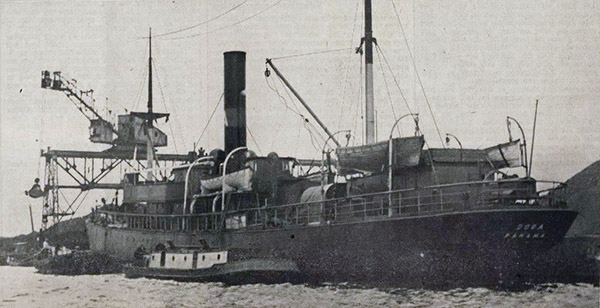
The Dora
Photo: Het Volk, July 14 1939
This page was originally based on Chaya Brasz's article "Dodenschip Dora; Een oude kolenboot redde honderden Joden ondanks Nederlandse tegenwerking" ("The "Death Ship" Dora: the coal ship that saved hundreds of Jews"), which has been condensed and edited for clarity. Additional information was gathered from several books and online articles listed in the reference section; from articles published in the contemporary press and finally, from the recollections of my mother and from organizers and passengers who sailed on the Dora.
Mossad LeAliyah Bet
Following Hitler's rise to power in 1933, the increasingly harsh anti-Jewish measures in Nazi Germany made the need for Jewish immigration more and more urgent. At the same time, it became increasingly difficult for refugees to obtain visas for any destination. As for Palestine, then under British mandate, Great Britain announced in late 1938 that it would reduce Jewish migration to Palestine to a total of 75,000 over the next 5 years.
In response to the newly enacted restrictions implemented by the British government with its "White Paper", a new branch of the Haganah, Mossad LeAliyah Bet, was created in late 1938, with the goal of organizing illegal immigration to Palestine.
An organization was quickly put in place in several European countries to support this effort, with the center of operations set in Paris. This organization had to raise funds, collect intelligence, acquire (i.e. charter) ships, transform and equip ships to transport large numbers of immigrants: install beds and other necessities, set up sophisticated radio systems, supply them with large quantities of food, water and fuel, hire crews, transport immigrants to ports of departure, arrange sailing permits, all of this while avoiding the suspicion of local authorities and evading detection by the British Navy.
In its first year of operations, Mossad LeAliyah Bet managed to launch 10 ships from Mediterranean and Black Sea ports and bring so-called "illegal" immigrants to the shores of Palestine despite the British embargo.
Several groups provided operational and logistical support through each stage. First were "guides" (madrichim), who accompanied the ships during the crossings. They were young people who had gained sailing experience on rowboats on the River Yarkon, and had to be ready to act as emergency captains whenever problems arose with the official crews, often veteran Greek seamen. One such sailor was Amiram Shochat, who would take part in the voyage of the Dora and was by then already a veteran of these illegal expeditions.
Another group consisted of members of Shai ("Sherut Yediot"), the Haganah Intelligence Service, who gathered information about the British police anti-immigration plans, often from Jews who worked in their offices, and supplied the Mossad with the routes to evade the British.
Another crucial group was the Haganah radio communication wing, with members operating on the ships, at disembarkation points, and at the Haganah center in Tel Aviv. With efficient transmitters and receivers installed on each ship sailing to Palestine, they were able to coordinate between ship and shore, allowing the vessels to receive precise information on British naval movements and dodge the coastal patrols. Temporary communication stations were also set up on the landing beaches to guide the ships.
Lastly, there were the several disembarkation crews who brought the refugees from ships to shore, then helped them fan out to various settlements, while armed groups were on the lookout for the British forces. Several Haganah units were involved in the landings. Disembarkation was handled by Palyam units with seagoing experience.
Generally, the ships approached as close as possible to shore, allowing those who knew how to swim to make their own way to shore. The others were carried in boats or on the backs of helpers. Palmach units guarded the beach, while Gadna (Youth Corps) and HIM (Guard Corps, composed of older Haganah members) patrolled the wider area, and dispersed the immigrants among different Jewish settlements. Since success depended on preventing discovery by the British, great importance was placed on how quickly the immigrants were swallowed up in the settlements. In many cases, the Haganah supplied them with the appropriate identity papers.
The Refugee Situation in the Netherlands
Since Hitler's takeover of power in Germany in 1933, the Netherlands had taken in approximately 15,000 Jewish refugees from Germany and Austria. After Kristallnacht at the end of 1938, the Dutch government allowed 150 chalutzim to enter the country, on condition that they would leave the country within a year. By that time, there were a little over 1,000 young people in Hachshara - agrarian training in preparation for emigration to Palestine - in the Netherlands. Gertrude van Tijn, the head of the Emigration Department of the Committee for Jewish Refugees, reported to the Joint (American Jewish Joint Distribution Committee, aka JDC) at the end of November that approximately 4,000 legal refugees had entered the Netherlands since Kristallnacht. By February 1939, she estimated that there were 23,000 German-Jewish refugees in the Netherlands, while the government put the number to 30,000.
Two organizations provided support to Jewish refugees from Germany: the Deventer Association ("Vereniging tot Vakopleiding van Palestina Pioniers": "The Association for Professional Training of Palestine Pioneers"), and the Committee for Jewish Refugees. They obtained entrance visas for young refugees, then placed them among Dutch farmers and in the Werkdorp ("work village") Nieuwesluis in Wieringer, Werkdorp Wieringermeer, where they received agricultural and professional training for immigration to Palestine.
Following the sudden influx of German refugees in Holland after Kristallnacht and the decision of the British Government to pressure the Greek Government to halt immigration to Palestine, the Haganah decided to create a new immigration route in Northern Europe. As early as December 1938 or January 1939, they started to discuss the possibility of shipping a group of 300 chalutzim from Holland, 150 from Belgium, and another 100 from France from a North European port.
Several agents of Mossad leAliyah Bet arrived from Palestine to Europe to organize "Operation North" (מבצע הצפון), the clandestine departure of German Jewish refugees from Holland. In charge of the operation was Gideon Ruffer (Gideon Raphael), in charge of logistics was Gustav Horn from Kibbutz Hazorea. From the central office of Mossad leAliyah Bet office in Paris, Shmarya Tzameret, a 23 year-old American-born member of Kibbutz Beit Hashita, was tasked with organizing the Dora trip. Other agents involved in the planning of the operation and purchase of the Dora included Ze'ev Shind, Yehuda Braginski, Amiram Shochat, and Zvi Spector, who would lead the Dora during the trip.
Copenhagen: June - July 1939
Mossad officials, led by Yehuda Braginski, spent several months looking for a suitable ship that could sail from the North Sea, through the Atlantic Ocean and across the Mediterranean up to Palestine with hundreds of passengers.
They eventually found a Greek family willing to embark on the adventure: Pierre and Constantin Atychides, two Greek brothers who had previous smuggling experience during the Spanish Civil War. They would purchase a ship (with Mossad money), equip it and sail it all the way to Palestine.
After lengthy negotiations, Gideon Ruffer and Shmarya Tzameret finally arranged the purchase of the SS Tjaldur in Copenhagen on June 21st, 1939.
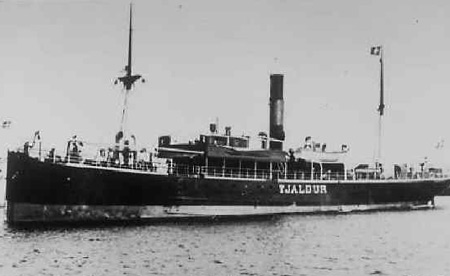
The Tjaldur
Built in 1898 in Glasgow under the name VEGA, then renamed Tjaldur in 1904, it was a relatively small steamer (584 gross tons, 199 feet by 30 feet, 11.5 knots) that had previously sailed between the ports of the Baltic Sea and the North Sea. Originally a passenger ship, it had later been converted into a merchant ship that transported various goods, including cattle. However, it still held a certificate to transport passengers and was deemed suitable for the operation as its mechanics were in good shape.
After the purchase, the ship was renamed the Dora and would sail under Panamanian flag. In Copenhagen, it was outfitted to transport passengers by adding 175 iron bunk beds on multiple levels, life jackets, a second kosher kitchen, lavatories, and showers. On the deck, a wooden room was constructed to accommodate a doctor, a nurse, and a small hospital. The engines were cleaned, and a sophisticated radio system was installed that would help communications with the Haganah headquarters.
During the outfitting the ship, disputes with the crew and tensions between the Dutch and the Palestinians emerged, posing a potential threat to the operation. At a critical juncture, Chaim Weizmann, the Zionist leader, had to intervene and restore peace among the organizers.
In July, following approximately three weeks of renovations and repairs, the Dora was finally ready and departed from Copenhagen, bound for Amsterdam.
Just as the Dora started to move, the captain's son, who was supposed to conduct the voyage on behalf of the ship's owners, tripped and broke his leg, so the Dora had to return to Copenhagen so he could be taken to a hospital. After the delay caused by this mishap, the Dora finally left Copenhagen, passing through the Kiel Canal, which was under Nazi control. .
As the Dora left, Tzameret and Costa took a train to Antwerp to hire additional crew and purchase more lifeboats. On his end, Gideon Ruffer announced that the pioneers in Amsterdam were ready to go. Once the Dora arrived in Amsterdam, the plan was to get more coal and food and be ready to leave in a few hours without being noticed.
In a closed meeting of Hechalutz members from the work village of Wieringermeer, seventy-three candidates had learned that they had been selected to leave via illegal aliyah and would sail in nine days. In preparation for their voyage, they had been moved to temporary accommodations in Beverwijk, Assendelft, and Heemskerk, small villages close to Amsterdam, where they were to remain in hiding until their departure.
The trip, first discussed in December 1938, and in planning for half a year, had been delayed for so long that Shmarya Tzameret had to reassure the Dutch Government that the chalutzim would soon leave Holland as planned.
In Antwerp, the situation was worse: 150 people who had crossed the Belgian border illegally had been there for more than six weeks. The police arrested them every day, after which they were released, because they promised they to leave the next day, as soon as the ship would enter the harbor. Around the same time, the Belgian government passed a law to the effect that illegal refugees had to be sent back.
My mother recalled that during her stay in Antwerp, she stayed with a group of young men and women in the apartment of a wealthy Jewish family who were away on vacation for the summer. One day, a neighbor alerted the police of the presence of illegal aliens in the building. The police came and arrested the young men, but unaware that there were four girls on the second floor, didn't find them, and they were not arrested. At the end of each day, the young men would be released against a promise that they would soon leave Belgium. The next day, still there, they would be arrested again. This continued until they finally got ready to board the Dora. The girls, not wanting any more problems with the police, left the house and went back to stay at the Hechalutz house.
David Cohen, the Chairman of the Refugee Committee, was kept in the dark about the plans for the Dora because he was known to disapprove illegal activities. Other members and associates of the Committee however, such as Gertrude van Tijn, were willing to cross the line into illegality, and would provide their help and support throughout the entire duration of the operation. Since funds from the Joint could not be used for "illegal" enterprises, Gertrude's Dutch associates fronted the £3,000 (approximately $240,000 in 2018) needed to cover expenses for the trip.
Amsterdam: July 13 - July 16
The Dora arrived in the Amsterdam harbor on Thursday July 13th. Gideon Ruffer went to the shipbroker on the Geldersekade canal to purchase the provisions needed for the trip. He took along with him Flip Cohen, a young Dutch pioneer who spoke Hebrew to be his translator.
Uri Kochba, emissary of Hechalutz, said:
"I was sent to the bakery, and had them bake special kosher bread that would stay good for a long time. We* ate that onboard until it became moldy. After that, we switched to biscuits."
Note: *the source for the quote must be incorrect. As far as I know, Uri Kochba did not board the Dora. He was arrested in the Netherlands in 1940. However, others have documented that the passengers did survive on biscuits and salty water towards the end of the trip.
This is when he met Amiram Shochat for the first time, one of the three people from the Haganah who had organized the trip of the Dora. Amiram warned him in Hebrew: "Don't talk to anyone in the crew". The Danish crew didn't know about the illegal nature of the trip, and were not supposed to know.
According to Yekutiel Fekete, the radio operator, the crew was composed as follows: The owner and captain of the ship was a 70-year-old Greek who hated the English and claimed "The British Empire will collapse and the English will go back to being fishermen and coal miners. This will be their fate.". Maybe his hatred for the British was part of the reason he agreed to serve on the Dora. The first officer was a younger Greek driven by greed, who had brought his wife on a voyage. The second officer was named Danny, a hardworking man who did all the work and treated us and the immigrants well. The third and fourth officers were Amiram Shochat from Tel Aviv, for whom this was the third voyage, and Zvi Spector from Jerusalem, who was on his first mission. The official wireless was a Spanish exile from the Civil War, while Yekutiel Fekete was the wireless operator in charge of connecting with the Haganah.
Everything seemed to be going well until emissaries from the Refugee Committee came to inspect the ship. Gertrude van Tijn and one of her colleagues from the Committee, Siegfried Kramarsky, a German-Jewish banker residing in the Netherlands who was financing part of the trip, came to satisfy themselves that the Dora was fit for the voyage. Siegfried Kramarsky, along with Salo (Salomon) Jakob Flörsheim - another banker and philanthropist - and a few other members of the Refugee Committee, had paid the 115,000 guilders (approximately $1.1 million in 2018) the trip would cost, and felt responsible for the success and safety of the trip.
They arrived just as coal was being loaded, so the ship was covered in a cloud of soot. They had expected a passenger ship; when they saw the decrepit hulk of the Dora, they were shocked. They questioned aloud whether the Dora was capable of carrying a large number of passengers through the Atlantic, the Mediterranean and to Palestine and considered withdrawing their support, then refused to let the chalutzim board the ship.
The members of the Refugee Committee were mostly wealthy, assimilated Jews who represented the Jewish Community to the government. Their idea of what a ship should look like didn't fit with the reality of illegal immigration. They were also upset by all the delays so far and concerned by the issues these delays would cause with the Dutch Government, as they had given their word that the chalutzim would be leaving without delay. They had some contempt for "Ostjuden", the people who had organized the trip, saying "Ostjuden don't keep their word". They also suspected that the paperwork for the ship might be fakes acquired on the black market, and blamed the Haganah for the poor condition of the ship.
Shmarya Tzameret was astonished by what he heard from these assimilated, law-abiding Jews who, with their haughty attitude, made decisions regarding the chalutzim. In his report to the Mossad LeAliyah Bet, he noted that these people were so removed from the problems of the Jewish people. After the remark about the OstJuden, he only spoke English.
He spoke to Gertrude van Tijn who supported the illegal scheme and whom he saw as a woman of great intelligence, and asked her to try to convince Kramarsky. Tzameret explained to her why the trip had been delayed so many times, told her that the Dora was a solid ship which had passed the inspection by the official authorities, and that the insurance papers were in order. In the end, the Refugee Committee gave in and agreed to let the trip continue.
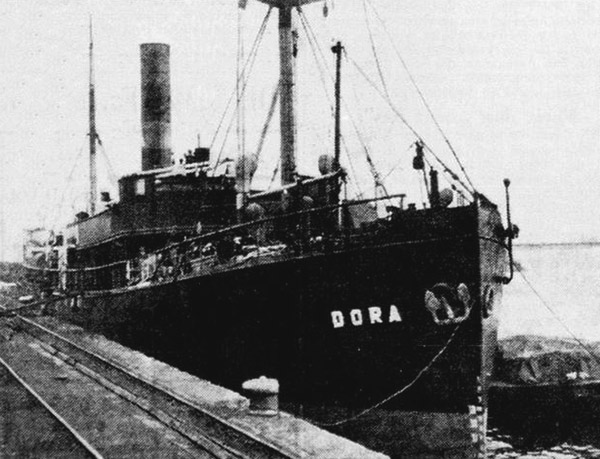
The Dora in Amsterdam.
Photo: De Telegraph July 15, 1939
Read All About It!
Soon after, new complications arose. The dock workers who had brought the coal aboard the Dora had noticed the bunk beds in the holds, and had alerted the editors of the Communist Party's newspaper about the "scandalous" conditions aboard that "Death Ship". The next day, the Volksdagblad ("the People's Daily") published a long article accusing the Dutch government of forcing Jews to leave in unsafe condition aboard a "wreck of a ship" with "slave trade quarters" sail, which, they were sure, would drown with the hundreds of refugees aboard. Other newspapers started to write about the "Ship of the Dead". In the Amsterdam harbor, photographers aboard small boats circled around the Dora.
The Dutch government's official position was that it knew nothing about the preparations regarding the Dora's departure, and clearly wanted to keep it that way. Feeling overwhelmed with the sudden influx of Jewish refugees from Germany, it was willing to close its eyes on any irregularities to facilitate the removal of at least some of them. Ruffer met Hendrik van Boeijen, the Minister of the Interior, who approved the operation and ensured that officials turned a blind eye to what was happening.
As a result of the reports in the press, the harbormaster received the order to inspect the Dora. Shmarya Tzameret met with the harbormaster and revealed the reason for the trip, and after the Dora had gone through a new inspection by the Dutch authorities, the harbormaster gave his authorization to sail, but made a list of minor improvements needed before the Dora could leave.
To Gertrude's relief, Dutch marine inspectors visited the ship and pronounced the Dora seaworthy, on condition that some minor repairs be made and that additional lifeboats be brought aboard in Antwerp.
Since there were only 350 beds and 300 people were supposed to board from Amsterdam, Tzameret told the harbormaster that only 50 more people would be boarding from Antwerp.
The Dutch government declared the following day that they weren't expelling any refugees, and that they would all leave from their own free will. The Communist Volksdagblad nevertheless denounced the apparent collusion between the authorities and the Refugee Committee in sending a "second St Louis" on a "death journey".
With the boat deemed seaworthy by the Amsterdam naval authorities, preparations for embarking the hundreds of chalutzim dispersed over various villages and communities now went under way.
Yaakov (Walter) Oppenheimer, a pioneer with the Mizrachi Kibbutz Dat veEretz (Religious Zionist), recalled:
"The Dutch immigration police wanted to get rid of us, but they were afraid of the publicity. [...] In 1939, all of a sudden we were brought to Heemskerk (15 miles from Amsterdam), where we had to wait for a couple of weeks. On July 14, I was brought to the house of Dr. Pinkhof in Amsterdam. I was very devout and couldn't travel on Shabbat. His house wasn't far from the harbor, so on Saturday, they came and picked me up and took me straight to the Dora."
"It was a small ship, full of people, but we never felt unsafe on it. The only danger we feared would come from the British."
Flip Cohen was with another group of chalutzim in Beverwijk, a town about 15 miles from Amsterdam. He remembered:
On Saturday, I ordered some taxis. We went with the whole group. That evening, I was home for a just little while. My mother said, "Are you leaving today?" We said: "See you in Eretz Israel". I took my backpack and left.
Apart from my younger brother Samuel, I never saw them again. I came back to the Netherlands in 1945 as a soldier with the Jewish Brigade. I found Samuel in the Portuguese Israelite Hospital. He was just back from Bergen Belsen. All the others had been murdered.
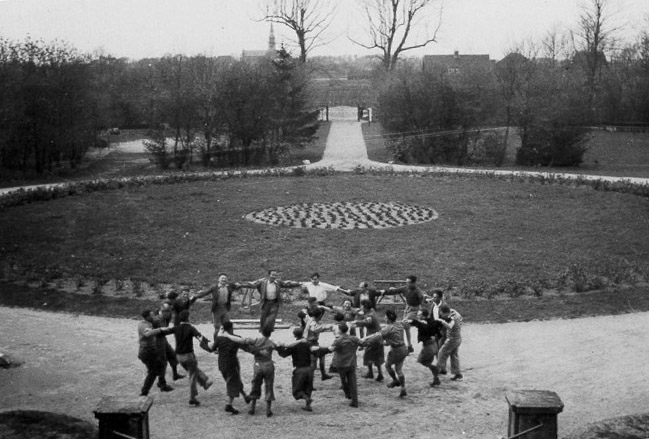
Dutch chalutzim dancing the "hora" in the park of the Assumburg Castle in Heemskerk which was then used as a youth hostel, before sailing to Mandate Palestine aboard the Dora, 1939.
Courtesy of The Ghetto Fighters' House Museum, Israel.
The chalutzim were shuttled with busses all day Saturday from their hiding places to the harborside Lloyd hotel, which served as a refugee center, and was surrounded by the police.
Raphael Kochavi wrote:
After finally giving the signal to move, we boarded the buses that were waiting for us at the farm entrances. It was July 15, 1939.
At night, we arrived at the spacious customs hall at the port. Surrounded by Dutch security personnel, all the illegal immigrants gathered together.
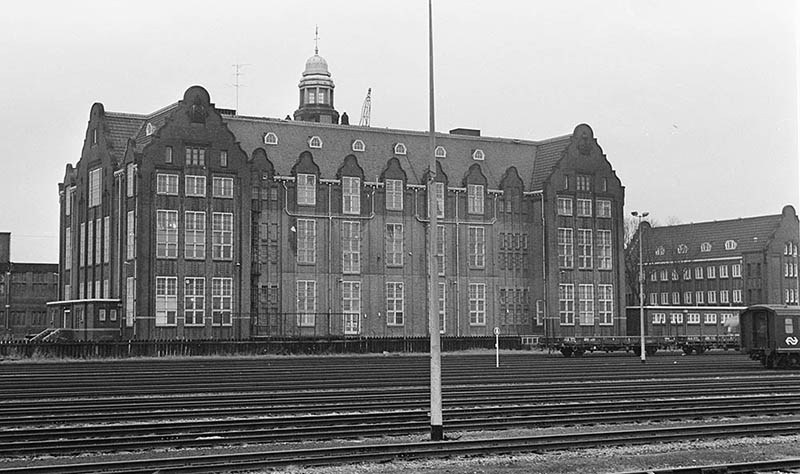
Lloyd Hotel, Amsterdam.
Photo: Utrechts Volksblad 18.07.1939
The leaders of the Jewish Refugee Committee and organizers of the trip, including Gertrude van Tijn, Siegfried Kramarsky, Salomon Flörsheim and Ru Cohen came to send off the refugees and wish them good luck. After fiery speeches, a Hatikvah concluded the ceremony.
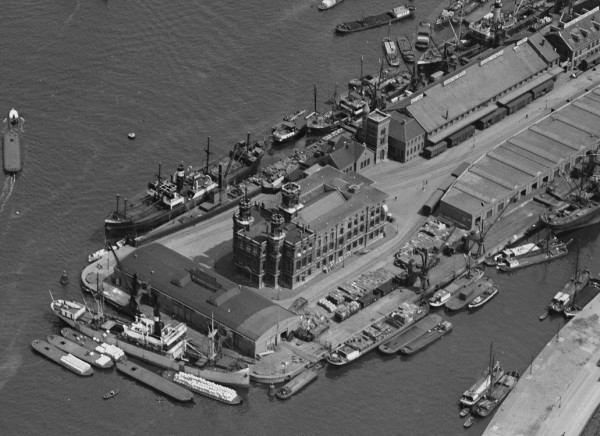
The Handelskade
Also present were the heads of the immigration police from The Hague and from Amsterdam who had come to control the boarding with 35 civil servants and policemen. All passengers under the age of 21 had to sign a form attesting they were embarking of their own free will. Behind a police cordon, the chalutzim, in groups of ten or twenty, boarded small launches that took them to the Dora, waiting a hundred yards from the quay. .
Kochavi remembers differently: instead of launches, he describes the immigrants boarding the Dora directly from the pier:
In order to go in the belly of the ship, we had to go down a slippery sloping ramp onto a narrow deck. We were instructed in Hebrew to move on to the cargo hold which was illuminated by dim lights.
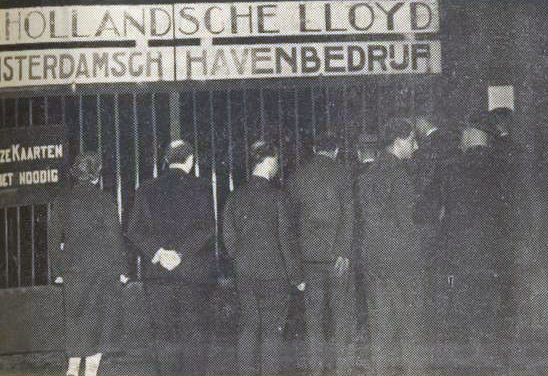
The Dora in Amsterdam.
"Authorities, shipping inspectors and others go on board for a final inspection before the departure signal."
Photo: Het Volk, July 17, 1939
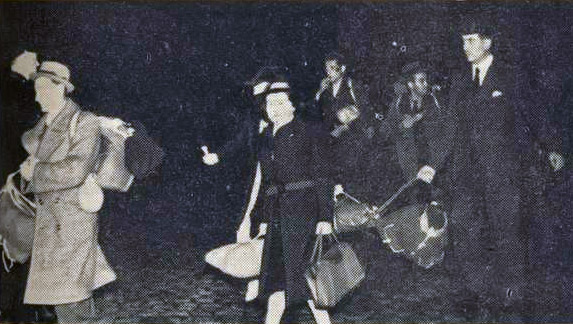
"In groups of ten or twenty, the refugees go onboard, escorted by policemen."
Photo: Het Volk, July 17, 1939
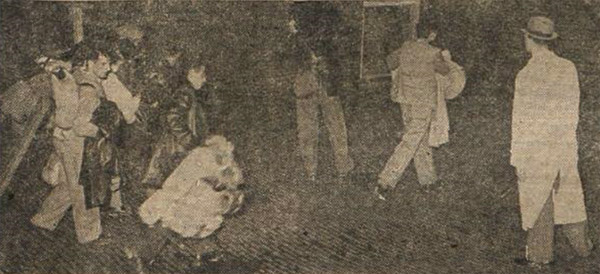
Passengers boarding The Dora
Photo: Photo: De Sumatra Post, 24 July 1939
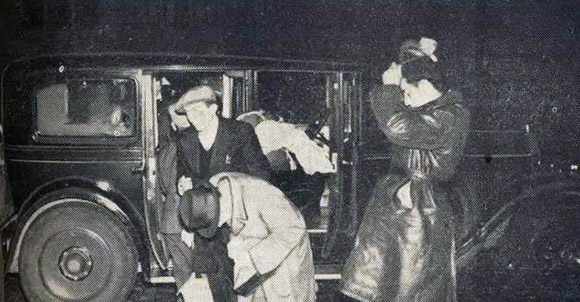
"The Dora did not leave until 5 o'clock at night, three hours later than planned. They had been waiting for seven refugees from Enschede who were coming by car and had gotten lost."
These were the seven members of the Enschede Hachscharah Agudas Yisroel: Rosa Appel, Elie Daube, Heinemann Gutmann, Issy Hirsch, Saul Lampelz, Bernhard Rosen, and Rubin Rottenberg.
Photo: Het Volk, July 17, 1939
At dusk, the Dora was moved to the Handelskade (the pier). The police cordoned off the pier to keep the press away, but the authorities were afraid that the Communists would come to demonstrate. Everybody knew what was going on, and when a young woman without papers managed to move through the police cordon, they just let her go aboard without any trouble. A high degree of complicity between the authorities and the organizers was evident. As Zvi Spector, the Haganah chief of the operation, was about to board, the commanding officer of the Dutch immigration police raised a glass and proposed three toasts — to Queen Wilhelmina, to the success of the voyage, and to an independent Jewish state.
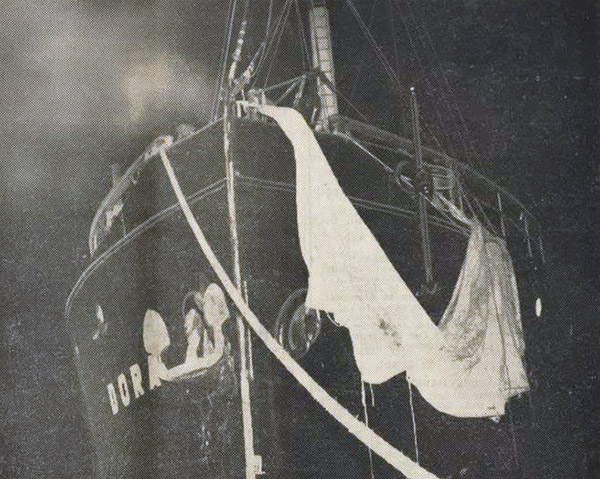
The Dora in Amsterdam.
"The Dora crew hastened to cover the name of the ship with tarpaulin, apparently to prevent anyone knowing which ship was moving across the IJ through the nocturnal darkness."
Photo: Het Volk July 17, 1939
In the early hours of Sunday, July 16, 1939, the Dora sailed from Amsterdam with about three hundred passengers. Most were Jewish refugees from Germany, including about 75 students from Wieringen. Some were Dutch Zionists who had undergone agricultural training in other Hachsharot. All were adults, mainly young men. One of the forty or so women was in her sixth month of pregnancy.
Gertrude bade an emotional farewell to the passengers and to Tzameret, who was to travel by train to meet the ship in Antwerp. The goodbyes between Tzameret and the Refugee Committee on the other hand were not particularly cordial. Kramarsky announced that he planned to go to Antwerp to ensure that the lifeboats requested by the Amsterdam harbormaster were brought on board, and that too many passengers wouldn't go aboard. Tzameret and Ruffer tried to tell him this wasn't necessary, but to no avail.
Antwerp: July 17
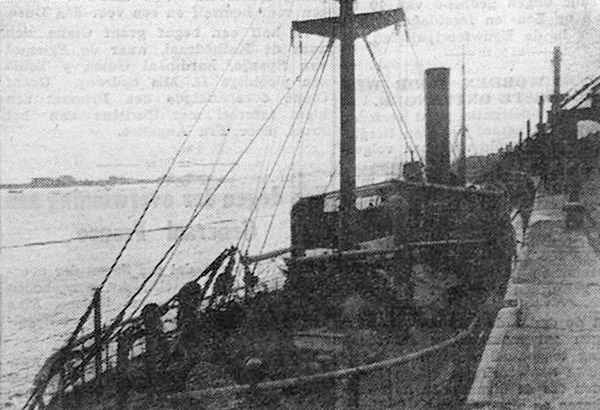
The Dora in Antwerp.
Photo: Het Handelsblad, 18 July 1939.
The Dora arrived in Antwerp on July 17th. Shmarya Tzameret wrote in his report: "I spoke to a high-level Dutch civil servant who said that he wasn't interested in the plans of the Haganah, and that the only concern of the government was that the ship would disappear with the refugees as soon as possible." Tzameret had ordered that the passengers from Antwerp should board the Dora as soon as possible, but didn't tell Kramarsky, and continued the negotiations with people from the Refugee Committee. When Kramarsky arrived in Antwerp, he was furious to find out that a hundred and fifty people planned to board the ship, instead of the fifty that had been previously agreed upon. He again threatened to withdraw financial support.
Kramarsky later met with Tzameret in Antwerp, and angrily argued with him about the condition of the Dora and that there weren't enough beds onboard. Tzameret explained that beds were put side to side, two by two, so they could fit three people. He added that the refugees who were in Belgium illegally had no other option but to board the ship and leave under any conditions: otherwise, they would be sent back to concentration camps in Germany. But the Refugee Committee had given its word to the Dutch government that no more than fifty additional people would board the Dora, and threatened to take 100 chalutzim off in Antwerp and send them back to the Netherlands. Shmarya Tzameret, to Kramarsky's fury, boarded all 170 new passengers regardless.
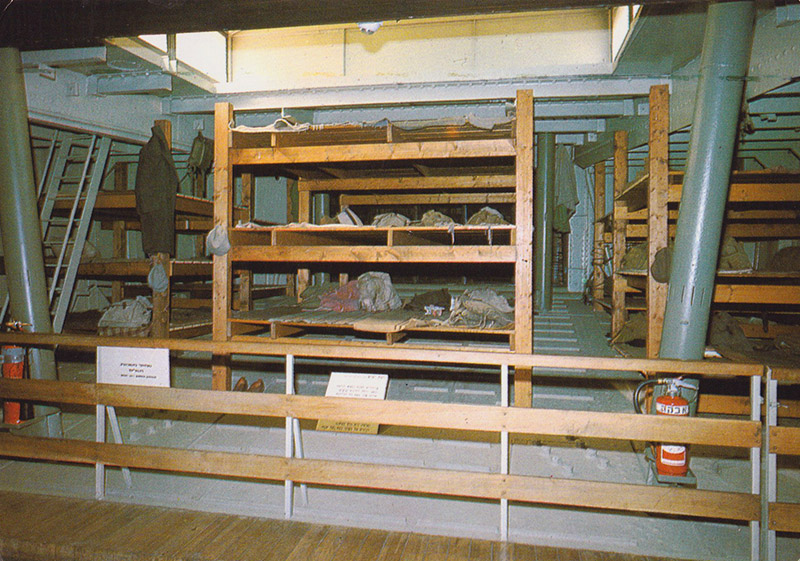
Bunk beds in an Aliyah Bet ship. (Postcard, 1973-1974)
No photos of the sleeping quarters of the Dora exist. In the early 1970's, our family visited the Ha'apala museum in Haifa and my mother said this installation and the bunk beds looked just like what it was like in the Dora.
Postcard from
Siegfried Kramarsky went to the harbormaster and demanded that one hundred people be taken off the ship. The harbormaster, a devout Christian who saw the return of the Jewish people to the Promised Land as a Biblical fulfillment, became a spokesman for the chalutzim. He told Kramarsky not to worry, that it wasn't such an imposition if the refugees suffered a little for a couple of weeks if it meant that they would reach the coast of the Promised Land. Kramarsky then threatened to call the Dutch Government and ask them to take diplomatic action. This angered the harbormaster who refused to talk to the Dutchman any further. As last resort, Kramarsky went to the ship and tried to convince the chalutzim to not go on the trip, but the passengers explained that they were happy with the situation on the ship, so he finally gave up and drove away, seething.
My mother recalled seeing the Dora for the first time: When the chalutzim in her group saw the Dora in the Antwerp harbor, they said the ship was too small for so many people, and not suitable for such a long trip. She replied ("naive as I was" she said in retrospect): "Of course! This is just a small boat which will take us to the real ship, which must be somewhere on the high seas. They don't want to bring the real ship in the harbor because it would give it away..." But she was wrong. That "little boat" was in fact the very ship that would take her and about 480 others to Palestine.
In the meantime, unannounced, the Belgian Security Agency had sent a tugboat which started to move the Dora to Vlissingen, and the Dora left Antwerp on July 17th.
Vlissingen: July 18 - July 19
The Dora was now moored on the waterways of Vlissingen, where it remained for two days.
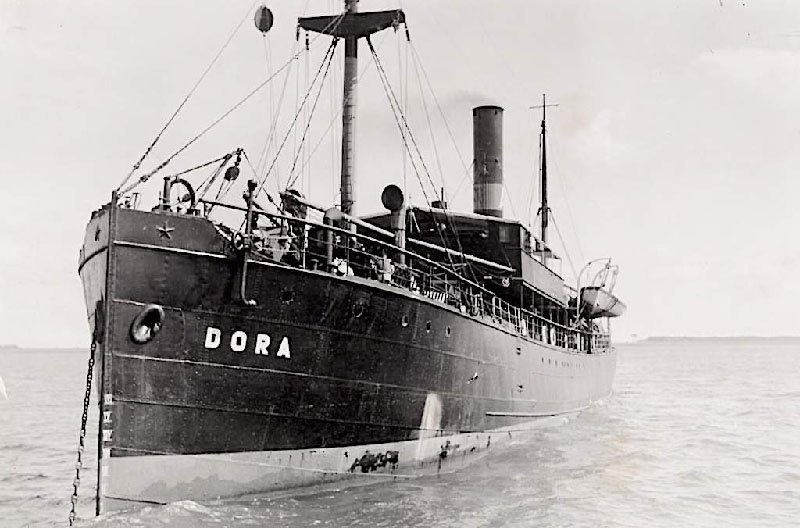
The Dora, anchored off the waterways of Vlissingen. Originally published on 19 July 1939 in De Maasbode Van Woensdag.
New problems arose: Kosta was demanding more money for the trip, one of the engine mechanics had missed the ship, and a newly hired Belgian radio operator didn't show up after having found what the actual goal of the trip was.
In the meantime, the Haganah in Paris decided that the Dora would not pick up the hundred refugees in Le Havre in France after all because there had already been too many delays, putting the entire expedition at risk. Yekutiel Fekete mentions in his recollections of the trip another reason: the ship was already full and there was no room for any more passengers.
Kosta and Tzameret found a new radio operator, a Spanish Communist who used to smuggle weapons to Spain during the Civil War and was now stranded in Antwerp without papers after his ship had left without him. Kosta, the Spaniard and the mechanics took a taxi to Vlissingen, but were turned away: the Greek didn't have a visa, and the Spaniard didn't have a passport. The four of them would have to leave Antwerp the next morning on a motorboat for Vlissingen.
It was now July 18th and Tzameret wanted the Dora to leave as soon as possible. He was concerned that the Dutch press in Vlissingen and the Refugee Committee would find out that the Dora was back in Dutch waters, and that the Dutch government might decide under public pressure to prevent the departure because there were too many people aboard.
At 5 a.m., Tzameret observed the Dora from the Vlissingen dike through his binoculars. There were fishermen and a little boy on the dike. The kid said: "You see the ship? That's a 'death ship', a ship full of Jewish refugees from Germany that will sink, for sure." It was as if everybody in the Netherlands knew about the Dora, even the children.
Meanwhile, more articles appeared in the local press about the "mysterious refugee ship". While the Dora was anchored off the coast of Vlissingen, a journalist from the Daily Herald had come aboard. He wrote that the passengers slept on the deck on straw mats, and had told him they were going to Bangkok, or Siam. The news drew the attention of the British government, and the British representative Nevile Bland made inquiries at the Foreign office in the Netherlands, pointing out that immigration to Palestine was illegal. The Foreign Office responded that the ship had given as its destination Siam, and that they weren't aware of any another destination.
The Algemeen Handelsblad reported the departure of the Dora with 500 Jewish passengers. The destination of the ship was said to be Bangkok, yet the reporter didn't seem to believe that this was the real destination.
The article described the accommodations for the passengers:
"The passengers were hanging over the railing, talking to each other, and others were busy working. However, no answer was given to the questions we asked. The whole thing made a rather sad impression."
"As there seemed to be no room for all passengers, many had to be satisfied with a berth in the straw on the fore or afterdeck. Large sails were stretched over these decks."
The same day, the Haagsche Courant wrote:
"Little credence is given to the claim that the ship will go to Siam, and a veil of mystery surrounds the ship."
Surprisingly, despite the secret nature of the Dora's voyage, a reporter from the Haagsche Courant was allowed onboard. He wrote:
"The crew was busy trying the lifeboats with the assistance from the passengers. However, it was very primitive and it took a lot of time and effort to lower a boat, and the boat was not even manned. Moreover, the unpainted lifeboats don’t give a reassuring impression."
What the reporter probably witnessed was the passengers practicing lowering the lifeboats to disembark on the shores of Palestine. Since the Dora would land not in a harbor but on a beach, the passengers would have to transfer to the lifeboats to reach the land.
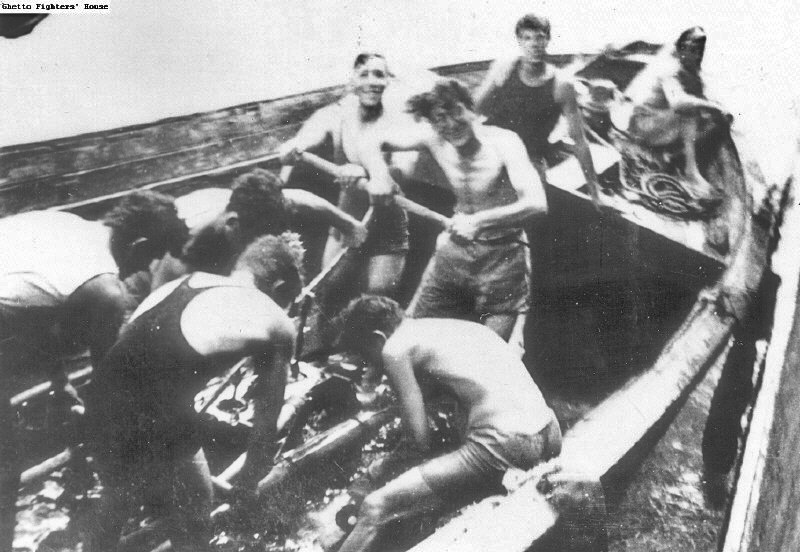
Illegal immigrants, members of the Hechalutz aboard a lifeboat. August 1939
Photo: Shimon Mahler, 1939 (c) The Ghetto Fighters' House Museum.
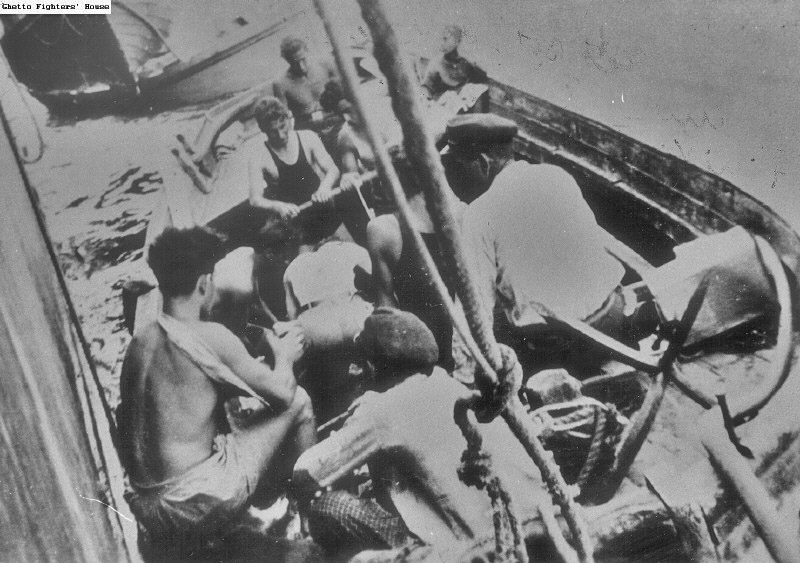
Illegal immigrants, members of the Hechalutz aboard a lifeboat. August 1939.
Photo: Shimon Mahler, 1939 (c) The Ghetto Fighters' House Museum.
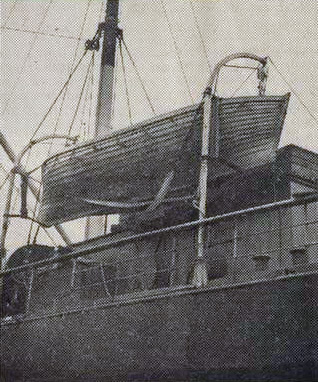
Lifeboat
Photo: Het Volk, 14 July 1939
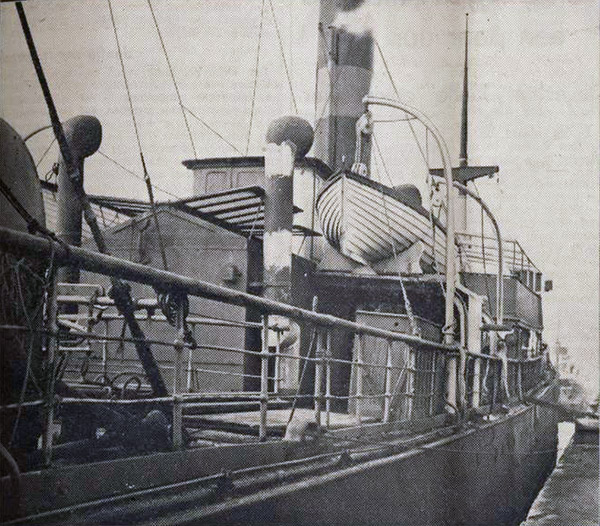
The Dora with one of its four lifeboats.
Photo: Het Volk, 14 July 1939
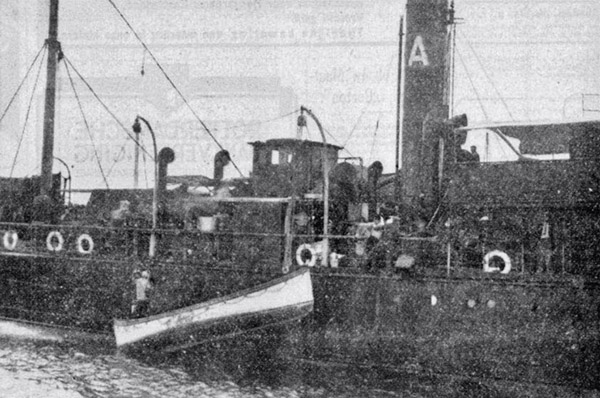
The Dora with one of its four lifeboats
Photo: De Telegraaf, 19 July 1939
Cows on the deck of the Dora?!
The most surprising fact mentioned in this article is the presence of cattle on the Dora:
"On the front and back decks, the Jewish refugees sat under large sails. On the forepart were some cows, next to which men and women lived in the straw."
The same information was also picked up in "The Scotsman" on July 19: "From the shore hundreds of men and women, and also cattle, could be seen on deck".
The same day, the Volksdagblad (the Communist People's Daily) wrote that the ship was not seaworthy and that the government of the Netherlands should grant the refugees asylum. The journalist believed that the Dora was anchored in Vlissingen because of the rough weather from the previous days - confirmation, according to him, that the Dora was ill-equipped to take to the sea. With a dramatic tone, he predicted that once the "wreck" of the Dora moved into the open sea, it would turn into a real "death ship", wandering from port to port, without a final destination. Insisting that the Dora was too small to accommodate 420 passengers - for proof the dozens of refugees forced to sleep on deck on straw - the article ended with a call to action:
"The public opinion in the country must be shaken... It is a shame that this ship left the Netherlands. The only solution is: right of asylum in the Netherlands... or the clear guarantee that these unfortunates can find accommodation in another country..."
Another newspaper, the Zaans Volksblad, declared that "the veil of mystery around the refugee ship 'Dora' is getting thicker", and suspected that the ship might be waiting for more clement weather before taking to the sea. It added that the passengers, who were not allowed to disembark, were lying on straw on the deck, because "on a ship of such dimensions, it is not possible to properly accommodate 400 people".
It added that "In the afternoon there was a boat drill on deck, which is somewhat comical, taking into account how absolutely inadequate the rescue material is. The women were washing and trying to create some order in the chaos on board, by sweeping and removing the worst dirt."
After having spent almost two days anchored in Vlissingen for no apparent reason, the Utrechts Volksblad explained that the delay had been caused by the captain waiting for the arrival of a crew member whom he could not miss and who could only get on board today. What that journalist saw from the shore with binoculars was "not an encouraging spectacle", and that "the hundreds [...] now on this ship, are compressed on a much too small space."
Following the reports in the press, Louis de Visser, Chairman of the House of Commons and a member of the Communist Party, raised questions at the end of July for Prof. Gerbrandy, the Minister of Justice. He asked him if he had forced the Jewish Committee to take such action, argued that the refugees shouldn't leave if they couldn't secure a destination, and that they should be allowed back to the Netherlands if needed. Minister Gerbrandy denied having had any knowledge of the Dora. In the meantime, the government representative for refugees, B.G.A. (Bernardus Gerhardus Albertus) Smeets, unhappy about the conditions on the Dora, sent a letter to the Justice Ministry, dated July 22, 1939, in which he accused the Jewish Committee of "irresponsible behavior":
"What I understand makes me ask if the government shouldn't have just prevented the ship from leaving. It was too crowded. Refugees are sleeping under sails on the upper deck, on straw. One storm and they will be gone. There isn't enough safety equipment, four little boats for 20 people each. In Amsterdam the ship was already overloaded, and in Antwerp another 100 refugees were added. [...] You should realize that illegal immigration with ships has already been causing much trouble everywhere. Ships that aren't allowed into harbors, that are at sea for months, that have the plague on board - for example the odyssey with the St Louis, which was actually a comfortable ship, while the Dora..."
On July 20th, in London, the "Daily Herald" published an article with two photos of the Dora. The Herald's reporter described having gone on board the Dora and reported:
"... Her holds packed with human cargo, she was a passenger ship carrying 500 Jewish refugees to a destination that nobody seems to know... The Greek captain was silent about the ships' destination. He said he had "sealed orders".
The harbormaster said "We accept no responsibility for that ramshackle ship. She got her certificate of seaworthiness in Amsterdam - so good luck to her."
Here is what he saw:
"The Dora has two lifeboats on each side, each capable of taking 15 passengers. Should she meet disaster, the poor state the lifeboats are in leaves little hope of even 60 escaping in them. It would not take a hurricane to sink the Dora either. Her portholes are only secured with old rubber bands."
None of the passengers seems to mind the dangers and discomforts. "What does it matter," one of them said to me, "as long as we find freedom again?" If the land to which they are going refuses to take them, they will have to return to their port of embarkation."
"Where are we going to?" somebody answered when I questioned him. "To Siam." "To Bangkok." said another.
Passengers later recalled the lack of space on the Dora. My mother said that they had slept on wooden planks, three people lying head to foot, with about 30cm (12") per person, while Gershon Jonas remembered that "the ship was very crowded, we slept on the floor."
On the way to Palestine: July 19 - August 12
On Wednesday, July 19, at around 11:15 a.m., the Dora left Vlissingen and at long last began its voyage to Palestine. According to Gertrude van Tijn, the ship was "overloaded, ill-equipped, not very well provisioned", but was finally on its way, starting its four-week voyage across the English Channel, the Atlantic and then the Mediterranean, where it would have to avoid the British blockade to unload its human cargo on the shores of Palestine.
The ship was manned by a multinational crew, composed mainly of Greeks and Danes. Officially, the chief captain was the elder Arteshides, however the officer who would in fact in charge during this voyage was a Danish captain. The rest of the crew was from France, Algeria, as well as one Jewish immigrant from Russia who was a waiter in the officers' dinning room. The radio operator was a Spaniard, and the doctor on board from among the passengers turned out to be a morphine addict.
Three Haganah members went along: the ship manager, Tzvi Spector (23), the emergency captain, Amiram Shohat (23), and in charge of the radio connection with the Haganah HQ, Yekutiel Fekete (24).
The passsengers were organized according to their group affiliations, with leaders for each group.
According to Regina Merkel, there were two kitchens: one kosher and one non-kosher.
The following day, the Dora was spotted sailing past the Isle of Wight in the English Channel, as reported by the "Lloyds List and Shipping Gazette".
The Dora then entered the Atlantic Ocean and sailed southward, towards the Gulf of Biscay. A region known for rough seas, fierce weather and high waves, the Dora experienced violent storms during which many of its passengers became sea-sick.
The Dora continued, maintaining eye contact with the coasts of Spain and Portugal. Raphael Kochavi recalled "At night, Lisbon lights twinkled in the distance". Around that time, he also remembered sighting a ship flying the swastika flag.
On July 29th, the Dora entered the Mediterranean Sea and crossed the Strait of Gibraltar. The Lloyd observation station, tasked with watching Gibraltar, reported its entry to the Palestine C.I.D (Criminal Investigation Department) and the British ordered the ship to identify itself. At the first signs of danger, the Greek Captain would send the refugees below deck into the hold of the ship, lest they be seen by British lookouts. The Greek declared it was a Panamanian ship on its way to Siam. The British accepted this explanation because ships with illegal immigrants never came through the Strait of Gibraltar, instead came from the French Riviera, the Italian Coast, or the Coast of the Black Adriatic Sea.
The Dora then passed along the shores of Algiers and Tunisia which, as Yekutiel Fekete recalled, "shone in full magic under the full moon", then sailed on from there between Sicily and Malta, and on towards the island of Crete.
The Dora then went past the Suez Canal, and sailed on towards Turkey.
Turkey
Yekutiel Fekete wrote:
"The journey is getting longer. The wireless connection to Eretz Israel has not yet been established. There is a shortage of food and water. It's hot, very hot. It's impossible to stay in the belly of the ship and everyone is huddled on the decks and sleeps there. Impossible. No patience. The shortage of water and food is worsening. The decision was made to anchor in a small port on the coast of Turkey and stock up on water and food. Coal is also needed, but not available."
Gershon Jonas: "There was a leak in the water pipes and no more food. [...] At one point, we drank only boiled salt water mixed with tea and ate only biscuits."
The Dora reached the southern coast of Turkey. It was now full moon, which made a secret landing in Palestine impossible anyway. The Dora radioed the Haganah in Palestine, and the crew was ordered to drop anchor off the Turkish coast at Finike* and wait until the new moon. (* Others mention Antalya; Hillel Yarkoni mentions the port of Mersin. Maybe the Dora made several stops in Turkey.)
Hillel Yarknoni wrote: "The ship entered the port of Mersin in Turkey to get some supplies, mainly water and food."
The Dora would spend approximately one week in Turkey, waiting for the appropriate conditions to attempt the final leg of the trip. The Turkish police paid a visit to the Dora and declared that passengers were not allowed to disembark. Hillel Yarkoni wrote: "Under the threat of guns, none of the people onboard were permitted to leave the ship.".
My mother recalled that the local Jewish community asked them to let some men come ashore, so they could have a minyan, but the group leaders refused to let anyone get off the boat.
The police did allow a boat to bring drinking water and watermelons to the Dora. Fekete recalled: "Food, water and especially plenty of watermelons were purchased".
My mother recalled that one day, locals brought water and watermelons on small boats. She noticed them standing with their bare feet in the water being distributed to the ship, so she stayed away from it. She recalled that they had been drinking slightly salty water for the entire trip, so everyone rushed to drink the fresh water. Later, those who had drunk the water all got sick. My mother, on the other hand, had eaten so much watermelon that she declared she could never have it again after.
The exact sequence of the next events is somewhat confusing as recollections about the final part of the trip vary.
According to Yekutiel Fekete, the ship then left Turkey and sailed for a day or two. As the Dora left the bay, it crossed path with the Tiger Hill, another illegal immigrant ship carrying over 1400 refugees:
"The illegal immigrants on board both ships are huddled on the side facing the other ship. The ships lean sideways at a dangerous angle, passing next to each other. A spontaneous rendition of the 'Hatikvah' bursts from the mouths of the immigrants."
According to Yekutiel Fekete, the original plan had been to use a smaller ship to bring the passengers to the shore while the Dora would safely return to the high sea, reducing the risk of the expensive ship being captured by the British. By now, the wireless connection with the Haganah had been established and brought the news that the small ship was not available after all. The Haganah crew on board discussed with the shipowner how to proceed with a direct landing of the illegal immigrants to shore, when and where to sail to arrive on a dark night without a moon, while waiting for instructions from the Haganah.
Rebellion on the Dora
Soon after the Dora resumed sailing, a rebellion broke out and the Dora stopped moving. The sailors, armed with kitchen knives, demanded additional payment, because the trip taken longer than the two weeks originally agreed upon. In addition, the new plan calling for the Dora to land the passengers directly on the coast meant added risk of being seized by the British and extended the duration of the voyage even further.
The rebellion ended quickly, although explanation on how it was resolved varies. According to Yekutiel Fekete, negotiations and passengers collecting money resolved the issue. Hillel Yarkoni simply noted that "the Danish captain's calm helped restore order", without mentioning money changing hands, while my mother remembered that a show of force on the part of the Haganah had put an end to the rebellion.
Gershon Jonas: "In Turkey, the Greek Captain got cold feet. He thought the British would capture his ship, or that he would be arrested. We had been at sea for two weeks, and another week in Turkey when the Greek sailors said, 'We only got paid for two weeks, and we’ve been three weeks on the way. We won't continue until we get more money.' Four hundred dollars was collected from the Jewish passengers."
My mother remembered the rebellion being brief. She recalled that a few Haganah men had walked around with their guns showing, and that it had been enough to end the rebellion and restore calm within the crew. She didn't mention money having been collected by passengers. In her case, anyway, she would have had nothing to contribute, having left Germany with "nothing more than a backpack with a blanket and a pair of shoes".
Just to be safe, the first captain, who had joined the rebellion, was locked up with his wife for the rest of the trip.
Finally, on August 11, 1939, the Dora received the signal that the coast was clear and that they could attempt to land. To evade detection and look inconspicuous like any dilapidated cargo ship, all passengers were sent down to the belly of the ship and the deck portholes closed.
Soon after, a new danger arose. About 80 kilometers south of Cyprus, an aircraft carrier accompanied by destroyers appeared. A destroyer approached the Dora, illuminating it with its spotlights. Asked to identify itself and its destination, the Dora replied it was just a regular cargo ship headed to a Lebanese port.
Others described the event differently: "A British warship appeared 300 meters away, but the warship left soon after without having detected the Dora. Looking southward in the darkness of the night, the olim could see the lights from Tel Aviv, while the searchlights of the police boat almost touched the ship. Everyone on board was quiet."
The Landing - August 12th
The following day the Dora finally arrived near Eretz Israel. Sailing in the evening along the coast, it adjusted its speed to reach the designated landing beach by nightfall.
The landing had been set to take place on the beach of Shefayim, a kibbutz about 15 kms north of Tel Aviv. The location had been chosen for being both approachable, close to a Jewish settlement and far from British military and police installations.
The Haganah was in charge of disembarkation, and the man responsible on behalf of the Mossad was David (Davidka) Nameri, a kibbutznik from Ashdot Ya'akov.
Mordechai Naor describes the landing of another ship, the Poseidon, in 1938. I assume the process was similar for the landing of the Dora and helps convey how much effort and coordination was required to ensure the success of the final phase of the trip:
On the shore, several groups from the Haganah were gathered to assist with the landing of the passengers:
Teams of rowers to transfer the immigrants to shore;
A "water-team" - to assist them from the boats to the beach;
Guides - to bring them to a rendezvous;
A communication team between the shore and the Haganah center in Tel Aviv;
A group to transport the immigrants to the different settlements, and
A first aid unit.In addition, there also was an armed patrol, illegally armed, to warn of any police activity and prevent it, if necessary.
All night long its passengers were brought ashore and quickly dispersed to adjacent settlements.
Mordechai Naor later details the disembarking of the Artemisia, a small (less than 100 passengers) early illegal vessel (1937). Again, I assume a similar procedure was in place for the Dora, although at a larger scale.
That entire day was taken up with meticulous last-minute preparations for debarkation. The passengers were split up into groups of ten, each group having as its leader one of its members. Men were placed alongside the ladders to supervise the descent. Lifebelts were assembled in one spot in the event there might be a need for them. The boats were checked last of all. Everything was ready for a smooth debarkation. A few hours remained until nightfall, so the ship kept at a safe distance from the shore. Only after it became dark, and the prearranged signals were visible, did the ship drop anchor at a distance of 200 yards from the beach.
The first boat was (sent) to assay the situation on shore and return with rowers. The six best swimmers from among the pioneers were equipped with lifebelts and lowered into the boat, then pulled for shore. After twenty minutes the boat returned with the rowers in it, and it was full speed ahead with debarkation. The immigrants were ferried to shore, group by group, according to the prearranged schedule. After two hours the last boat returned and the crew members took their posts without delay. The anchor was lifted and the ship sailed away.
The Dora dropped anchor and a boat was sent from the ship to the shore. (According to another source: "First, Tzvi Spector swam to the shore to make sure the path was clear.") The boat returned with members of the naval unit of the Haganah. They got on the ship, all the boats were lowered and, group by group, the transfer of the illegal immigrants began.
The immigrants climbed down using rope ladders and got into small boats, with the young men from naval unit of the Haganah rowing them to land, then bringing the boats back to the Dora for the next group. As they got close to the beach, the refugees jumped from the boats into the water and walked the last few tens of meters in the shallow water, to the soft sand.
Yoel Golomb, took part in the landing of the Dora and helped the immigrants come ashore. He recalled:
"During the month of September*, a ship with Olim came into shore, and we brought the Olim to Shefayim at night, in complete secrecy. That was an unforgettable experience. We unloaded the Olim, men, women, and children who climbed down the side of the ship on rope ladders. We then brought them into shore. This seemed like a simple operation but [...] we were informed that a British naval vessel had been sighted and was approaching; we managed to get all the lifeboats back onto the deck, except one which we tied to the ship. The ship was named Dora and [...] came from Holland. The ship turned and headed back to Europe, and we swam to shore. [...] A message was received from the Dora sometime afterwards, saying that it was neither captured nor detained."
*Note: actually August.
Gershon Jonas: "We jumped in the water, the children were taken by boat, and we got to the shore. Haganah soldiers were on land with rifles... I had never seen that before!"
My mother said she jumped in the water - I assume from one of the rowboats, and I assume carrying her backpack. On the beach they were met by a group who gave them clothes and new ids in case the British police arrived. From there they were taken to the kibbutzim where they would spend the beginning of their new lives in Israel.
Yekutiel Fekete described the "exemplary" organization on the shore to manage the landing and dispersal of the passengers of the Dora:
On the beach there is a field phone connected to one of the houses where a wireless transmitter is set up to maintain contact with the ship. The members of the naval company take care of transporting the immigrants from the ship to the shore. Groups of guards are blocking a section of the beach to delay the possible arrival of the British police. Some men have flooded dirt roads so that cars cannot pass, others are responsible for the rapid dispersal of groups in the surrounding communities.
At the same moment, in Tel Aviv, the head of Mossad leAliyah Bet and Golda Meir followed the arrival of the Dora. Francine Klagsbrun:
"Shaul Avigur, the head of Mossad leAliyah Bet, slipped into Golda Meir’s apartment on Hayarkon Street. [...] He had decided to monitor the landing of the Dora from the shortwave radio center in the Meyerson (Meir) apartment.
When the Dora reached its destination, the commander on the ground, David Nameri, signaled its arrival. The signals were relayed to the wireless in the Meyerson apartment, where Avigur could receive and send coded messages to the ship. In one heart-stopping moment for everyone in the flat, a British police boat with searchlights ablaze almost spotted the immigrant ship as it neared the coast, but the ship stayed hidden in the dark of the night. When all seemed safe, it dropped off its passengers, who silently made their way on foot to Kfar Shmaryahu, a nearby agricultural village. The captain lifted anchor and sailed westward into the dark, to begin another mission. "In the early morning hours," Avigur reported years later, "we said goodnight to our hosts, Golda Meir and Leah Biskin, and went about our business."
My mother wondered how they had managed to land without being detected, and if the British authorities had been bribed to look the other way. She said that the British soldiers found the Dora in the morning, and that it was the last trip the ship made. Actually the Dora was not found by the British, and it sailed away, although it indeed never ran another voyage to Palestine.
There is a discrepancy between what Gershon Jonas and my mother recalled on the one hand ("The Dora was found in the morning"), and what Yoel Golomb and others (the source for Francine Klagsbrun) describe on the other hand ("The Dora sailed away"). Since the new immigrants were spirited away before dawn, it is likely that what they both "remembered" was actually something they were told afterwards, maybe in the kibbutz. It's possible also that what *was* found in the morning was the one rowing boat that hadn't been brought back to the deck.
Gershon Jonas: "The Jewish settlements surrounding the ship’s landing area had a festival; they invited the British and got them drunk. Just an empty ship left on shore the next morning was what the British patrol encountered the next morning."
Brach Habas mentions (p.89) that Shai, the Haganah's secret information service, "staged criminal decoy operations in settlements in the coastal area, drawing the police away from the vicinity of debarking immigrants. They obtained advance information concerning patrol-boat movements and were able to intercept messages sent by British spies to the roving patrols. These instructions, as well as the orders given the border police and the lookout towers, greatly facilitated debarkation proceedings. Shai agents kept close track of the wireless communications betwen the lookout towers and the roving patrols. The young men even knew the signals intended for police airplanes and warships."
Yoel Golomb: "The rope that tied the (row)boat to the ship broke and the boat was 'lost at sea'. Davidka Nameri [...] chose me and another fellow to go out looking for the missing boat. [...] We could see the boat far out in the water. I swam out and [...] I managed to get it back to shore, and we buried it in the sand."
At 2 a.m., the Dora announced that everybody had unboarded. The Haganah telegraphed Uri Kochba that "the delivery was successful and the mother is healthy". Back in the Netherlands,Gertrude van Tijn was notified by telegraph of the successful landing. She passed the message on to minister Van Boeijen, who could finally breathe a sigh of relief: the Netherlands had gotten rid of 300 refugees without damaging its relationship with Great Britain, and it hadn't cost the treasury a penny.
After landing, the new immigrants were first concentrated in Kfar Shemariahu, and were later distributed in various absorption centers.
One on the immigrants, Gina Elsoffer, recalled receiving a fake ID card to help her blend into ther new environment. Likewise, my mother had mentioned being given feake ID papers - although I always understood that this had happened upon her landing on the beach,
Yekutiel Feteke got off the Dora and was replaced by another wireless operator, Shlomo Lavi. Zvi Spector too got off the ship, replaced by Amiram Shochat. The ship then went out to sea and sailed west. At first, the ship had been intended to bring the members of the Zionist Congress from Marseilles to Israel. Then the plan was changed and the ship sailed to Algeria. There, the defense personnel got out of it and returned to Israel.
Three weeks later, Germany invaded Poland, marking the beginning of World War Two, and with it the wholesale destruction of Jewish life in Europe.
According to the agreement with the Arteshides brothers, the Dora was supposed to do a second trip, but this agreement was not honored. Only after legal battle some of the money that had been paid in advance to the Greek family was paid back.
The Dora was later captured by the Germans and was at their service between 1941-1942. On December 21st 1942, it was sunken by a British warship near the Djerba harbor in Tunis.
The Dora in the News
Although it was supposed to be kept secret, the departure of the Dora was widely reported in the Dutch, Belgian and British press, and it's a wonder that this unwelcome scrutiny didn't lead to the interception of the Dora by the British Navy.
Between July 14 and August 28, no less than 100 articles and dispatches about the Dora appeared in the press in the Netherlands, including several front-page stories. . In Belgium, more than 40 articles appeared in July. The British press also reported on the departure of the Dora, with at least eight articles, with more mentions appearing in France and as far as Melbourne, Australia. Finally, the Jewish press published dispatches in Palestine and in the United States.
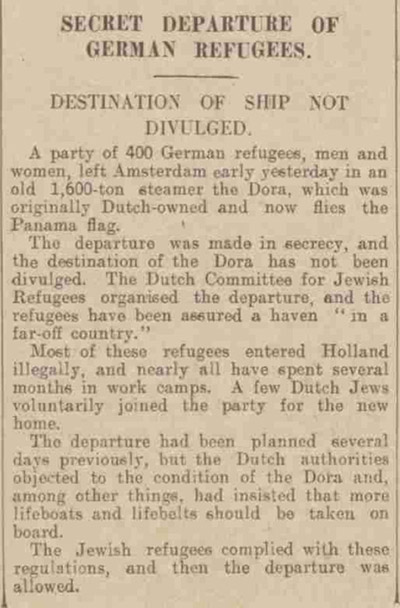
Nottingham Evening Post. July 17, 1939.
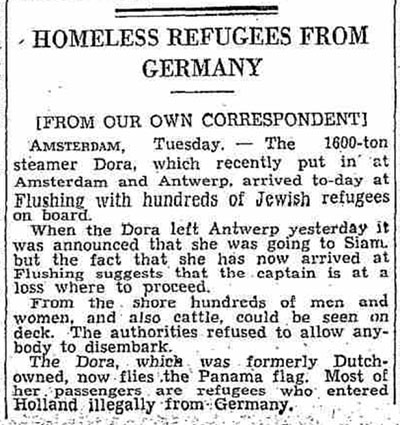
The Scotsman. July 19, 1939.
"From the shore hundreds of men and women, and also cattle, could be seen on deck".
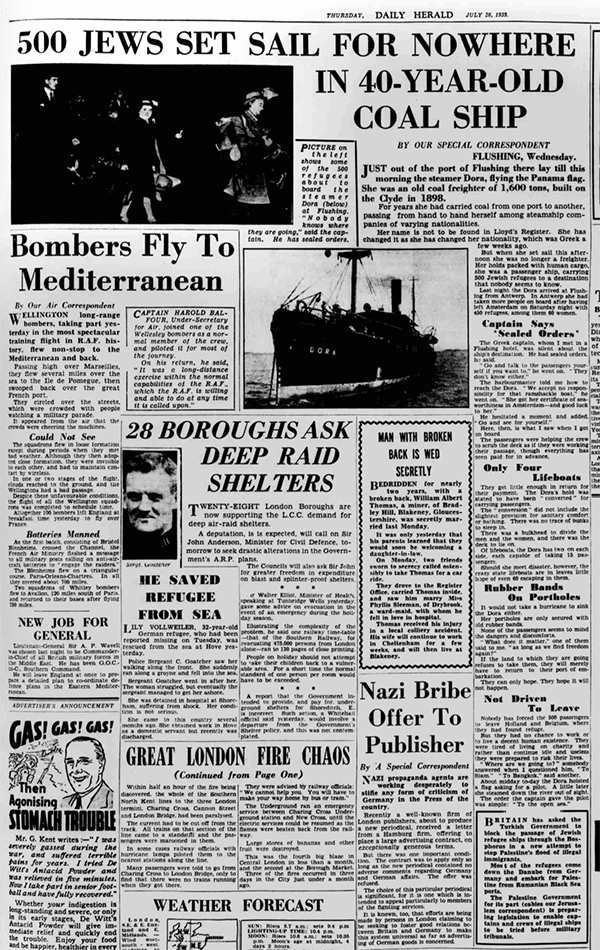
Daily Herald. July 20, 1939.
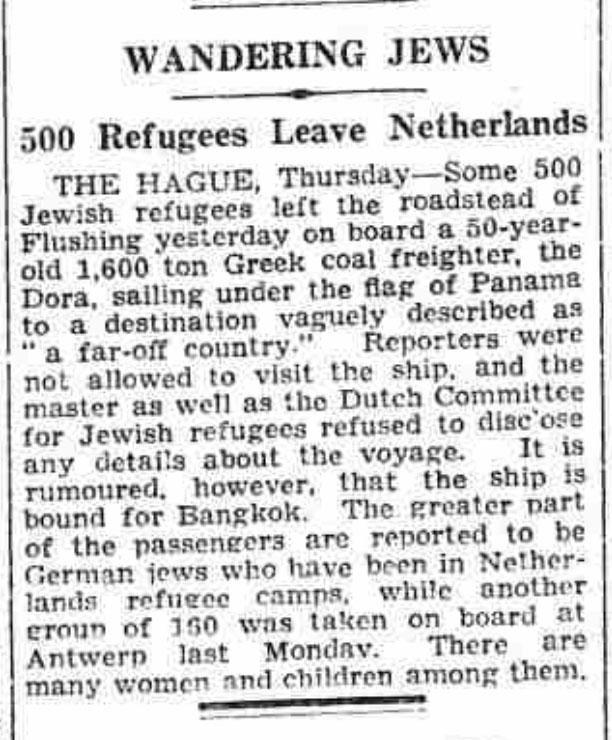
The Belfast NewsLetter. July 21, 1939.
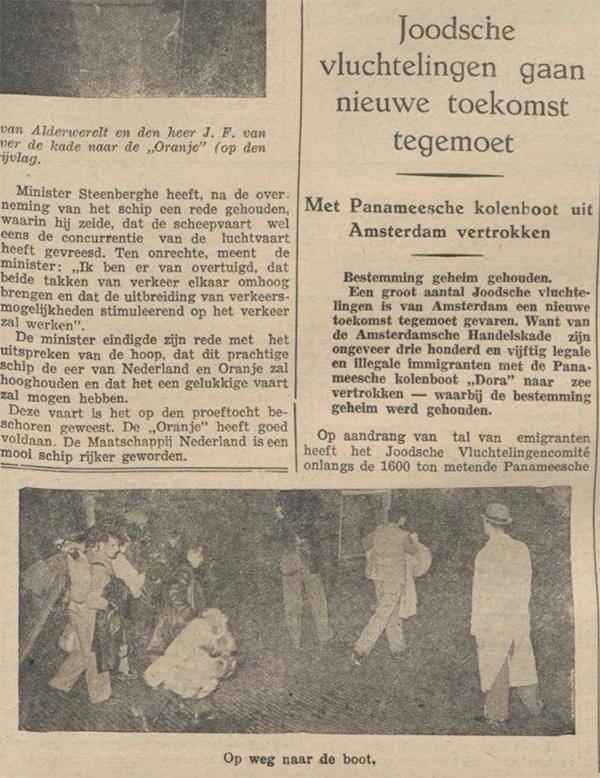
"Jewish refugees face a new future - Departed from Amsterdam with a Panamean coal ship."
De Sumatra Post, July 24, 1939.
The Organizers
Transporting 480 refugees from Northern Europe to Palestine on the eve of World War II and bringing them safely to the coast of Palestine despite the British blockade required complex planning, difficult negotiations, and the covert coordination of hundreds of refugees spread over multiple hiding places over two countries. The Dora would not have succeeded in reaching the shores of Palestine without the work and dedication of the many people involved.
Here is a list of some of the key people who, with their courage, skills, and generosity, helped save the lives of almost 500 refugees on the eve of World War II.
This section honors those who made it possible—and to whom all descendants of the Dora’s passengers owe their deepest gratitude.
| Name | Role | Notes |
Constantin Atychides
|
Owner/Lessor of the ship, Captain? |
Constantin (Kosta) Atychides was born in 1901 in Turkey, the son of Socrates Atychides, a retired ship owner. Constantin and his brother Pierre were two Greek brothers based out of Paris and had previous experience with smuggling during the Spanish Civil War. They were responsible for purchasing the ship, buying supplies, hiring the crew, and bringing the ship to Palestine. |
Pierre Atychides |
Owner/Lessor of the ship, Captain? |
Pierre Atychides was born in 1900 in Turkey, the son of Socrates Atychides, a retired ship owner. Pierre and his brother Constantin (Kosta) were two Greek brothers based out of Paris and had previous experience with smuggling during the Spanish Civil War. They were responsible for purchasing the ship, buying supplies, hiring the crew, and bringing the ship to Palestine. |
Shmarya Tzameret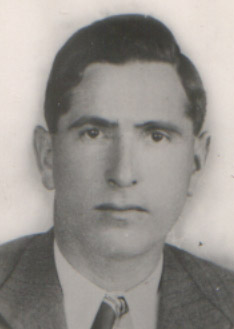
|
Oversaw the purchase of the Dora and all operational details up to the departure of the Dora, along with Gideon Ruffer. Age: 28 |
Shmarya Tzameret was born on October 17, 1910, in Cleveland, Ohio, the eldest son of Jewish Russian immigrants. His father was a committed Zionist and, in 1920, when Shmarya was ten, the two traveled to Eretz Israel to explore the possibility of making aliyah. Upon their return to the United States, however, his father fell ill with tuberculosis. On his deathbed, he asked Shmarya to fulfill his dream and make aliyah. After his father passed away, Shmarya immigrated to the Eretz Israel at the age of 15. He arrived in Tel Aviv alone, an American boy without knowing the language and without a family. He lived in a boarding house, and enrolled as a sixth-grade student at the Hebrew Gymnasium "Herzliya" in Tel Aviv. He was among the first class from the gymnasium to enlist in the recently established Hagana. Tzameret was one of the founders of Kibbutz Bet Hashita in 1936. In 1939, he joined Mossad LeAliyah Bet, operating from the central office in Paris. In 1940, Tzameret took part in unsuccessful negotiations with Eichmann in an attempt to let a large number of Jews immigrate from Germany. (Bracha Habas, p 128). In 1942, he took a sabotage course in the Palmach, but with the end of World War II, Tzameret enlisted again in the ranks of the Mossad LeAliyah Bet. After World War II, he was sent to Europe to resume his activities organizing illegal immigration of Jewish survivors (Bricha). He first operated from Italy then later served as commander of the Marseille station from 1945 to 1947. Tzameret played a key role in eight Aliyah Bet operations. Aside from the Dora (July 1939), he was involved with the Darian II (March 1941), Tel Hai (March 1946), Yagur (July 1946), Chaim Arlozorov (February 1947), Exodus (July 1947), Independence (December 1947), and The Panim (December 1947). Tzameret was involved in purchasing ships (which were registered in his name, as an "American businessman"), managing the fitting out of the dilapidated ships to absorb the illegal immigrants, their equipment, obtaining fictitious permits, managing the relationship with the various authorities, appointing the ship's command staff and professional staff, organizing thousands of illegal immigrants in the waiting camps, and secretly coordinating with Shaul Avigur, representatives of Jewish institutions, and civil authorities in Europe. Shmarya was married to Hadasa and the couple had three daughters, a son, and twelve grandchildren. He died in 1964 in a work accident at the olive factory of his Kibbutz, Beit-Hashita. His younger brother, Joe Tzameret, was a member of the International Socialist Movement. A trade union and Communist Party activist, he volunteered in 1937 for the International Brigades during the Spanish Civil War. After a year of fighting in Spain with the Lincoln Brigades, he was killed in battle in April 1938 at the age of 26. His sister, Rose Tzameret, remained in the United States and became an activist in the American Trotskyist movement. Sources: |
Ze'ev Shind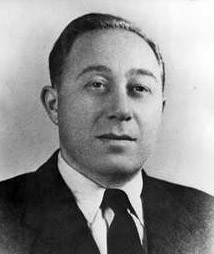 1951
1951
|
Purchase of the Dora |
Ze'ev Shind was born on September 7, 1909 in Vilna. A member of the Hechalutz movement and one of the leaders of the "Tel Hai" training farm in Poland, he was active in the executive committee of the Histadrut. In 1928, he was sent to coordinate Hechalutz activities in Warsaw. He immigrated to Palestine in 1929 and joined Kibbutz Ayelet Hashachar. Shind was active in the Haganah and became involved in illegal immigration efforts, beginning with the Velos. He was a senior official in the Mossad for Aliyah Bet, where he was nicknamed "Danny". Aside from the Dora, he oversaw the purchase and/or voyages of over twenty Aliyah Bet ships. Before the outbreak of World War II, these included the Poseidon (1938), Atrato I, II, III, IIII (1938,1939), Artemisia II (1938), Colorado (1939). In 1941, Shind was sent by the Rescue Committee to Istanbul to carry out aid and rescue operations. During the war, he was involved with ships including the Darien II (1941), Maritza (1944), and Milka (1944). After the war, he purchased ten ships in the United States and smuggled them out for use in immigration operations. Among them was the President Warfield, later renamed Exodus (1947). He also purchased the two Pan ships - the Pan Crescent (renamed Independence) and the Pan York, (renamed Kibbutz Galuyot), as well as the Josiah Wedgwood (1946) After the establishment of the state of Israel, Shind became one of the founders of the Israeli merchant fleet. He joined the management of ZIM and eventually became its chief executive. He was appointed Supervisor of Maritime Transportation and, in 1951, Director General of the Ministry of Defense. In September 1952, he became Director General of the Ministry of Transportation. After the end of his term, he returned to Zim and managed its subsidiaries "Elchot-Yam" and "Sheham" until his death at age 44 in December 1953. He left behind a wife and a daughter. He was laid to rest in the cemetery of Kibbutz Ayelet Hashachar. Sources: |
Yehuda Braginski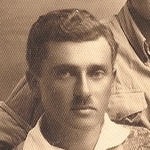
|
Purchase of the Dora Activist in Aliyah Bet and head of the Jewish Agency's Absorption Department (1948-1961). |
Yehuda Braginsky was born on November 17, 1897, in Konotop near Kiev, in the Russian Empire (now Ukraine). He received a secondary education and studied medicine for several years at the University of Kiev. Braginsky was one of the founders of the "Dror" Zionist youth movement at the end of World War I. Following persecution by the Soviet regime, he emigrated to Poland, where he joined the Hechalutz movement. In 1929, he immigrated to Eretz Israel and joined Kibbutz Yagur, where he worked in quarries, drained swamps, and served as kibbutz secretary. In 1934, Braginski was one of four emissaries of Hechalutz and Kibbutz Hameuhad who organized the voyage of the Velos, the first Aliyah Bet operation. In late 1937, he was sent by Hechalutz and the United Kibbutz movement to Europe to organize further clandestine immigration. Together with Ze'ev Shind and others, he coordinated the voyage of the Poseidon (arriving January 1938), followed by the Artemisia, Atreto, and Colorado between 1938 and early 1939. Based at the Hotel Metropole in Paris, Braginsky, Ze'ev Shind, and fellow activists purchased ships and oversaw the organization of the illegal immigrants. In addition to the Dora, Braginsky took part in the purchase of five ships (Atrato, Artemisia, Darien, Poseidon, and Colorado), helping arrange over a dozen Aliyah Bet sailings before the outbreak of the war. During World War II, Braginsky served on Kibbutz Hameuchad's overseas conference and was involved in the recruitment and preparation of the Palestine paratrooper expedition to Central Europe. From 1944 to 1948, he was active in the Bericha movement, facilitating the postwar emigration of Holocaust survivors with Aliyah Bet. After the establishment of the State of Israel, Braginsky led the Jewish Agency's Absorption Department, overseeing the absorption of mass immigration from both the East and the West. He continued in this role, representing the kibbutz movement, until retiring in 1961. Braginski is the author of a memoir, Am hoter el hof [A people seeks a shore], Tel Aviv: Hakibbutz Hameuchad, 1965 (in Hebrew). Yehuda Braginsky was married and had two children. He died in November 1979. Sources: |
Gideon Ruffer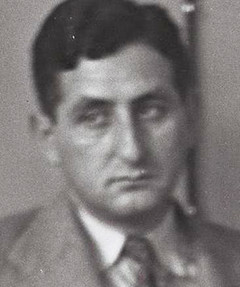 1948
1948
|
Led the planning of the Dora voyage with Shmarya Tzameret. Age: 26. |
Gideon Ruffer (Gerhard, later Rafael) was born on March 5, 1913, in Berlin, the son of a prosperous furrier. He studied law at the University of Berlin. He fled to France in 1933 following the Nazi rise to power. There, he studied at an agricultural school in Toulouse. In 1934, he immigrated to Eretz Israel where he was one of the founders of Kibbutz Hazorea. He joined the Haganah, serving as a commander during the Arab revolt of 1936-39. He was later sent on missions to Europe to help smuggle European Jews into Palestine, in defiance of British immigration restrictions. His American passport enabled him to travel throughout Europe in the service of Mossad LeAliyah Bet. Regarding his contribution to the success of the Dora, Yoram (Paul) Nussbaum later said:
In 1940, Raphael was sent by the Haganah to Rhodes to negotiate with a representative of Adolf Eichmann for the transfer of 40,000 German Jews to Palestine. The plan ultimately failed. During World War II, he enlisted in the British Army and fought in the Syria-Lebanon Campaign. After his discharge in 1943, he began working for the Jewish Agency, focusing on intelligence, and as a liaison with Allied forces and Jewish communities in Europe. In 1945, he helped prepare the Jewish case for the Nuremberg Trials, directed efforts to recover lost Jewish property, and took part in postwar rescue operations in Italy. Following Israeli independence in 1948, Raphael became one of the three founding members of the Israeli Foreign Ministry and served as an aide to Foreign Minister Moshe Sharett. He later acted as adviser to Israel’s delegation to the United Nations. From 1953 to 1957, he was in charge of United Nations and Middle Eastern affairs at the Foreign Ministry and conducted secret negotiations with Arab officials, contacts he would maintain into the 1970s. In 1957, he was appointed ambassador to Belgium and Luxembourg, as well as permanent observer to European and UN institutions in Geneva, serving until 1960. In 1967, he became Israel's ambassador to the UN, a role he held during the Six-Day War. In 1957, he was appointed Israel's ambassador to Belgium and Luxembourg, and permanent observer in European and UN institutions in Geneva. He served in these positions until 1960. In 1967, he became Israeli ambassador to the UN, and was serving in this position during the Six-Day War. He returned to Israel in 1968 to serve as Director-General of the Foreign Ministry until 1972. The following year, he was appointed Israel's ambassador to the United Kingdom, a position he held until his retirement from the Foreign Ministry in 1978. He later published a memoir about his diplomatic career. Gideon Raphael was married and had two children. He died in Jerusalem in February 1999. Sources: |
Tzvi Spector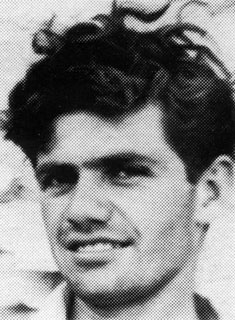
|
Ship manager on the Dora, Commander Age: 23 |
Tzvi Spector was born in Jerusalem on June 6, 1916. His mother died when he was a young child. He studied at the Hebrew Gymnasium in Rehavia, then for one year at the Hebrew University. He then traveled to England to continue his studies at the university, but due to lack of financial means, he returned to Israel after two and a half years. In his youth, he was one of the founders of the "Scouts Community" in Jerusalem and headed it for several years. He conducted courses for guides, scout camps and many youth trips, and was among the first scouts to circumnavigate the Dead Sea and Transjordan on foot. As part of the "Nodadat" ("The Nomad"), a mobile unit of the Hagannah founded by Yitzhak Sadeh in 1936, of which he was one of the founders, he participated in operations against Arab gangs around Jerusalem. For a time he also served as commander of the "Haganah". Zvi was one of the first to be certified to fly by the Aviron flight school and, among his other roles in the Haganah, he also translated and edited the training material. The Dora was his first mission with Aliyah Bet. He lived in Kibbutz Givat Brenner with his wife and son. In May 1941, Tzvi Spector became a founding member of the Palmach. He was appointed commander of Operation Boatswain"—also known as "The 23 Who Went Down at Sea"—a mission to sabotage the refineries in Tripoli, Lebanon, as part of the Jewish community's assistance to the Allied war against the Nazis and their allies. On May 18, 1941, twenty-three volunteers from the Palmach boarded a boat with explosives. All twenty-three members of the operation vanished before reaching their destination, including Tzvi Spector. He was 24 years old. Another volunteer among the twenty-three who died in that operation was Amiram Shochat, the emergency captain of the Dora. Zvi Spector wrote a book in the late 1930s, Danu Moshia Yisrael, a book for young people, which was published by his son Yiftach Spector (Ofir Bikurim , 2011). Sources: |
Amiram Shochat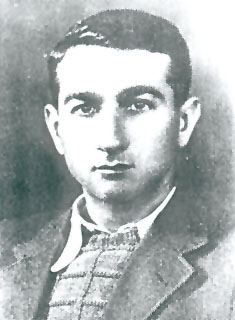
|
Emergency Captain on the Dora. Age: 23. |
Amiram Shochat was born in 1915 in Tel Aviv-Yafo. After his mother’s death when he was six, the family moved to Jerusalem in 1927, where his father got a job as an engineer. During the 1929 Arab riots, Amiram and his brother Yair helped defend Jewish neighborhoods as messenger boys and ammunition couriers. The family later returned to Tel Aviv, and in 1931 Amiram graduated with honors from the "Herzliya" Gymnasium. He studied engineering and drafting at the "Montefiore" school by night and worked as a draftsman and later as a drafting engineer in a metal factory by day. In 1935, he joined the Hapoel Tel Aviv naval company and worked as a boat and navigation instructor. After the establishment in 1936 of the port in Tel Aviv, he worked there as a mechanic on motorboats. When the Palmach established a naval department, Amiram was recruited into its ranks and helped develop its seamanship and navigation training materials. By the time of the Dora, Amiram Shochat was already a veteran of Mossad leAliyah Bet. He had first served as guide on the Artemisia in 1937, when his job had consisted of appraising the ship, examining its engine, sleeping accommodations, food-storage facilities, etc. Prior to the Dora, he had also organized the Poseidon II, which sailed in May 1938. In total, Shochat helped bring five Aliyah Bet ships to Eretz Israel. On May 18, 1941, Shochat disappeared at sea during "Operation Boatswain"—a Palmach-British sabotage mission targeting oil refineries in Vichy-controlled Tripoli. All 23 participants, including Shochat (age 26) and operation commander Tzvi Spector (former manager of the Dora), were lost, likely due to an explosion at sea. In 1946, an illegal immigration ship was named in his honor. Sources: |
Giora Yoseftal
|
Giora Yosephtal helped arrange the departure of halutzim on the Dora. Age: 26. |
Giora Yosephtal's exact role is not yet clear, but it seems that he identified people who would sail to Palestine. It is said that he "determined a crucial part of the list of immigrants*" and "demanded to have the right to determine who the passengers would be on board and succeeded in getting graduates of the Zionist youth movements and graduates of the training farm to sail on this ship". He may also have been tasked with helping raise the funds for the purchase of the ship in England. It is said that he "made the arrangements for its purchase in England with the help of Haim Weizman*." Georg Josephthal was born on August 9, 1912 in Nuremberg. Yoseftal joined the Jewish youth association "Jüdischer Jugendbund" at the age of 14. After high school he studied law and economics at the University of Heidelberg, Berlin and Munich. Due to the rise of the Nazis to power at the beginning of 1933, Yoseftal was forced to continue his studies in Basel, Switzerland, where he completed his doctorate in law. In 1932, he joined the Zionist-socialist youth movement Habonim, and the following year was appointed head of the youth department of the Bavarian Jewish community. In 1934 he became director of the Youth Aliyah office in Berlin, and two years later served as secretary of the Hechalutz movement in Germany. In 1936 he married Senetta (Senta) Yoseftal, later also an Israeli politician. As part of his activities, Yoseftal helped establish the Ellguth agricultural Hachshara affilated with HeChaltuz, many of whose trainees would later go on the Dora. In the 1930s he also assisted the Haganah in secret weapons purchases, but his activities were uncovered in 1937, and in September 1938, Giora and Senta emigrated to Mandate Palestine and came to Kibbutz Givat Haim. Following the events of Kristallnacht on November 9 of that year, just two months after arriving, he was sent on a mission to London to save German Jewry. As part of his position, he tried to work among European countries to temporarily absorb German Jews, with the final destination being the Land of Israel. About Giora Yosephtal's role with the Dora, Elyahu Reens later wrote:
He returned to Palestine in 1939, establishing a work brigade in Ra'anana, which later established Kibbutz Gal'ed in 1945. Giora and and his wife Senta were among the founders of the kibbutz. Many of the Dora passengers who came from the Ellguth Hachshara followed Giora in Kibbutz Gal'ed. From January 1943 to September 1945 he volunteered to serve in the British Army, and was stationed in Palestine and Egypt. After the war ended, he took over the absorption section of the Jewish Agency's aliyah department. Between 1947 and 1952 he sat on the Agency's board. In 1952 he was a member of the delegations which negotiated the Reparations Agreement between Israel and the Federal Republic of Germany. In 1956, he became secretary-general of Mapai, the ruling party, a role he held until 1959. In the elections that year he was voted into the Knesset on Mapai's list, and was appointed Minister of Labour. He retained his seat in the 1961 elections, and was given the roles of Minister of Housing and Minister of Development. Giora Yoseftal died in August 1962 and is buried in Kibbutz Gal'ed. Sources:
Additional ReSources (not accessed): |
Uri Kochba
|
Emissary of the Hechalutz movement from Palestine in the Netherlands. Age: 29. |
Uri Kochba (Walter Koch) was born in 1910 in Lissa, Germany (now Leszno, Poland). After World War I, it became part of Polish territory, and his family relocated to the nearby German town of Glogau (now Głogów, Poland). After completing high school, Kochba started to study architecture in Stuttgart, but did not finish his studies. During this time, he became actively involved in Zionist activities and was a member of the "Blau-Weiss" Zionist youth movement. In 1934, he made aliyah and joined Kibbutz Na'an. There, he participated in pioneering efforts—working the land, helping to establish the kibbutz’s agricultural branches, and producing weapons in its metalworking shop. In 1938, Kochba was sent to the Netherlands as an emissary of Hechalutz to assist the emigration of Jews to Palestine. Following the German invasion of the Netherlands in June 1940, Kochba was arrested as a British subject and interned in several detention camps in the Netherlands, Germany, and Austria. He was liberated on May 10, 1945. After the war, he returned to Kibbutz Na'an and married Adina, the widow of Joachim "Schuschu" Simon, a member of the Dutch pioneering underground group "Westerweel Group," who had committed suicide in prison in 1943. In 1957 he served as the first postwar Israeli emissary to educate Jewish teenagers in Germany. After a year and a half, he returned to Na'an. From 1958 onward, he divided his time between work on the kibbutz, a position in the Youth Division of HaKibbutz HaMeuchad, and teaching at the Efal teacher training seminary. Uri Kochba was married and had two sons. died in November 2001. Sources: |
Yekutiel Fekete
|
Gideoni (Wireless Radio Operator) on the Dora. Age: 24 |
Yekutiel Fekete was born in 1915 in Hungary. His family made Aliyah in 1928 and came to Jerusalem. He received a master's degree in mathematics, physics and philosophy from the Hebrew University. After joining the Haganah, he took a signaling course, then built a primitive transmitter, creating the first wireless connection between Jerusalem and the Dead Sea, and later to Gush Etzion. In 1939, he was sent to Europe to help organize the rescue of Jews, and he returned on the Dora. In 1951, he established the Bezeq School of Telecommunication in Jerusalem. He retired from his position as director in 1981. Yekutiel Fekete was married and had two children. He died in October 2001. He wrote the story of the Dora in 1989, on the occasion of the 50th anniversary of the voyage. Sources: |
David Nameri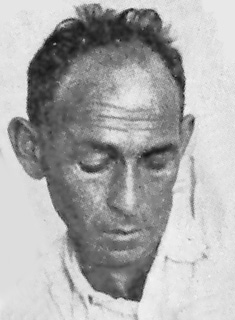
|
Oversaw the disembarkation of the Dora in Palestine. Age: 30. One of the founders of Kibbutz Ashdot Yaakov, Operations officer of 'HaMossad for Aliyah Bet', deputy commander of the Palmach, and director general of the Ministry of Transportation. |
David Nameri was born in 1908 in Skidzieĺ, Poland (now Belarus). He grew up in a Zionist home and was active in a Zionist youth movement. After finishing school, he worked in the timber trade, performing hard physical labor loading timber onto train cars. In 1926, at age 18, he made aliyah as a trainee of the Hechalutz movement. He joined Kibbutz Gesher (later Kibbutz Ashdot Yaakov) and was appointed foreman at the Naharayim electricity plant in 1927. At the age of 19, he also served as commander of the point defense. He later joined the Haganah. David Nameri was a founder and senior officer of both the Mossad leAliyah Bet and Palmach (where he held the rank of lieutenant general commander). From 1936 to 1939, he oversaw the administration of over thirty Wall and Tower (Stockade and Watchtower) settlements in the Bet She'an Valley and Jordan Valley—including Maoz Haim, where several passengers of the Dora, including my mother, temporarily settled. Between 1937 and 1947, he served as head of logistics and operations for the Mossad for Aliyah Bet, responsible for coordinating illegal immigration to Palestine by sea, air (as in Operation Wings I), and land. Together with Katriel Yaffe, he conducted the first coastal survey to identify suitable landing sites. Under his leadership, some 60,000 illegal immigrants were brought to the country aboard 80 ships. He took part in the earliest Aliyah Bet operations, overseeing the disembarkation of the Poseidon and the Artemisia in 1937. He scouted locations where boats could come ashore, improved the radio communication system between ships and shore, and organized the disembarkation phase of the ships. Nameri was in charge of the final stage of the Ha'apala-disembarking the immigrants from the ships and receiving them on the shores. The Fourth Palmach Battalion, under his command, was tasked with securing landing sites. Upon receiving word that a ship had departed Europe, the battalion's headquarters was responsible to prepare for its arrival. The HQ selected a landing point, gathered men and arms, secured the shores and access roads, and arranged for the immigrants’ absorption into nearby settlements. As one of the Palmach’s founders, Nameri served as deputy to commander Yitzhak Sadeh (1941–1943) and commanded the Kinneret district of the Haganah, which comprised about 20 settlements. During his time, he used 10 underground aliases. Aside from Davidka, he was also known as Khofi, Ashdoti, Vatik, Herat, Yarmouki, Laban, Natan, Amali, and Hofi. From 1947 to 1949, Nameri served as a Defense Ministry envoy to the United States for the purpose of purchasing ships, weapons and ammunition. In his capacity, he purchased 30 ships and vessels, some of which were used to transport illegal immigrants and some for the nascent Israeli Navy. He and his family returned to Kibbutz Ashdot Yaakov in 1949. Nameri was the executive officer in charge of immigration by sea, land or air. He oversaw Operation Wings, the aerial immigration of Jews of Baghdad, Iraq. In 1960, he was appointed Deputy Director-General of the Ministry of Transportation and became Director-General in 1962, a position he held until 1965. Davidka Nameri had two sons and two daughters. He died in 1966. Davidka's wife, Dvora, became a Gideonit (radio operator) for the Haganah in 1939 and contributed to monitoring and deciphering British secret messages from a Haganah's listening post. Sources: Further reading: |
Yoel Golomb
|
Took part in the disembarkment of the passengers. Age: 20 |
Born in 1919 in Germany, Golomb came to Eretz Israel in 1936 with Youth Aliyah. He first lived in Kibbutz Na'an, then in Kibbutz Ashdot Yaakov, and later joined Kibbutz Revivim in 1939 in Rishon LeZion. Yoel Golomb was selected in July 1939 by the kibbutz to participate in the first naval course of the Haganah. The course was designed to train sailors to help in Aliyah Bet. Training consisted of rowing and sailing in the Yarkon River and at sea, swimming, lifesaving, and other seamanship tasks. After the outbreak of World War II, took further naval training, this time focusing on sabotage tactics for land and sea, in order to help the British in their fight against the Nazis and joined the British Navy in 1941. Sources: |
Shani, Chaim (Sergei) |
Took part in the disembarkment of the passengers of the Dora. Age: 19 |
Born in 1920, made Aliyah in 1935. Lived in Tel Aviv and belonged to the Noar Haoved movement. In 1939, he participated in the first naval course in the Exhibition Halls in Tel Aviv. In August 1939, while attending the course, he helped take immigrants off the Dora when it landed at Shefayim. Lived in Kibbutz Na'an, then in Kibbutz Ashdot Yaakov. Joined Kibbutz Revivim in 1939 in Rishon LeZion. Volunteered for the Palmach in 1941 and was attached to F Company at Kfar Gileadi under the command of Yitzhak Rabin. He later participated in disembarking the immigrants off the "Chana Senesh" in December 1945 at Nahariya. Sources: |
Dov 'Berchik' Magen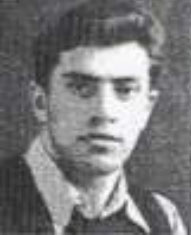
|
Took part in the disembarkment of the passengers of the Dora. Age: 24 |
Born in 1915 in Panza, Russia; Came to Palestine in 1935. Quoted by Chaim Shani: "Berchik also took part in that (Dora) operation." He was an instructor of the Palyam's 'No. 1 Naval Officers' course, in 1945 with Shmuel Tankus. In June 1946, Dov (Berchik) Magen was the commander for the "Josiah Wedgwood", with 1,259 immigrants, and of the Pan Crescent (renamed "Atzmaut") in 1947. Sources: |
Shaul Avigur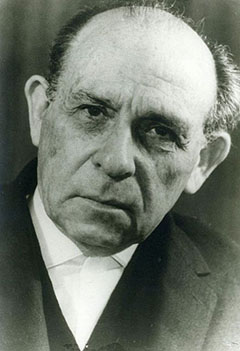
|
Head of Mossad leAliyah Bet. Monitored the landing of the Dora from Golda Meir's apartment. |
Prior to leading Mossad leAliyah Bet, Shaul Avigur had been among the defenders of Tel Hai in 1920. Since 1933 he had been the coordinator the Haganah and was instrumental in forming SHAI, the intelligence wing of the Haganah along with Reuven Shiloah in 1934. A senior Haganah member experienced in underground work and held in high esteem, Avigur joined Mossad leAliyah Bet in 1939, and was key in the success of the efforts of illegal immigration. During Israel's War of Independence, he acted as David Ben-Gurion's deputy defense minister. In 1953, he was appointed the founding head of Lishkat Hakesher, also known as "Nativ", an Israeli organization that maintained contact with Jews in the Soviet Union during the Cold War. He headed the organization until 1970. Sources: |
Gertrude van Tijn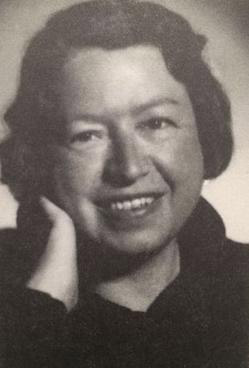
|
Gertrude van Tijn helped organize the voyage of the Dora, despite the opposition of the chairman of the Committee for Jewish Refugees, David Cohen. |
Gertrude van Tijn was born in 1891 in Braunschweig, Germany. She came to the Netherlands in 1915. A Zionist since 1916, she started working for JNF in 1917. In April 1933 she began to assist with the growing number of Jewish refugees from Germany. She then became the representative of the Joint Distribution Committee in Holland and a member of an advisory committee of the League of Nations' Commission for Refugees. She joined the Committee for Jewish Refugees, and helped organize Jewish emigration from Germany between 1933 and 1940. A key member of the Committee, she oversaw everyday operations, was responsible for managing the finances, headed its emigration department, and became the contact person for foreign aid organizations. She was the co-founder and secretary of Werkdorp Nieuwesluis (the Work Village in Wieringen), a farm founded in 1934 in the Wieringermeer polder in North Holland that trained refugees of varying ages and vocations in agricultural work as well as construction, the raising of cattle and poultry, domestic work, gardening, cabinetry, locksmithing, and other practical work. She declined the opportunity to leave the Netherlands during the German invasion of May 1940, and continued her work with the Committee until its dissolution in March 1941. In September 1943 she was sent to the Westerbork transit camp camp and then Bergen-Belsen. In July 1944 she was among those Jews exchanged from Bergen-Belsen for Germans in Palestine. Afterwards the Dutch government in exile offered her a position in London to work with displaced Jews; she traveled through liberated Europe and Switzerland in this capacity until the end of the war. She died in Portland, USA, in 1974. Sources:
www.tabletmag.com |
Siegfried Kramarsky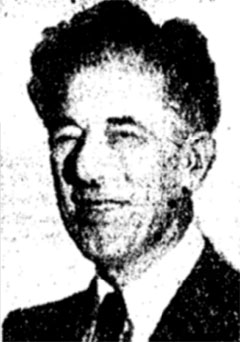
|
Covered the cost of the Dora voyage with his business partner Salomon Flörsheim, and possibly others. |
Born in 1893 in Lubeck, Germany, Siegfried Kramarsky was a German banker, art collector and philanthropist. He settled in Amsterdam in 1923. With his partner, Salomon Flörsheim, Kramarsky took over the "Lisser & Rosenkranz" bank in Amsterdam which he headed from 1923 until 1938. From 1933 to 1939, Kramarsky was active in enlisting support for Jewish victims of the Hitler regime who had fled to the Netherlands. While in Amsterdam, Kramarsky compiled a large art collection that included works by Cezanne, Toulouse-Lautrec, Renoir, Seurat, Gauguin, and Vincent van Gogh, including the Portrait of Dr. Gachet which was sold in 1990 by his heirs for $82.5 million, making it one of the most expensive paintings in the world. Siegfried Kramarsky and his family came to the United States after fleeing the Netherlands in 1940, aided by Dr. Chaim Weizmann, a family friend who later became the first president of Israel. His wife, Lola Popper Kramarsky, was active in the Youth Aliyah movement and was president of Hadassah from 1960 to 1964. Siegfried Kramarsky died in Manhattan in 1961. Sources: |
Salo (Salomon) Jakob Flörsheim |
Participated in the financing of the Dora with his business partner Siegfried Kramarsky, and possibly others. |
Salo (Salomon) Jakob Flörsheim was born in 1893 in Hamburg. S. J. Flörsheim and his family emigrated to Amsterdam, Netherlands around 1922, and he continued to work in private banking and brokerage business in Amsterdam, where he joined with another emigrant from Hamburg, Mr. Siegfried Kramarsky, a well known art collector. In 1944 the Flörsheims were first sent to the Westerbork transit camp, then to Thereisenstadt, where they survived the war. Salo and his wife Eva made Aliyah during the 50s and settled in Kfar Shmaryahu, where Eva passed away in 1975, and Salo in 1979. He befriended many Rabbis, scholars, and community leaders, and was personally acquainted with the early leaders of the State of Israel, including presidents Weizmann and Ben Zvi. He was an active philanthropist who practiced charity without fanfare. In the late 30s, he urged family and friends to flee Hitler's Germany. His home was often the refugees' first stop, for a day, week or month, and for those who could not afford it, he even paid for the trip, thus saving many families from the Holocaust. Salo (Salomon) Flörsheim died in 1979 (86) in Kfar Shmaryahu, Israel. Sources: |
Saly Mayer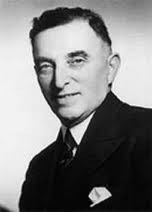
|
Contributed to financing the voyage of the Dora. |
Saly Mayer, 1882-1950. Swiss businessman, friend of Gertrude van Tijn. Chairman of the Swiss Federation of Jewish Communities from 1936 to 1943, and Representative of the Joint Distribution Committee in Switzerland from 1942. In the spring and summer of 1944, Saly Mayer was approached by the Nazis who offered to spare the life of Hungarian Jews in exchange of 10,000 trucks and supplies. Although the deal ultimately fell through, Saly Mayer is credited with saving thousands (up to 200,000) of Hungarian Jews by employing "every imaginable dilatory tactic" over several months of negotiations. He "walked the tightrope of negotiating with the Nazis to save Hungarian Jews while refusing the Nazis' requests for resources that would have prolonged the war." After the end of the war he became a middleman on behalf of the Joint in financing illegal immigration to Palestine. Sources: |
Rudolf "Ru" Cohen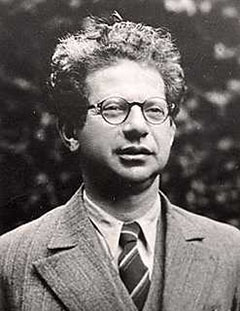
|
Head of the Deventer Association, the second largest group of pioneers who boarded the Dora in Amsterdam |
Rudolf Ephraim Cohen ("Ru") was born on July 27, 1889, in Deventer, the Netherlands. Ru Cohen founded the Deventer Association for Vocational Training for Palestine Pioneers in 1918 in Deventer, and continued to be its driving force until his end. His brother was David Cohen, chairman of the Committee for Jewish Refugees, who would later be chairman of the Jewish Council for Amsterdam during the German occupation. The goal of the Deventer Association was to provide agricultural and vocational training (Hachshara) for Jewish boys and girls in preparation for immigration to Palestine. The "Palestine pioneers" (chalutzim) were placed with farmers near Deventer or with a furniture makers. Originally designed for Jewish youth from the Netherlands, the organization took on refugees from Germany and Eastern Europe in the late 1930s. Ru Cohen was deported and died in Bergen-Belsen on February 27, 1945. |
The Passengers
According to records from Mossad leAliyah Bet, the Dora carried 480 passengers to its destination. A few sources mention slight variations: Gertrude van Tijn, who took part in the rescue operation, cites 310 passengers in Amsterdam, including 50 pupils from Werkdorp Nieuwesluis, with an additional 157 passengers in Antwerp, for a total of 467, while some authors have rounded the number to 500.
Two lists of passengers have been found so far: one from Amsterdam, with 183 names, and one from Antwerp, with 171 additional names, for a total of 354. The difference between the 480 given by Mossad can mostly be explained by the fact that the lists from Amsterdam were compiled by Zionist groups and only include passengers who belonged to their groups. Refugees, who were not affiliated with any Zionist organization, were not included in those lists. The Antwerp list contains a mix of chalutzim and refugees. It appears to have been compiled by the Belgian authorities, and may be comprehensive.
To date, 382 (80%) names are known out of the estimated 480 passengers.
List 1: List of Passengers who boarded the Dora in Amsterdam on 16 July 1939 (from the Hechalutz lists).
Source: Dutch National Archive (Courtesy Rina Offenbach, Director BeNetivei Ha'apala, Illegal Immigrant Database and Information Center, Atlit Detention Camp, Israel.)
I compiled the Amsterdam list below from 18 pages of names from several Pioneering organizations:
- "Left on the SS Dora": 7 names, handwritten list, no indication of group
- Stichting Joodse Arbeid Werkdorp Nieuwesluis: 76 names, dated August 1 (after the departure of the Dora), typewritten.
- "List of foreign students who left during the month of July": 36 names, including last address and nationality
- "Dath Waäretz": 26 names, dated August 7, typewritten.
- "Dath Waäretz, left on the Dora": 22 names, with 4 more names crossed out, handwritten list.
- Deventer Association: 54 names over 4 typewritten pages, covering 32 locations. Include date and city of birth and nationality.
- Werkdorp Wieringermeer: 76 names over 2 typewritten pages. Include date and city of birth and nationality. (Gertrude van Tijn mentioned 50 people came from the work village, while another witness quoted in Stegeman's and Vorsteveld's book put the number to approximately 55. It is not known if this means that the Wieringermeer list included 20 to 25 refugees who had not belonged to the work village, or maybe had joined right before the voyage.)
- Vereeniging "Dat Waarez" (Amsterdam): 7 names, including date and city of birth and nationality. Typewritten.
- Vereeniging "Dat Waarez" (Bevervwijk): 20 names, including date and city of birth and nationality. Typewritten.
- Enschede: Hachscharah Agudas Jisroël: 7 names, including date and city of birth and nationality. Typewritten.
- Franeker (Kiboets Misrachi): 3 names, including date and city of birth and nationality. Typewritten.
- Laren Bergstichting: 2 names, including date and city of birth and nationality. Typewritten.
The last seven lists follow a similar format an were most likely prepared by the same person, presumably from the Hechalutz organization. The other lists are all different and were most likely created by their respective groups. Some names are appear on more than one list.
This list doesn't include all the passengers who boarded from Amsterdam for several reasons:
- 183 names appear on the Amsterdam lists. However, contemporary reports from the press and later accounts from organizers put the total number of passengers in Amsterdam at about 300, with Gertrude van Tijn citing 310 passengers.
- The Amsterdam lists were compiled by several Zionist pioneer organizations, mainly Hechalutz, Mizrachi, Deventer and the Werkdorp Wieringermeer. Hence, passengers not affiliated with these groups don't appear on those lists.
- A large of number of refugees, i.e. people not affiliated to any Zionist organization, boarded the Dora in Amsterdam. A list of the refugees, if it ever existed, hasn't surfaced yet.
- Several reports mention the presence of children on the Dora (Yoel Golomb, Gershon Jonas, and Flip Cohen - although Cohen mentions them boarding in Antwerp). These too are don't appear in the lists that were drawn by the pioneering groups.
- Over the years, several people have contacted me with information about relatives who boarded from Amsterdam whose names don't appear these lists, confirming that the available lists are not comprehensive. These names appear in a separate list further down.
Note: Four names on these lists were crossed out, without further explanation. My assumption is that these are people who may have decided at the last minute to not board the Dora, or were unable to do so.
Although incomplete, the Amsterdam list includes interesting demographic data on the passengers:
Gender:
- Men: 80% (146)
- Women: 20% (36)
Nationality:
- German: 69% (126)
- Dutch: 9% (16)
- Polish: 8% (14)
- "Stateless": 7% (13). (It is not clear if these "stateless" passengers were of Polish or German origin.)
- Hungarian: 3% (6)
- Czechoslovak: 1% (2)
- Danzig: 0.5% (1)
- England: 0.5% (1)
- Unknown: 1.5% (3)
Organizations:
- 76: Werkdorp Wieringermeer
- 59 (or 60): Deventer Association, distributed over several locations, the largest group (15) from Jeugdherberg (youth hostel) "De Assumburg" in Heemskerk, about 20 miles from Amsterdam
- 29: Mizrachi (religious Zionist) Kibbutz Dat veEretz (דת וארץ, "Religion and Country") in Beverwijk
- 7: Enschede Hachscharah Agudas Yisroel
- 3: Kibbutz Misrachi (religious Zionist) in Franeker
- 2: Berg-Stichting, Laren (Jewish orphanage)
A few individuals came from additional locations: Markelo, Almen, Zenderen, Zeddam and Delden.
For the list of additional passengers who boarded from Amsterdam, see further down under "Additional Passengers".
Note: Dates of birth are given as they appeared on the original lists with the following format: dd.mm.yy. In a few cases, the dates are incorrect (i.e. "3" instead of "8"). These dates are marked with an asterisk (*).
Total: 178
| Name | Pioneer Organization | Group | Last adress? | D.O.B (dd.mm.yy) |
Bio |
Abram, Susanna

|
The Deventer Association
Amsterdam Henriette, Korte Meerhuizenstr. 3 |
Amsterdam | Henriette, Korte Meerhuizenstr. 3 |
26.8.1912
Amsterdam Polish* |
Susanna Henriette Abram (later: Shoshana Benima) was born on August 26, 1912, in Amsterdam, the daughter of Simon Abram, a diamond cutter from Amsterdam, and Gesiena, née Nieweg, from Leek. She had one brother, Heiman (1914).
This profile is private.
Contact us to gain access to this profile. |
Abramczyk, Bruno

|
The Deventer Association
Amsterdam "De Vondelhof" |
Amsterdam | "De Vondelhof" Frederikstr. 18 Amsterdam |
2.12.1919
Jastrow German |
Bruno Abramczyk (later Baruch Ben Avram) was born on December 2, 1919, in Jastrow, Westpreußen (now Jastrowie, Poland), the son of Max Abramczyk, originally from Samter in Prussia (later Szamotuły, Poland), and Minna Danziger, from Ratzebuhr (now Okonek, Poland). He had one sister. His father later married Minna Brasch, from Lobsens.
This profile is private.
Contact us to gain access to this profile. |
Adler, Alfred

|
Werkdorp Wieringermeer | Werkdorp Wieringermeer | 3.1.1912
Lauterbach Stateless |
Alfred Adler (later: Asher Adler) was born on January 3, 1912, in Lauterbach, Germany, the son of Meir Adler, a merchant, and Julia Fröhlich, from Lauterbach. He had (at least) one sibling, Bertha (1918).
This profile is private.
Contact us to gain access to this profile. |
|
Altberger, Karl
|
The Deventer Association | F.H. Evers "De Eekhorst", Hummelo |
18.11.1919
Köln Czechoslovak |
Karl Altberger (later: Reuven Altberger) was born on November 18, 1919, in Köln-Lindenthal, the son of Lazar (Ludwig) Altberger and Regina Elias, the youngest of nine children. His siblings included: Arnold, Max, Johanna/Hannah, Paula, Hermann, Rosa (1911), and Samuel ("Sanny") (1912).
This profile is private.
Contact us to gain access to this profile. |
|
Appel, Rosa

|
Enschede Hachscharah Agudas Yisroel | Euterpestr. 41 Amsterdam-Z |
27.9.1914
Naumburg German |
Rosa Appel (later: Rosa Deutsch) was born on September 27, 1914, in Naumburg near Kassel, the daughter of Siegfried Appel and Johanna, née Hirsch. She had seven siblings: Käthe (1906), Jacob (1907), Hedwig (1908), Sophie (1911), Karl (1913), Hertha (1917) and Irma (1919).
This profile is private.
Contact us to gain access to this profile. |
|
Aufrichtig, Hedwig (Hedy)
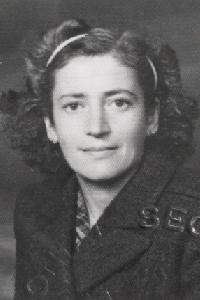
|
The Deventer Association (Den Haag) | Den Haag | L. Beestenmarkt 135 |
23.7.1916
Vienna German (Öst.) |
Hedwig "Hedy" Aufrichtig (later: Hedwig Khalil) was born on July 23, 1916, in Vienna, Austria, the daughter of Siegfried Aufrichtig, from Boskowitz (Austro-Hungarian Empire, later Boskovice, Czechoslovakia), and Flora Holzer, from Graz (Austria). She had two siblings, Elise (1915) and Hans (1921).
This profile is private.
Contact us to gain access to this profile. |
Bagainski, Margot

|
The Deventer Association (Gouda) | Gouda | Ridder van Katzweg 61 |
10.11.1919
Berlin German |
Margot Sophie Bagainski (later: Miriam Timnah) was born in Berlin on November 10, 1919, the daughter of Hermann Bagainski, from Gnesen (now Gniezno, Poland), and Helene Bagainski (née Ruschin), from Schokken (today Skoki, Poland). She had two brothers, Julius (1921) and Arno (1924). Her mother died in 1930 when Margot was 11 years old.
This profile is private.
Contact us to gain access to this profile. |
Baum, Charlotte

|
Mizrachi Kibbutz Dat veEretz, Beverwijk Vereeniging "Dat Waarez" (Bachad) |
Amsterdam | Kasernestr. 4 |
28.7.1919
Beuthen Stateless |
Charlotte "Lotte" Baum (later: Sara Ben Tovim) was born on July 28, 1919, in Beuthen (now Bytom, Poland, the daughter of Yitzchak and Chana Baum. She had (at least) one sister, Ruth (1923).
This profile is private.
Contact us to gain access to this profile. |
Baum, Günter
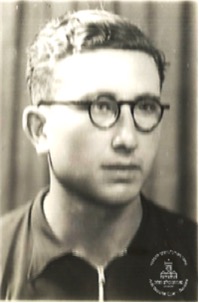
|
The Deventer Association | MIDDELBEEK bij Voorst | bij Frederiks Papenstraat 45, Deventer |
22.12.1918
Waltrop German |
Günter Baum (later: Gideon Alon) was born on December 12, 1918, in Waltrop, Recklinghausen, Westphalia, the son of Jakob Baum, from Mengede, and Martha, née Bendix, from Dortmund. He had two brothers, Helmut (1913) and Werner (1915).
This profile is private.
Contact us to gain access to this profile. |
Beifus, Berthold

|
Werkdorp Wieringermeer | Werkdorp Wieringermeer |
15.1.1917
Laasphe German |
Berthold Beifus (later: Baruch Lavi) was born on January 15, 1917, in Laasphe, Germany, the son of Herz Beifus and Mina née Stern. He had five siblings: Irma (1912), Robert Reuven (1913), Arthur Abraham (1915), Julius (1919), and Herta (1920); and three older half-brothers from his father's first marriage: Siegfried (1902), Leonhardt (1904), and Joseph (1906).
This profile is private.
Contact us to gain access to this profile. |
|
Bekker, Hymann

Kibbutz Franeker, Winter 1938-1939
|
Mizrachi Kibbutz Dat veEretz, Beverwijk Vereeniging "Dat Waarez" (Bachad) |
Beverwijk: Velsen-Noord |
24.10.1918
Den Haag Dutch |
Hijman Bekker (later: Chaim Bekker) was born on October 24, 1918, in The Hague, Netherlands, the son of Mendel Bekker, from The Hague, and Rachel Swaan. Hijman had four sisters and two brothers: Hanna Roza (1911), Juda Levie (1912), Golderiesje (1915), Betsy (1916), Joseph (1921), and Sophia (1923).
This profile is private.
Contact us to gain access to this profile. |
|
Benedikt, Franz

|
The Deventer Association (Deventer) | Deventer | Papenstraat 45, Deventer |
21.3.1918
Unterberg-Eisenstadt, Austria German* (Östr.) |
Franz Benedikt (later: Peretz Benedikt) was born on March 21 (or 29*), 1918, in Unterberg-Eisenstadt, a Jewish enclave near Vienna, the son of Ignaz Benedikt and Berta, née Hacker. He had six siblings: Martin Isidor (Isidore) (1911), Miksa (Max) (1913), Eugin (Eugene) (1915), Ernst (1920), Robert (1923), and Lili (Livia) (1926).
This profile is private.
Contact us to gain access to this profile. |
Benima, Max

|
The Deventer Association (Rotterdam) | Rotterdam |
12.9.1913 Amsterdam Dutch |
Max Frederik Leopold Benima (later: Moshe Benima) was born on September 12, 1913, in Amsterdam, the son of Frederik Benima, a merchant from Winschoten, Netherlands, and Sara, née Polak, from Bunde, Germany. He had one sister, Bertha Lea (1914). His father died in May 1923 when Max was not yet thirteen. His mother later married Salomon Schwartz, a traveling textile salesman, in January 1926.
This profile is private.
Contact us to gain access to this profile. |
|
Benjamin, Julius

|
Werkdorp Wieringermeer | Werkdorp Wieringermeer |
24.3.1921
Königsberg German |
Julius Benjamin (later: Yehuda Osh) was born on March 24, 1921, in Königsberg (now Kaliningrad, Russia), to Bernhard Benjamin, from Friedrichsdorf, and Hedwig Jaffe, from Schrimm, near Posen (after 1918: Śrem, Poland). He had five siblings: Susi (1914), Betty Batja (1915), Wilhelm "Willi" Ephraim (1917), Ruth (1918), and Manfred Emanuel (1919).
This profile is private.
Contact us to gain access to this profile. |
|
Benjamin, Rudolf
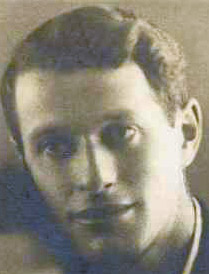
|
The Deventer Association (Almelo) | Almelo: Erve "De Kooi" | tijd. Celebesstraat 49E Den Haag |
1.1.1917
Barmen German |
Rudolph Benjamin (later: Uzi Binyamin) was born on January 1, 1917, the son of Albert Abel Benjamin and Anna Meijer in Barmen, Germany. He had two siblings: Erich (1915), and Erika Jeanette (1918).
This profile is private.
Contact us to gain access to this profile. |
Berger, Otto

|
Markelo: Op het Reef Kerkspeelchor K. 51 | G.W.A Brunnekreeft, Op, 't Reef, Kerspel Goor K.51. Gem. Markelo |
5.3.1912
Zoornik Czechoslovak |
||
Bergmann, Jaacob

|
Werkdorp Wieringermeer | Werkdorp Wieringermeer |
16.1.1914
Gr. Rackchen German |
Jacob Bergmann was born on January 16, 1914, in Gross Kakschen (Birkenhain), the son of Albert Bergmann, a trader/merchant and Anna Reissmann. He had three siblings: Wanda (1908), Gerda (1915), and Arthur (1916).
This profile is private.
Contact us to gain access to this profile. |
|
Besser, Wolfgang

|
Werkdorp Wieringermeer | Werkdorp Wieringermeer |
22.8.21
Breslau German |
Wolfgang Besser (later Oded Betzer) was born on August 22, 1921, in Breslau, the third child of Albert Besser and Ilse Pinkus. He had two siblings: Elisabeth Margarete (1916), and Hans Joachim (1924).
This profile is private.
Contact us to gain access to this profile. |
|
Bing, Marianne

|
Werkdorp Wieringermeer | Werkdorp Wieringermeer |
1.3.1921
Nürnberg German |
Marianne Bing (later known as Miriam Mohr) was born on March 1, 1921, in Nuremberg, the only child of Dr. Siegmund Bing and Charlotte "Lotte" Bing (née Pickard).
This profile is private.
Contact us to gain access to this profile. |
|
Binstock, Fritz
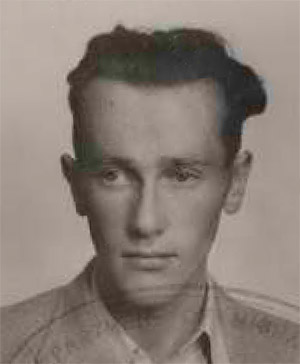
1946
|
Werkdorp Wieringermeer | Werkdorp Wieringermeer |
23.3.1921
Vienna German (Austrian) |
Fritz Binstok was born on March 23, 1921, in Vienna, the son of Adolf Abraham Aron Binstok, a shopkeeper, and Klara Chaje Rifka Sternberg. Both parents were originally from the Lviv region. Fritz had three sisters: Grete Margaret, Erna Golde, and Gusti (1912).
This profile is private.
Contact us to gain access to this profile. |
|
Birnbaum, Ruth (Grete)

|
Werkdorp Wieringermeer | Werkdorp Wieringermeer |
12.5.1922
Hamelin (Hameln) German |
Ruth Berta (Grete) Birnbaum (later: Ruth Keret) was born on May 12, 1922, in Hamelin, Germany, the eldest child of Max Birnbaum and Margarete Goldstein. She had a younger brother, Alfred (1924).
This profile is private.
Contact us to gain access to this profile. |
|
Birnbrey, Rosel
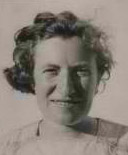
ca. 1947
|
The Deventer Association (Herwikerwaard) | Herwikerwaard | p.a. Veldhorst |
23.11.1921
Stettin German |
Rosel Birnbrey (later: Rachel Sharon) was born on November 23, 1921, in Stettin, Germany (now Szczecin, Poland), the daughter of Siegfried Birnbrey, a merchant from Stettin, and Elizabeth Bittermann, from Berlin. She had three siblings: Helga (1916-1935), Vera (Gusta) (1927), and Manfred (1936).
This profile is private.
Contact us to gain access to this profile. |
Blau, Hanna

|
Werkdorp Wieringermeer | Werkdorp Wieringermeer |
7.2.1921
Köln Stateless |
Johanna ("Hanna") Blau was born on February 7, 1921, in Cologne, the daughter of Moses Blau, from Bochum, and Regina Kulatzki, from Cologne. She had five siblings: Wolf Zeev (1914), Rosalie (1916), Henriette Eti (1918), Dorothea (1923), and Adolf Avraham (1934).
This profile is private.
Contact us to gain access to this profile. |
|
Blumenfeld, Erich

|
The Deventer Association (Assumburg) | Assumburg: Heemskerk |
29.7.1912
Husen German |
Erich Siegmund Blumenfeld was born on July 29, 1912, in Husen, Lichtenau, the son of Simon Blumenfeld, a cattle dealer, and Berta Reinhold. His father died fighting for Germany in France in 1918. At the time, Erich was not 6 yet.
This profile is private.
Contact us to gain access to this profile. |
|
Blumenstein, Chana

|
The Deventer Association (Voorschoten) | VOORSCHOTEN | Veurssche weg 348 |
19.12.1919
Munich German |
Hanna Julia Blumenstein (later: Hannah Eady) was born on December 19, 1919, in Munich, the daughter of Karl Blumenstein, from Gunzenhausen, and Ida, née Kohnstamm, from Munich. She had one brother, Ernst (later: Yosef Even) (1922).
This profile is private.
Contact us to gain access to this profile. |
Boehm, Walter

|
Werkdorp Wieringermeer | Werkdorp Wieringermeer |
17.8.1919
Breslau German |
Walter Jakob Boehm (later: Yaakov Aloni) was born on August 17, 1919, in Breslau (now Wrocław, Poland), the son of Hans (Naftali) and Hilda Boehm. He had one younger brother, Bernhard (1921).
This profile is private.
Contact us to gain access to this profile. |
|
Bomze Marie

|
Werkdorp Wieringermeer | Werkdorp Wieringermeer |
18.4.1921
Vienna German (Austrian) |
Marie Bomze (later: Miriam Besser) was born on April 18, 1921, in Vienna, the daughter of Abraham Chaim Bomze, originally from Mikulince (Poland, now Ukraine), and Gisela Fränkel from Vienna. She had two brothers: Leo (1907) and Joseph (1917).
This profile is private.
Contact us to gain access to this profile. |
|
Braun, Ruth

|
Kibbutz Misrachi, Franeker | Franeker, Harlingerweg 45 (Kibbutz Misrachi) |
22.4.1920
Nürnberg German |
Ruth Cilli Braun was born on April 22, 1920, in Nuremberg, the daughter of Adolf (Aaron) Braun, from Niederstetten, and Martha Meyer, from Marktbreit. She had one sister, Ilse (1925).
This profile is private.
Contact us to gain access to this profile. |
|
Brock, Ernst

|
The Deventer Association (Colmschate) | COLMSCHATE | G. Beekman, De Snippeling C.6 Colmschate |
3.8.1916
Frauenkirchen German |
Ernst Brock was born on August 3, 1916, in Frauenkirchen (Austria-Hungary, now Austria), the son of Ignatz Brock and Flora (Friedel, Fanny) Spielman. He had a brother, Richard (1904), and a sister, Hanna. His father died in 1920 when Ernst was not 3 years old yet.
This profile is private.
Contact us to gain access to this profile. |
Brück, Walter

|
Werkdorp Wieringermeer | Werkdorp Wieringermeer |
7.12.1919 Bingen German |
Walter Brück (later: David Barkai) was born on December 7, 1919, in Bingen, Germany, the son of Carl Brück and Lily (Elisabeth) Natt. He had one sister, Lotte (1922).
This profile is private.
Contact us to gain access to this profile. |
|
Calmann, Ludwig

|
Werkdorp Wieringermeer | Werkdorp Wieringermeer |
12.5.1917
Ratibor German |
Ludwig Calmann (later: Arieh Calman) was born on May 12, 1917, in Ratibor, Silesia (now Racibórz, Poland), the son of Carl Calmann, from Eisleben, and Selma Suchowloski. He had one sister, Eva (1915). His mother died in August 1926, when Ludwig was 9 years old. His father married Erna Wachsner around 1930.
This profile is private.
Contact us to gain access to this profile. |
|
Chambon, Wilhelmina
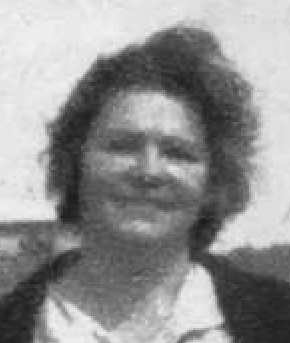
1958
|
Berg-Stichting, Laren | Berg-Stichting, Laren (North Holland) |
7.4.1915
Groningen Dutch |
Wilhelmina van Dam (Chambon, later: Malka Admon) was born on April 7, 1915, in Groningen, Netherlands, the daughter of Frouktje van Dam, a cigar maker. She had three sisters: Anna, Christina, and Meta Gesine.
This profile is private.
Contact us to gain access to this profile. |
|
Cohen, Justus

|
Mizrachi Kibbutz Dat veEretz, Beverwijk Vereeniging "Dat Waarez" (Bachad) |
Amsterdam | Amstellaan 235 |
28.3.1918
Groningen Dutch |
Justus Hartog Cohen (later: Tzadok Cohen) was born on March 28, 1918, in Groningen, the son of Levie Cohen (Levie Yehuda Abrahams Cohen) and Flora Steren. He had a brother who died young, Abraham (1904-1919), and two sisters, Rebecca (1908) and Channa/Hanny (1905).
This profile is private.
Contact us to gain access to this profile. |
Cohen, Paul

|
The Deventer Association (Utrecht) | UTRECHT | Croeselaan 144 |
15.3.1911
Dinslaken German |
Paul Cohen (later: Jehuda Cohen) was born on March 15, 1911, in Dinslaken, a town in Nordrhein-Westfalen, about 50 miles from the Netherlands. He was the son of Hermann "Chaijim" Cohen, a merchant born in Dinslaken, and Julie Platz. He had three siblings: Hilde (1909), Grete (1913), and Anni (1915). His father died in 1937.
This profile is private.
Contact us to gain access to this profile. |
Cohen, Philipp (Flip)
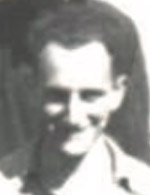
Kibbutz Franeker, Winter 1938-1939
|
Mizrachi Kibbutz Dat veEretz, Beverwijk Vereeniging "Dat Waarez" (Bachad) |
Amsterdam | Kastanjeplein 3 |
30.5.1918
Amsterdam Dutch |
Philip "Flip" Cohen (later: Uri Cohen) was born in Amsterdam on May 30, 1918, the son of Jakob Cohen, from Leeuwarden, and Sara née Brandon, from Amsterdam. Philip had three brothers and three sisters: Izak (1917), Hartog (1920), Keetje (1921), Margaretha (Greetje) (1922), Samuel (Shmuel) (1926), and Mirjam Henriëtte (1931). His father died in 1934 when Philip was 16.
This profile is private.
Contact us to gain access to this profile. |
Cohn, Bernd

|
Werkdorp Wieringermeer | Werkdorp Wieringermeer |
27.5.1919
Berlin German |
Bernd Cohn was born on May 25, 1919, in Berlin, the son of Erich Cohn, a lawyer, and Paula Cohn (née Zade). He had one brother, Klaus Werner (b. 1913).
This profile is private.
Contact us to gain access to this profile. |
|
Cohn, Heinz

|
Werkdorp Wieringermeer | Werkdorp Wieringermeer |
27.2.1920
Berlin German |
Heinz Michel Cohn was born on February 27, 1920, in Berlin, the son of Alex Cohn, a merchant, and Rosa (née Mann). He had two siblings, Feodora (b. 1911) and Werner (b. 1922). His father died in 1927 at the age of 49, "after a long period of severe suffering", when Heinz was seven years old.
This profile is private.
Contact us to gain access to this profile. |
|
Daube, Elie

|
Enschede Hachscharah Agudas Yisroel |
21.1.1915
Königsbach German |
Elie Daube (later: Eliyahu Daube) was born on January 21, 1915, in Königsbach, Baden, the son of Meier (Max) Daube and Sophie née Beissinger, both from Königsbach. He had six siblings: Willie Wolf (1907), Jacob (1908), Hermann Zvi (1909), David (1911), Gershon (1912) and Leah (1913).
This profile is private.
Contact us to gain access to this profile. |
||
Dinner, Sara
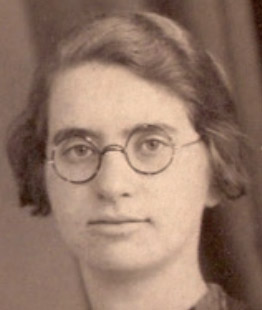
Oct. 1936
|
Mizrachi Kibbutz Dat veEretz, Beverwijk Vereeniging "Dat Waarez" (Bachad) Beverwijk: Velsen-Noord |
Beverwijk: Velsen-Noord |
13.12.1911
Amsterdam Dutch |
Sara Dinner (later: Sara Ben Aharon) was born on December 13, 1911, in Amsterdam, the daughter of Israel Dinner, from Amsterdam, and Henrietta Auerbach, from Halberstadt. She was the eldest of four children. She had three siblings: Lea (1913), Joseph Hirsch (1915) and Esther (1920).
This profile is private.
Contact us to gain access to this profile. |
|
Ebel, Siegismund

|
The Deventer Association (Amsterdam) | Amsterdam | "De Vondelhof" Frederikstr. 18 Amsterdam" |
28.7.1915
Beuthen German |
Siegismund Ebel (later: Shmuel Ebel) was born on July 28, 1915, in Beuthen, Germany, (now Bytom, Poland), the son of Emil Ebel, an insurance agent, and Else Goldstein. He had five siblings, including Kathe (1901), Bernhard (1904) and Charlotte Naomi (1907).
This profile is private.
Contact us to gain access to this profile. |
Englard, Leo
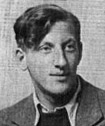
1940
|
Werkdorp Wieringermeer | Werkdorp Wieringermeer |
7.7.1921
Przemyśl German* |
Leo Englard (later: Arieh Englard) was born on July 7, 1921, in Przemyśl, Austrian Galicia (now Przemyśl, Poland), the son of Hermann Englard and Cilla, née Dominitz, from Radymno, Jarosław in Galicia (now Poland). He had a twin sister, Berta Chaja (1921). His father died in December 1936, when Leo was 15 years old.
This profile is private.
Contact us to gain access to this profile. |
|
Fischer, Ernst Jacob

|
(Almen: Het Laren) | ALMEN: Het Laren | p.a. Woestenenk |
17.8.1918
Frankenthal German |
Ernst Jacob Fischer was born on August 17, 1918, in Frankenthal.
This profile is private.
Contact us to gain access to this profile. |
Förder, Ernst

Kibbutz Franeker, Winter 1938-1939
|
Kibbutz Misrachi, Franeker | Franeker, Harlingerweg 45 (Kibbutz Misrachi) |
8.1.1918
Beuthen German |
Ernst Foerder (later: Schlomo Porat) was born on January 8, 1918, in Beuthen, Upper Silesia (now Bytom, Poland), the son of Jakob (Jacques) Foerder, from Rybnik, and Anni née Froehlich, from Königshütte. He had one sister, Ruth (1910, Breslau).
This profile is private.
Contact us to gain access to this profile. |
|
Friedman, Meir
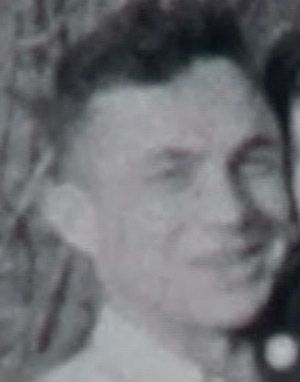
|
Mizrachi Kibbutz Dat veEretz, Beverwijk Vereeniging "Dat Waarez" (Bachad) |
5.11.1917
Postawie Polish * |
Meir Friedman (later: Meir Bar Shalom) was born on November [other sources: December] 5, 1917, in Postavy, Lithuania (later Poland, now Pastavy, Belarus), the son of Yaakov Friedman and Adelaide. He had four siblings: Moshe, Hanoch, Lea, and (unknown).
This profile is private.
Contact us to gain access to this profile. |
||
Geisel, Siegfried

|
Werkdorp Wieringermeer | Werkdorp Wieringermeer |
6.10.1910
Bullay German |
Siegfried Geisel was born on October 6, 1910, in Bullay, a village in Rhineland-Palatinate roughly 30 miles from the Luxembourg and Belgian borders.
This profile is private.
Contact us to gain access to this profile. |
|
Goldbach, Ilse

|
Mizrachi Kibbutz Dat veEretz, Beverwijk Vereeniging "Dat Waarez" (Bachad) |
Beverwijk: Velsen-Noord |
25.11.1914
Marktbreit, Germany German |
Ilse Goldbach (later Elsa Horin) was born on November 25, 1914, in Marktbreit, a small town near Frankfurt, the daughter of Abraham Goldbach, originally from Unterriedenberg, and Carla née Blum, from Burgpreppach. She had (at least) two siblings: Fritz (1919) and Martha (1921).
This profile is private.
Contact us to gain access to this profile. |
|
Goldschmidt, Arno

|
Werkdorp Wieringermeer | Werkdorp Wieringermeer |
25.8.1907
Rixdorf (Berlin-Neukölln) German |
Arno Goldschmidt (later: Asher Goldschmidt) was born on August 25, 1907, in Rixdorf (Berlin-Neukölln), the son of Hermann Hirsch Goldschmidt, from Danzig, and Lisbeth (Elisabeth), née Mandel, from Posen. He had one brother, Rudi Rafael (1909).
This profile is private.
Contact us to gain access to this profile. |
|
Goldschmidt, Julius, Ernst

|
Werkdorp Wieringermeer | Werkdorp Wieringermeer |
30.03.1920
Berkach German |
Ernst Julius Goldschmidt was born on March 30, 1920 in Berkach, Thuringia. Berkach, a small village in Thuringia with a population of 400 to 500 residents, had a significant Jewish presence since the 17th century, with a synagogue, a Mikveh, a school, and a cemetery. At times, up to half of Berkach’s population was Jewish.
This profile is private.
Contact us to gain access to this profile. |
|
Goldstein, Lilo (Lieselotte)

|
Werkdorp Wieringermeer | Werkdorp Wieringermeer |
12.2.1918
Berlin German |
Lieselotte Goldstein (later Lilo Tachauer) was born on February 12, 1918, in Berlin, the daughter of Jacob and Julia Goldstein (née Levin). She had two brothers: Rudolf (Rudi) (1908), and Hans (Tuvya) (1912).
This profile is private.
Contact us to gain access to this profile. |
|
Gottlieb, Mary
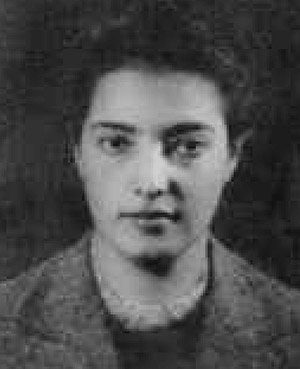
1946
|
Werkdorp Wieringermeer | Werkdorp Wieringermeer |
15.12.1921
Vienna German (Austrian) |
Mary Gottlieb (later: Miriam Weisskopf) was born on December 15, 1921, in Vienna, the only child of Mendel Emanuel Gottlieb, originally from Sieniawa, Galicia (now Poland), and Ester Gittel née Bohm, from Ottynia, Galicia (now Ukraine).
This profile is private.
Contact us to gain access to this profile. |
|
Goudsmit, Marianna

|
The Deventer Association (Amsterdam) | Amsterdam | Pres. Brandtstr. 74 |
13.9.1918
Amsterdam Polish |
Marianna Goudsmit (later: Marianna Pridan) was born on September 13, 1918, in Amsterdam, the daughter of Philip Goudsmit and Jette Israels. She had four siblings: Eliëzar (1917), Leentje (1920), Jonat Janos (1922), and Mozes (1923). Her father died in 1930 when she was 12 years old.
This profile is private.
Contact us to gain access to this profile. |
Griver, Norris
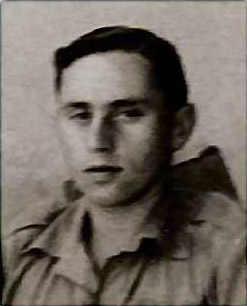
1940
|
The Deventer Association |
25.5.1915
London British |
Norris Griver was born on May 25, 1915, in Bethnal Green, in the East End of London, the son of a Russian father, Davy Griver, and a British mother, Dora Simmons. He had four siblings: Asher (1913), Gertrude (1920), Miriam Rivka (1923), and (?).
This profile is private.
Contact us to gain access to this profile. |
||
Gross, Simon

|
Werkdorp Wieringermeer | Werkdorp Wieringermeer |
14.5.1918
Vienna German (Austrian) |
Simon Gross (later: Shimon Gross) was born in Vienna on May 14, 1918, the son of leo (Leib) Gross, from Nadworna (now Nadvirna, Ukraine) and Scheindel Gross (née Schreier), from Bohorodchany (Ukraine). He had five siblings: Igo (Israel) (1897), Rosa (Reizel) (1899), Thea (Taube) (1901), Munio (Mojzesz) (1903), and Max (Markus) (1905).
This profile is private.
Contact us to gain access to this profile. |
|
Grünberger, Philip

|
The Deventer Association (Assumburg) | Assumburg: Heemskerk | Assumburg Youth Hostel, Heemskerk |
3.1.1913
Boskowitz German |
Philip Grünberger was born on January 3, 1913, in Boskowitz, Moravia, Austria-Hungary (now Boskovice, Czech Republic), the son of Max Mordechai Grünberger, from Trebitsch, Moravia (now Třebíč, Czech Republic), and Josefina. He had one brother, Josef, born on August 4, 1917. His mother died three days later, on August 7, when Philip was four years old. In November 1923, his father married Gisela Werner-Bock.
This profile is private.
Contact us to gain access to this profile. |
Grünpeter, Martin
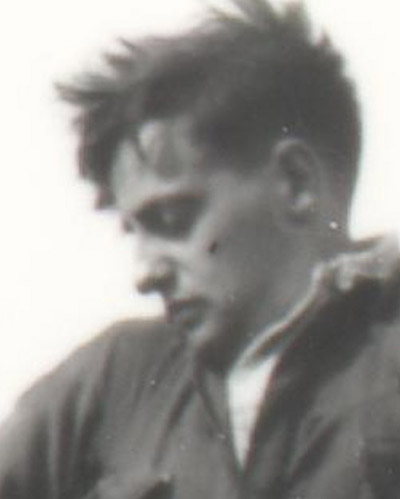
Photo: Roman Vishniac.
|
Werkdorp Wieringermeer | Werkdorp Wieringermeer |
12.1.1914 Breslau Stateless [German] |
Martin Grünpeter (later: Mordechai Sela) was born on January 12, 1914, in Breslau, to Emil Grünpeter, from Koenigshuette, and Recha Juliusburger, from Kattowitz. He had two sisters, Hanni (1918), and Naomi (ca 1920).
This profile is private.
Contact us to gain access to this profile. |
|
Gusdorf, Hans Rudolf

|
Werkdorp Wieringermeer | Werkdorp Wieringermeer |
10.4.1921
Berlin German |
Hans Rudolf Gusdorf (later: Reuven Gidron) was born in Berlin on April 10, 1921, the son of Max Gusdorf, from Detmold, and Helena née Oppenheimer. Hans had an elder sister, Erika (1910).
This profile is private.
Contact us to gain access to this profile. |
|
Gutmann, Gustav Gerhard

|
Werkdorp Wieringermeer | Werkdorp Wieringermeer |
28.9.1920
Berlin German |
Gustav Gerhard Gutmann was born on September 28, 1920, in Berlin, the son of Gustav Gutmann and Berta née Lewin. He had two siblings: Hildegard (1902) and Heinz (1908). A sister, Anneliese (1907), died in 1918.
This profile is private.
Contact us to gain access to this profile. |
|
Guttmann, Heinemann

|
Enschede Hachscharah Agudas Yisroel |
13.12.1915
Burgpreppach German |
Heinemann Gutmann (later: Elhanan Gutman) was born on December 13, 1915, in Burgpreppach, the son of Meier Max Gutmann, and Amalia Emanuel. He had four siblings: Betty (1914), Sara (1916), Zipora (1920) and Leo Eliezer (1923).
This profile is private.
Contact us to gain access to this profile. |
||
Haas, Edwin

|
Werkdorp Wieringermeer | Werkdorp Wieringermeer |
13.1.1920
Mannheim German |
Edwin ("Edde") Haas (later: Gad Haas) was born on January 13, 1920, in Mannheim, Germany, the son of Karl Haas and Anna Kayem. He had two siblings: Gertrud (1915), and a twin sister Lily (1920). His father died in 1927 when Edwin was 7 years old.
This profile is private.
Contact us to gain access to this profile. |
|
Heineberg, Walter

|
Werkdorp Wieringermeer | Werkdorp Wieringermeer |
28.7.1920
Düsseldorf German |
Walter Heineberg (later: Gabriel Heinberg) was born in Düsseldorf on July 28, 1920, the son of Paul Heineberg and Anna Weinberg. He had one sister, Liesel (1913).
This profile is private.
Contact us to gain access to this profile. |
|
Hirsch, Eva

|
The Deventer Association (Apeldoorn) | Apeldoorn: "Het Apeldoornsche Bosch" |
15.9.1916
Berlin German |
Eva Ilse Hirsch (later: Chava Wolff) was born on September 15, 1916, in Berlin, the daughter of Paul Hirsch and Else Mathilde, née Dresel. She had a twin sister, Ruth. Her mother died in 1934 when Eva was 14 years old.
This profile is private.
Contact us to gain access to this profile. |
|
Hirsch, Issy
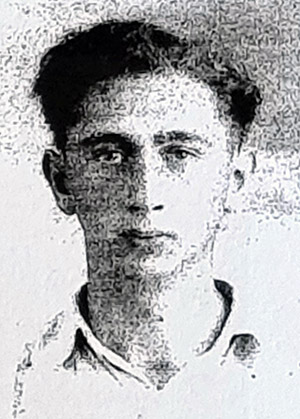
1939
|
Enschede Hachscharah Agudas Yisroel |
13.11.1919
Düsseldorf German |
Issy Hirsch (later: Yitzhak Hirsch) was born on November 13, 1919, in Düsseldorf, the youngest child of Avigdor Hirsch, and Guste Gittel Sprei, both from Galicia. He had three siblings: Benno Ben Zion (1909), Yvonne (1911), and Abraham Rudy (1913).
This profile is private.
Contact us to gain access to this profile. |
||
Hirsch, Manfred

|
Werkdorp Wieringermeer | Werkdorp Wieringermeer |
29.3.1920
Berlin German |
Manfred Hirsch (later: Moshe Raphaeli) was born on March 29, 1920, in Berlin, the son of Raphael and Dora Hirsch.
This profile is private.
Contact us to gain access to this profile. |
|
Hochberger, Abraham

|
Mizrachi Kibbutz Dat veEretz, Beverwijk Vereeniging "Dat Waarez" (Bachad) |
Beverwijk: Velsen-Noord |
21.6.1918
Vienna German |
Abraham Hochberger was born on June 21, 1918, in Vienna, the son of Zacharias Binder Hochberger, and Perl Berta Blumenkranz. Avraham had at least seven siblings: Nathan (born in Bobowa, 1902), Simon (born in Bobowa, 1903), Josef (1913), Moritz (1914), Isaak (1916), Jette (Jetti), and Rose.
This profile is private.
Contact us to gain access to this profile. |
|
Hoffmann, Heinz

|
Mizrachi Kibbutz Dat veEretz, Beverwijk Vereeniging "Dat Waarez" (Bachad) |
Beverwijk: Velsen-Noord |
6.11.1916
Schreiberhau German |
Heinz Hoffmann (later: Haim Bar-Tikva) was born on November 6, 1916, in Schreiberhau, Lower Silesia (now Szklarska Poreba, Poland), the son of Julius Joseph Hoffmann, originally from Elberfeld, and Clara Richter, from Leipzig. He had one sister, Anni (Helena) (1918).
This profile is private.
Contact us to gain access to this profile. |
|
Horowitz, Marcus (Max)

|
Werkdorp Wieringermeer | Werkdorp Wieringermeer |
17.1.1914
Frankfurt German |
Marcus (Max) Horowitz (later: Mordechai Horowitz) was born on January 17, 1914, in Frankfurt am Main, the son of Rabbi Dr. Jakob Horovitz, from Lauenburg (Pomerania), and Charlotte (Lotte), née Wiener, from Katowice. He had four siblings: Emmi (1908), Josef (1910), Ruth (1911), and Siegfried (Menachem) (1920).
This profile is private.
Contact us to gain access to this profile. |
|
Israel, Manfred

|
Werkdorp Wieringermeer | Werkdorp Wieringermeer |
7.9.1920
Schlawe German |
Manfred Israel (later: Moshe Israel) was born on September 7, 1920, in Schlawe, a small town in Pomerania near the Baltic Sea (now Sławno, Poland), the son of Samuel (Sally) Israel, a merchant from Friedrichsbruch (Prussia, now Poland), and Paula Israel (née Klahr), originally from Zolondowo, Poland. He had one sister, Inge Charlotte (1924).
This profile is private.
Contact us to gain access to this profile. |
|
Jacob, Leopold Siegfried

|
The Deventer Association (Assumburg) | Assumburg: Heemskerk |
10.6.1917
Berlin German |
Leopold Siegfried Jacob was born on June 10, 1917, in Berlin.
This profile is private.
Contact us to gain access to this profile. |
|
Jacobsohn, Ernst

|
Werkdorp Wieringermeer | Werkdorp Wieringermeer |
18.7.1916
Hamburg German |
Ernst Jacobsohn was born on July 18, 1916, in Hamburg, the son of John Jacobsohn, a merchant from Lübeck, and Else Rosenblum, from Salzwedel, Saxony. He had one brother, Manfred (1922).
This profile is private.
Contact us to gain access to this profile. |
|
Jonas, Max Gerhard
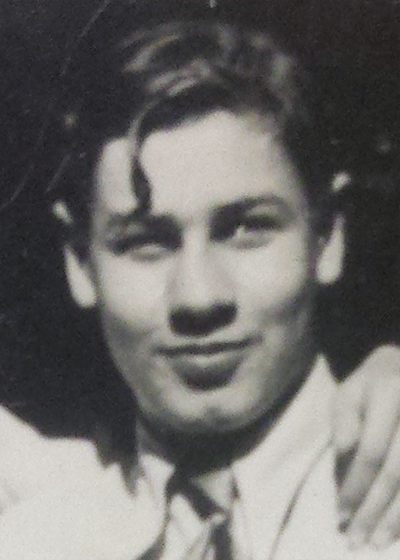
|
Werkdorp Wieringermeer | Werkdorp Wieringermeer |
16.4.1921
Berlin German |
Gerhard Jonas (later: Gershon Jonas) was born on April 16, 1921, in Berlin, the son of Erich Jonas, Dr. PhD, and Annie Gertrud Jonas (née Loewenthal). He had one brother, Peter Lutz (1925).
This profile is private.
Contact us to gain access to this profile. |
|
Kahn, Siegbert

|
Werkdorp Wieringermeer | Werkdorp Wieringermeer |
5.7.1920
Lichtenfels, Germany Stateless |
Siegbert Kahn was born on July 5, 1920, in Lichtenfels, the son of Arthur Kahn, a cattle dealer, and Carry Oppenheimer.
This profile is private.
Contact us to gain access to this profile. |
|
Kampf, Heinrich

|
Werkdorp Wieringermeer | Werkdorp Wieringermeer |
24.2.1915 Vienna German |
Heinrich Kampf (later: Uri Oren*) was born on February 24, 1915, in Vienna, the youngest son of Aaron Adolf Kampf, originally from Opatowice, Poland, and Lea (Laura) Buxdorf, from Brody. He had three siblings: Siegfried (1906), Regina (1908), and Alfred (1911).
This profile is private.
Contact us to gain access to this profile. |
|
Kapelner, Heinrich
|
Werkdorp Wieringermeer | Werkdorp Wieringermeer |
31.3.20
Köln Polish |
Heinrich "Heini" Kapelner (later: Haim Kapelner) was born on March 31, 1920, in Cologne, the son of Yehuda (Juda) Kapelner, from Tarnow, Galicia (now Poland), and Miriam (Marjem), née Westreich Broder, from Brieg, Galicia (now Brzesko, Poland). He had seven siblings: Sarah ("Sally") (1902), Josef (1905), Helena (1907), Minnah (1909), Aron (Arnold) (1912), Ephraim Bernhard (Ferdi) (1914), and Max (1916).
This profile is private.
Contact us to gain access to this profile. |
|
Katz, Albert (Katz, Abraham)

|
The Deventer Association (Weelsche Broek)
(Deventer Association: Papenstraat 45, Deventer) |
Weelsche Broek | Papenstraat 45, Deventer
p.a. Gerritsen |
1.7.1916
Nyirgelse Hungarian |
Albert Abraham Katz was born in Nyírgelse, a village near in Nyírmihálydi in Hungary, on July 7, 1916, the son of Lajos Katz, from Máriapócs, and Eszter née Fellner, from Fényeslitke. He had two siblings: Szerena (1912) and Ferencz (1914)
This profile is private.
Contact us to gain access to this profile. |
Katz, Susi
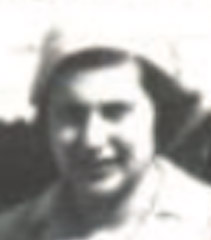
|
Mizrachi Kibbutz Dat veEretz, Beverwijk Vereeniging "Dat Waarez" (Bachad) |
Beverwijk: Velsen-Noord |
25.7.1918
Posen German |
Susi Katz (later: Shulamit Bar-Shalom) was born on July 25, 1918, in Posen, Prussia (now Poznań, Poland), the daughter of Ludwig Katz and Hedwig née Engel. She had one brother, Theodor (Tuvya) (1914). Her father died in 1924, when Susi was 5 years old.
This profile is private.
Contact us to gain access to this profile. |
|
Katzenstein, Gerhard
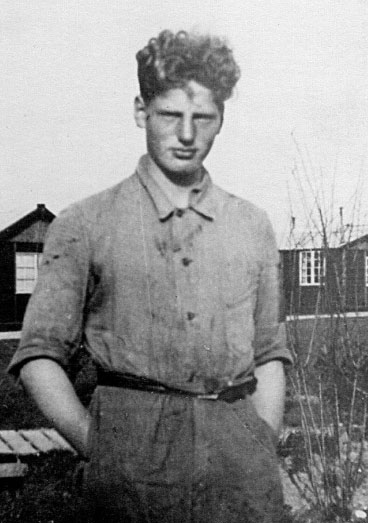
|
Werkdorp Wieringermeer | Werkdorp Wieringermeer |
5.7.1920 Berlin Stateless |
Gerhard Katzenstein (later: Gershom Nevo) was born on July 5, 1920, in Berlin, the son of Simon Katzenstein and Henriette (Jettka) Katzenstein (née Rubin). He had two siblings, Hans Siegmund (1916) and Anna Sophie (1918).
This profile is private.
Contact us to gain access to this profile. |
|
Kaufmann, Ellen

|
Werkdorp Wieringermeer | Werkdorp Wieringermeer |
28.1.1920
Berlin German |
Ellen Margot Kaufmann was born on January 28, 1920, in Berlin, the daughter of Alfred Kaufmann and Paula Lea Adler. The second child in a family of four children, she had two brothers: Ernst (1918) and Herbert Peter (1925) and one sister, Ruth (1923).
This profile is private.
Contact us to gain access to this profile. |
|
Kaufmann, Ernst
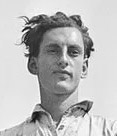
Photo: Roman Vishniac
|
Werkdorp Wieringermeer | Werkdorp Wieringermeer |
22.9.1918
Berlin Stateless |
Ernst Kaufmann (later: Gad Canaan) was born on September 22, 1918, in Berlin, the son of Alfred Kaufmann and Paula Lea Adler. The eldest in a family of four children, he had two sisters, Ellen (1920) and Ruth (1923), and one brother, Herbert Peter (1925).
This profile is private.
Contact us to gain access to this profile. |
|
Klestadt, Hans (Kleestadt)

|
Werkdorp Wieringermeer | Werkdorp Wieringermeer |
19.4.1920
Geseke German |
Hans Klestadt (later: Hanan Keret) was born on April 19, 1920 in Geseke, the son of Berthold Klestadt and Toni née Sahmer. Hans had a younger brother, Bernhard (Bernt) Klestadt (1923).
This profile is private.
Contact us to gain access to this profile. |
|
Kornicker, Peter, J.

|
Werkdorp Wieringermeer | Werkdorp Wieringermeer |
14.12.1917
Breslau German |
Peter Joachim Kornicker (later: Dan Karni) was born on December 14, 1917, in Breslau, the son of Georg Korniker, a lawyer and notary from Breslau, and Herta Cohen. His mother died in 1919 while he was still one year old. His father married Else Hirshel in a second marriage.
This profile is private.
Contact us to gain access to this profile. |
|
Lampelz, Saul

|
Enschede Hachscharah Agudas Yisroel |
27.10.1920
Stuttgart Polish |
Saul Eisig (Isidor) Lampelz (later: Isaac Ben Hanoch) was born on October 27, 1920, in Stuttgart, the son of Enoch Heinrich Lampelz and Udel Fiskus, both originally from Galicia. He was the eldest of five children, his siblings being: Klara (1919), Rose (1922), Julius (1925) and Max Maksymiljan (1928). [possibly four more siblings.]
This profile is private.
Contact us to gain access to this profile. |
||
Landsberger, Walter

|
The Deventer Association (Klarenbeek bij Voorst) | KLARENBEEK bij Voorst | Papenstraat 45, Deventer | 20.3.1920
Goslar German |
Walter Landsberger (later: Zeev Landsberger) was born on March 20, 1920, in Goslar, Germany, the son of William Landsberger and Gertrud née Friedmann. He had one older brother, Max (1915). His mother died two weeks after his birth in April 1920.
This profile is private.
Contact us to gain access to this profile. |
Leefsma, Eduard (Eddy)

|
(Zenderen) | ZENDEREN; near Borne |
31.5.1917 Den Haag Dutch |
Eduard (Eddy) Leefsma (later: Eliahu Leefsma) was born on May 31, 1917, in The Hague, the son of Mozes (Moshe) Leefsma, a commercial agent, and Marianne (Miriam), née Snijders. He had three siblings: Ella (1920), Raphaël (1924), and Fritz (1931). In 1927 the family moved to Amsterdam.
This profile is private.
Contact us to gain access to this profile. |
|
Lesser, Eva

|
The Deventer Association (Assumburg) | Assumburg: Heemskerk |
26.4.1919
Berlin German |
Eva Therese Lesser (later Chava Shomrat) was born on April 26, 1919, in Berlin, the daughter of Robert Lesser, originally from Deutsch Krone, Pomerania (now Wałcz, Poland), and and Flora Mathilde née Ring. She had one brother, Alfred (1916). Her mother died in 1937 when Eva was 18 years old.
This profile is private.
Contact us to gain access to this profile. |
|
Levie, Kurt

|
The Deventer Association (Amsterdam) | Amsterdam |
7.10.1920 Essen [ Dutch ] |
Kurt Levie was born on October 7, 1920, in Essen, the son of Hugo Levie, from Hamburg, and Olga Henriette Schweizer, from Wesel. He had an older brother, Rudy.
This profile is private.
Contact us to gain access to this profile. |
|
Levy, Hans

|
Werkdorp Wieringermeer | Werkdorp Wieringermeer |
6.7.1918
Berlin German |
Hans Levy (later: Hanan Levy) was born on July 6, 1918, in Berlin, the son of Abraham (Adolf) Levy, from Stralkowo, Posen (now Strzałkowo, Poland), and Marta Levy (née Buttermilch), from Lissa, Posen (now Leszno, Poland).
This profile is private.
Contact us to gain access to this profile. |
|
Levy, Ruth

|
Mizrachi Kibbutz Dat veEretz, Beverwijk Vereeniging "Dat Waarez" (Bachad) |
Beverwijk: Velsen-Noord |
22.3.1921
Ahrweiler German |
Ruth Levy (later: Ruth Teichler) was born on March 22, 1921, in Ahrweiler, the only child of Wilhelm Levy, from Ahrweiler, and Recha Kaufmann, from Gambach, Hessen.
This profile is private.
Contact us to gain access to this profile. |
|
Lewinsky, Hans, Arnold

|
Werkdorp Wieringermeer | Werkdorp Wieringermeer |
6.12.1919
Neustettin German |
Hans Arnold Lewinsky (later: Arnold Levinsky) was born on December 6, 1919, in Neustettin, Pomerania (now Szczecinek, Poland), the son of Leo Lewinsky, a merchant from Polzin. and Grete Engel, from Schönlanke (now Trzcianka, Poland). He had one brother, Gerhard (Shlomo) (1914).
This profile is private.
Contact us to gain access to this profile. |
|
Lewinsohn, Curt
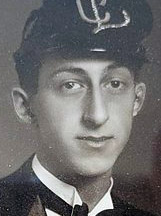
|
The Deventer Association (Assumburg) | Assumburg: Heemskerk | Assumburg Youth Hostel, Heemskerk |
13.12.1912
Osterode German |
Curt Lewinsohn (later: Yoram Ariely) was born on December 13, 1912, in Osterode, Prussia (now Ostróda, Poland), the son of Martin Lewinsohn, from Osterode, and Grete Lewinsohn (née Herzfeld), from Peine, Saxony. He had one sister, Hildegard (Hilda) (1916).
This profile is private.
Contact us to gain access to this profile. |
Litten, Harry

|
Werkdorp Wieringermeer | Werkdorp Wieringermeer |
20.2.1910
Posen German |
Harry Litten was born on February 20, 1910, in Posen, Prussia (now Poznań, Poland), the son of Richard Raphael Litten, from Schneidemühl, Posen (now Piła, Poland) and Gertrud née Loewy, from Moschin, Posen (now Mosina, Poland). He had a brother, Manfred Rolf (1909).
This profile is private.
Contact us to gain access to this profile. |
|
Loeb, Hans
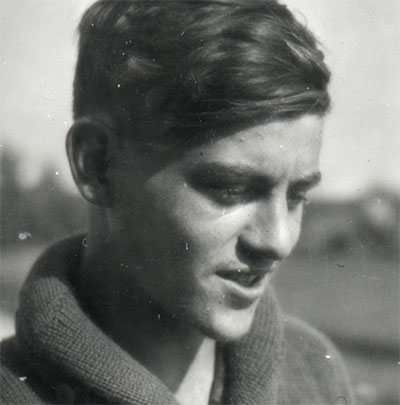
|
Werkdorp Wieringermeer | Werkdorp Wieringermeer |
20.10.1921
Düsseldorf German |
Hans Loeb was born on October 20, 1921, in Düsseldorf, the son of Sali August (Salomon) Loeb, a merchant from Ilvesheim, Baden, and Eleonora (Nora) Maurer, originally from Hagen. He had two siblings, Fritz (1913), and Hannelore (1920).
This profile is private.
Contact us to gain access to this profile. |
|
Loewenthal, Bernhard

|
Werkdorp Wieringermeer | Werkdorp Wieringermeer |
22.7.1920
Schöneberg German |
Bernhard Wolfgang Löwenthal was born on July 22, 1920, in Schöneberg, Berlin.
This profile is private.
Contact us to gain access to this profile. |
|
Loszynski, Ernst

|
The Deventer Association (Hall, bij Eerbeek) | HALL, bij Eerbeek. | p.a. H. J. Maaldering 23. Papenstraat 45, Deventer |
23.4.1919
Breslau* German |
Ernst Loszynski (later: Yitzhak Loszynski) was born on April 23, 1918, in Oschersleben, the son on Nathan Loszynski, a merchant from Schokken, Pomerania (now Skoki, Poland), and Martha, née Hirshfeld, from Bromberg, Posen (now Bydgoszcz, Poland). He had three siblings: Miriam Margarete (1911), Dorothea (1913), and Arno Heinz (1914).
This profile is private.
Contact us to gain access to this profile. |
Luft, Günter

|
The Deventer Association (Amsterdam) | Amsterdam | Topaasstr. 7. p/a. Koopman |
21.9.1912
Lubschau German |
Günter Luft (later: Eliezer Luft) was born on September 21, 1912, in Lubschau, Prussia (now Lubsza, Poland), the son of Paul Ludwig Luft, an innkeeper from Peiskretscham, Silesia (now Pyskowice, Poland), and Selma née Pinczower, from Tworog, Upper Silesia (now Tworóg, Poland). He had four siblings: Joachim (1910), Hanns* (1915), Elfriede (1916), and one more unnamed sibling.
This profile is private.
Contact us to gain access to this profile. |
Mainzer, Alfred
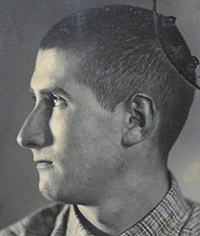
|
The Deventer Association (Hummelo) | HUMMELO | J.E. Hupkes, Op de Kip, A, 109 Hummelo |
25.3.1920
Wissek German |
Alfred Mainzer was born on March 25, 1920, in Wissek, Posen (now Wysoka, Poland), the son of Ernst Mainzer, from Dortmund, and Olga Salomon, from Wirsitz (now Wyrzysk, Poland). He had a twin brother, Herbert Mainzer, and a half-sister, Ruth Leiser (1914).
This profile is private.
Contact us to gain access to this profile. |
Mainzer, Robert
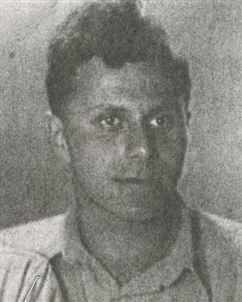
|
Werkdorp Wieringermeer | Werkdorp Wieringermeer |
27.5.1920
Lüdinghausen German |
Robert Mainzer (later: Omri Mainzer) was born on May 27, 1920, in Lüdinghausen, the son of Fritz Schlomo Mainzer, from Dortmund, and Erna Friede, from Lüdinghausen. He had one brother, Hans (Yehuda) (1922). His mother died in January 22, 1930, when Robert was 10 years old. His father later married Bina Muhr.
This profile is private.
Contact us to gain access to this profile. |
|
Maks, Rita

|
The Deventer Association (Assumburg) | Assumburg: Heemskerk |
23.10.1914
Haarlem Dutch |
Heintje Hendrika ("Rita") Maks was born on October 23, 1914, in Haarlem, Holland, the daughter of Gerard Maks, from Banjarmasin, (Dutch East Indies, now Indonesia) and Lea de Klijn, from Amsterdam. She had four sibings: Hendrik Gerrit (1907), Louisa Amalia (1909), Wilhelmina Henrietta Amalia (1913), and Cornelis (1915).
This profile is private.
Contact us to gain access to this profile. |
|
Margulius, Heinz

|
Werkdorp Wieringermeer | Werkdorp Wieringermeer |
28.5.1921
Berlin German |
Heinz Margulius was born on May 28, 1921, in Berlin, the son of Heinrich (Chanan) Margulius, from Znin, Pomerania, Posen (now Poland), and Gertrude Salomon.
This profile is private.
Contact us to gain access to this profile. |
|
Marx, Ernst
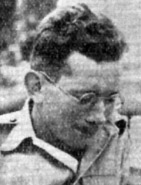 1940's
1940's
|
The Deventer Association (Assumburg) | Assumburg: Heemskerk | Assumburg Youth Hostel, Heemskerk |
30.9.1916
Erfurt German |
Ernst Luitpold Marx (later Eliyahu Marx) was born on September 30, 1916, in Erfurt, Thuringia, the son of Gabriel Marx and Emma née Schönfeld, both from Mainz.
This profile is private.
Contact us to gain access to this profile. |
Masur, Klaus

|
Werkdorp Wieringermeer | Werkdorp Wieringermeer |
29.2.1920
Breslau German |
Klaus Masur was born on February 29, 1920, in Breslau.
This profile is private.
Contact us to gain access to this profile. |
|
Matuszak, David (Mattuscak)

|
The Deventer Association (Assumburg) | Assumburg: Heemskerk | Assumburg Youth Hostel, Heemskerk |
24.7.1917
Gelsenkirchen Polish |
David Matuszak was born on July 24, 1917, in Gelsenkirchen, the son of Hendryk Chaim Matuszak, from Kalisz (Poland), and Berta née Gady, from Pabianice (Poland). He had three older siblings born in Kalisz: Hermann (1911), Frieda (Franja) (1913), and Abraham (1915), and four younger ones born in Gelsenkirchen: Fanny (1919), Max (1921), Cecilia (Cäcilie) Cilli (1923), and Adele (1927).
This profile is private.
Contact us to gain access to this profile. |
Mendelsohn, Kurt

|
Werkdorp Wieringermeer | Werkdorp Wieringermeer |
31.1.1921
Gross-Strelitz German |
Kurt Mendelsohn was born on January 31, 1921, in Gross-Strelitz , Upper Silesia (now Strzelce Opolskie, Poland).
This profile is private.
Contact us to gain access to this profile. |
|
Meyer, Behrend

|
Mizrachi Kibbutz Dat veEretz, Beverwijk Vereeniging "Dat Waarez" (Bachad) |
Beverwijk: Velsen-Noord |
26.2.1914
Hamburg German |
This passenger's name is listed on three separate pages each time with a different variation: |
|
Münzer, Walter

|
The Deventer Association (Assumburg) | Assumburg: Heemskerk | Assumburg Youth Hostel, Heemskerk |
28.4.1912
Berlin German |
Walter Münzer was born on April 28, 1912, in Berlin, Germany, the son of Max Münzer, from Popelken, East Prussia (now Prudovka, an abandoned locality in Kaliningrad Oblast, Russia), and Hedwig Dzialowsky, from Kempen, Posen (now Kępno, Poland). He had one sister, Dorothea (1913).
This profile is private.
Contact us to gain access to this profile. |
Naftalie, Erich
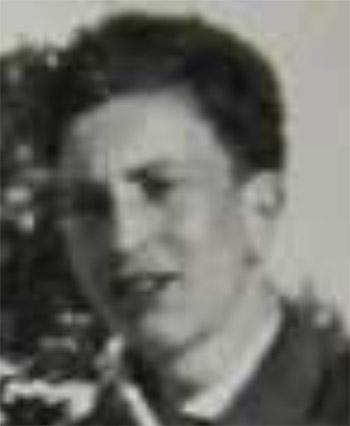
|
Werkdorp Wieringermeer | Werkdorp Wieringermeer |
8.5.1920 Dortmund German |
Erich Naftalie was born on May 8, 1920, in Dortmund, the son of Wilhelm Naftalie, originally from Soldau, Pomerania (now Działdowo, Poland), and Rosa Naftaniel, originally from Lautenburg (now Lidzbark, Poland). He had a younger brother, Hans Claus Naftalie (1930).
This profile is private.
Contact us to gain access to this profile. |
|
Nattenheimer, Kurt
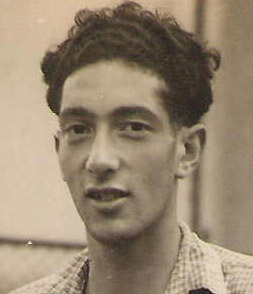
Ellguth, 1937
|
The Deventer Association (Hasselo) | HASSELO 5 | p.a. Sanderman Papenstraat 45, Deventers |
4.8.1920
Hamburg German |
Kurt Nattenheimer (later: Aricha "Langer" Netta) was born on August 4, 1920, in Hamburg, the son of Siegfried Nattenheimer, from Regensburg, and Erna Speyer, from Göttingen.
This profile is private.
Contact us to gain access to this profile. |
Niederman, Simon E.
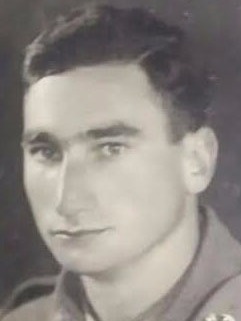
ca. 1941-1944
|
Werkdorp Wieringermeer | Werkdorp Wieringermeer |
8.9.1920
Frankfurt German |
Simon Ernst Niederman (later: Shimon Navon) was born on September 8, 1920, in Frankfurt am Main, the son of Ferdinand Niedermann, from Sindolsheim, Baden, and Hedvic, née Strauss, from Frankfurt. He had one brother, Issak Kurt (1922).
This profile is private.
Contact us to gain access to this profile. |
|
Noafeld, Wolfram

|
Werkdorp Wieringermeer | Werkdorp Wieringermeer |
2.4.1921
Königsberg German |
Wolfram Noafeld was born on April 2, 1921, in Königsberg (now Kaliningrad, Russia), the son of Aharon.
This profile is private.
Contact us to gain access to this profile. |
|
Nussbaum, Paul, Karl

|
Werkdorp Wieringermeer | Werkdorp Wieringermeer |
27.3.1920
Berlin German |
Paul Nussbaum (later: Yoram Nussbaum) was born on March 27, 1920, in Berlin, the son of Sigmar Otto Nussbaum, from Mühlhausen, Thuringia, and Sophie née Mayer, from Gross Steinheim, Offenbach am Main. He had an older brother.
This profile is private.
Contact us to gain access to this profile. |
|
Ochs, Rudolf

|
The Deventer Association (Ellecom) | ELLECOM | G. Frederiks, Binnenweg 25, Ellecom Frederiks. p.a. |
30.6.1918
St. Ingwert German |
Rudolf "Rudi" Ochs was born on June 30, 1918, in Sankt Ingbert, Saarland, the son of Theodor Ochs, from Gemünden, Hunsrück, and Pauline (Paula) Scholem, from Odernheim am Glan. He had two siblings: Eva (1914) and Erich (1920).
This profile is private.
Contact us to gain access to this profile. |
Oppenheimer, Markus
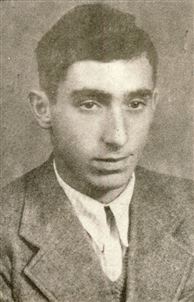
|
Mizrachi Kibbutz Dat veEretz, Beverwijk Vereeniging "Dat Waarez" (Bachad) |
Beverwijk: Velsen-Noord |
15.8.1919
Marktbreit German |
Markus Oppenheimer (later: Mordechai Oppenheimer) was born on August 15* 1919, in Marktbreit, Bavaria, the son of Issachar Bernhard Oppenheimer, a teacher from Marktbreit, and Klara, née Levy. He was the twelfth child out of fifteen. His siblings were: Jacob (1902), David (1908), twin sisters Gitta and Ester (1909), Gertel (1910), Avraham (1914), Samuel (1916), Tzilla (1922), Tamar (1923), Naftali (1925). His father died around 1925 when Markus was about 6 years old.
This profile is private.
Contact us to gain access to this profile. |
|
Oppenheimer, Walter

|
Mizrachi Kibbutz Dat veEretz, Beverwijk Vereeniging "Dat Waarez" (Bachad) |
Beverwijk: Velsen-Noord |
30.12.1917
[Frankfurt a. Main] [German] Stateless |
Walter Oppenheimer (later: Yaakov Oppenheimer) was born on December 30, 1917, in Frankfurt am Main, the son of Joseph Seligman Oppenheimer, from Nieder-Mockstadt near Frankfurt, and Josephina Veronica née Jacobson, from Amsterdam. He had six siblings: Elisheva (1915), Fanny Betty (1916), Ruth (1917), Leopold (1919), Isaac (1922), and Erich Kurt (Yehuda) (1925).
This profile is private.
Contact us to gain access to this profile. |
|
Pollak, Edmund

|
The Deventer Association (Voorst) | VOORST | Gasthuismolensteeg 14, Amsterdam |
23.11.1913
Vienna German (Austrian) |
Edmund Pollak was born on November 23, 1913, in Vienna, the son of Berthold Pollak, and ironmonger from Gross-Schützen in Burgenland, Austria (now Nagy-Lévárd, Hungary), and Julie (Jolanka) Blau, from Pressburg (now Bratislava). He had five siblings: Wilhelm (1905), Hans (1907), Lina (1908), Erwin (1911), and Franz (1918).
This profile is private.
Contact us to gain access to this profile. |
Radzewski, Bernd
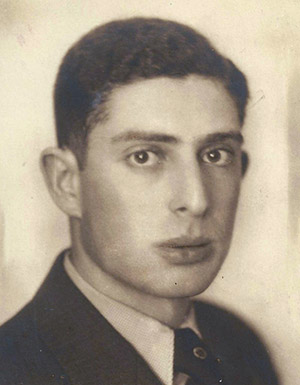
|
Werkdorp Wieringermeer | Werkdorp Wieringermeer |
14.3.1916
Wriezen German |
Bernd Radzewski (later: Benjamin Radchewski) was born on March 14, 1916, in Wriezen, Brandenburg, 70 km east of Berlin, the son of David Radzewski, from Landsberg, East Prussia, (now Górowo, Poland) and Frieda Neustadt, from Kreis Rawitsch, Posen, Prussia (now Rawicz, Poland). He had a twin sister, Meta.
This profile is private.
Contact us to gain access to this profile. |
|
Rath, Simon
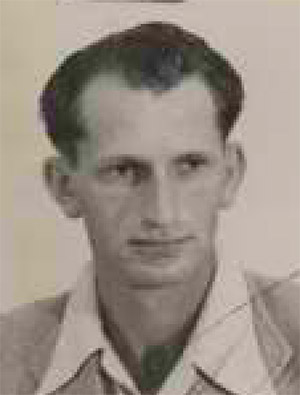
1946
|
The Deventer Association (Assumburg) | Assumburg: Heemskerk | Assumburg Youth Hostel, Heemskerk |
31.8.1919
Stanislawo Stateless |
Simon Rath (later: Shimon Rath) was born on August 31, 1919, in Stanislawów (formerly Austro-Hungarian Empire, now Ivano-Frankivsk, Ukraine), the son of Nathan Rath and Mina Stopper, both from Ivano-Frankivsk. Simon had three siblings: Erna (1910), Rubin Hersch (1908), and Gerson (1913).
This profile is private.
Contact us to gain access to this profile. |
Rawet, Samuel
|
Mizrachi Kibbutz Dat veEretz, Beverwijk Vereeniging "Dat Waarez" (Bachad) |
Beverwijk: Velsen-Noord |
12.2.1918
Altona Polish |
Samuel (Shmuel) Rawet was born on February 12, 1918, in Altona, the son of Jakob David Rawet, from Stopnica, Poland, and Hanna Gitel née Brendzel, from Staszów (Congress Poland, now Poland). He had eight siblings: Sarah (Sarla) (1904), Reizla (Lea) (1907), Heinrich (Heini, Chaim) (1911), Avraham (1913), Elias (Eliahu) (1914), Hermann-Max (Menachem Tzvi) (1916), Paula Regina (1921), and Jütta (1926).
This profile is private.
Contact us to gain access to this profile. |
|
Reens, Elias
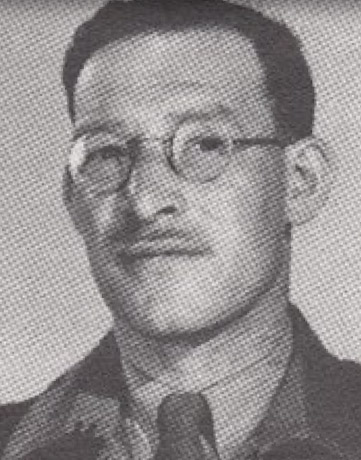
|
Mizrachi Kibbutz Dat veEretz, Beverwijk Vereeniging "Dat Waarez" (Bachad) |
Amsterdam | Pl.Muidergr. 27 |
3.10.1913 Amsterdam Dutch |
Elias Reens (later: Eliyahu Reens) was born on October 3, 1913, in Amsterdam, the son of Levie (Louis Yehuda) Reens and Duifje (Dvora) Waagenaar. His father was a diamond cutter from Amsterdam. He had two brothers, Asher (1909) and Alexander (1918). His mother died in September 1932, when Elias was 18 years old.
This profile is private.
Contact us to gain access to this profile. |
Riez, Hermann

Kibbutz Franeker
|
Mizrachi Kibbutz Dat veEretz, Beverwijk Vereeniging "Dat Waarez" (Bachad) |
Beverwijk: Velsen-Noord |
9.9.1920
Miskolcz Hungarian |
Hermann Riez (later: Zvi Nachman Riez) was born on September 9, 1920, in Miskolcz (Miskolc, Miszkolc), Hungary, the son of Elek Eliahu Riez, a merchant from Transylvania, Romania, and Ilona (Khaia Helen) Rapaport, from Tokaj, Hungary. He had two siblings: Simon Meshulam (1910), and Etel (Etelka, Ester) (1916).
This profile is private.
Contact us to gain access to this profile. |
|
Roodveldt, Jakob
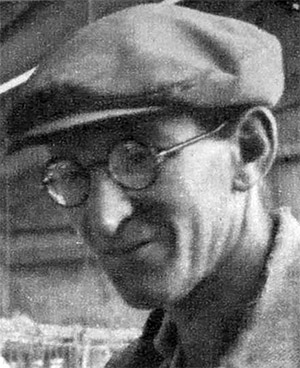
1958
|
Berg-Stichting, Laren | Berg-Stichting, Laren |
3.9.1915
Amsterdam Dutch |
Jakob Roodveldt (later: Yacov Admon) was born on September 3, 1915, in Amsterdam, the son of Levie Isaac* (Yehuda) Roodveldt, a merchant from Amsterdam, and Heintje (Heni) van Thijn, both from Amsterdam. Jakob had five siblings: Izak (1912), Mietje (Miriam, 1914), Anna (1917), Samuel (1918), and Abraham (1921).
This profile is private.
Contact us to gain access to this profile. |
|
Roodveldt, Mietje

|
Mizrachi Kibbutz Dat veEretz, Beverwijk Vereeniging "Dat Waarez" (Bachad) |
Amsterdam |
5.5.1914
Amsterdam Dutch |
Mietje (Miriam) Roodveldt was born on May 5, 1914, in Amsterdam, the daughter of Levie Isaac (Yehuda) Roodveldt, a merchant from Amsterdam, and Heintje (Heni) van Thijn, both from Amsterdam. Mietje had five siblings: Izak (1912), Jakob (1914), Anna (1917), Samuel (1918), and Abraham (1921).
This profile is private.
Contact us to gain access to this profile. |
|
Rooz, Isaak
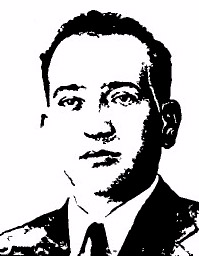
1952, FBI file
|
Mizrachi Kibbutz Dat veEretz, Beverwijk Vereeniging "Dat Waarez" (Bachad) |
Beverwijk: Velsen-Noord |
22.2.1919* (14.2.1919) [ Fehérgyarmat ] Hungarian |
Isaak Rooz (later: Yitzhak Vardi) was born on February 14, 1919* in Fehérgyarmat, Hungary, the son of Lajos (Eliezer) Rooz, from Gyüre, and Cecilia (Czili, Tzilla, Tzirel) née Hirschfeld, from Fulesd, two villages in the Szatmár region. He had nine siblings: Jeno (Jenö, Yeno (Yaakov) (1906, in Fulesd), Maria (Miriam) (1907, in Fulesd), Rozalia (1909, in Fulesd), Vilmos (1911-1933), Mor (Moshe) (1913, in Fehergyarmat), Andor (Avraham Aron) (1915, in Fehergyarmat), Joseph (1920), Anna (Anchi) (1922), and Katalin (1925, in Fehergyarmat). His father died in Fehérgyarmat in 1928, when Isaak was 9 or 10 years old.
This profile is private.
Contact us to gain access to this profile. |
|
Rosen, Bernhard

|
Enschede Hachscharah Agudas Yisroel |
15.11.20
Magdeburg Stateless |
Bernhard Rosen was born on November 15, 1920, in Magdeburg, the son of Jakob Schulim Rosen Weinberg, from Zdunska, and Rachel née Landsberg, from Tomaszow. Bernhard had two brothers: Chaim Heinrich Heini (1918) and Moritz (1924).
This profile is private.
Contact us to gain access to this profile. |
||
Rosenberg, Heinz

|
Werkdorp Wieringermeer | Werkdorp Wieringermeer |
29.6.1917
Thorn German |
Heinz Rosenberg (later: Hanan Rosenberg) was born on June 29, 1917, in Thorn (now Torun, Poland), the son of Arthur Rosenberg, a merchant, and Gertrud, née Brenner. His parents were originally from Schwetz in West Prussia (now Świecie, Poland). He had two siblings, Alice (1911), and Lutz (1913), both born in Schwetz. Sometime between 1913 and 1917, the family came to Thorn, about 50 kilometers to the south, where Heinz was born.
This profile is private.
Contact us to gain access to this profile. |
|
Rosenberger, Emil

|
The Deventer Association (Vierakker) | VIERAKKER | H. Wagenvoort, Vierakker |
12.1.1910
Iwan, Hungary German |
Emil Rosenberger (later: Yoram Rosenberger) was born on January 12, 1910, in Iwan (Iván), (Austro-Hungarian Empire, later Hungary), the son of Ignatz Yitzhak Rosenberger and Katharina née Wiener. He had four brothers and a sister, including Adalbert (1907), Jehuda, and Max.
This profile is private.
Contact us to gain access to this profile. |
Rosenblatt, Eli

|
Werkdorp Wieringermeer | Werkdorp Wieringermeer |
30.6.1921
Berlin German |
Eli Rosenblatt (later: Abraham Eli Rosenblatt Karo) was born on June 30, 1921, in Berlin, the son of Leo Yitzhak Yehuda Rosenblatt, from Berlin, and Erna née Karo, from Lautenburg (now Lidzbark, Poland). He had one sister, Matilda (Hilde, Hildchen) (1928).
This profile is private.
Contact us to gain access to this profile. |
|
Rosenfeld, Josef, Joachim (Janos J. ?)

|
The Deventer Association (Assumburg) | Assumburg: Heemskerk | Assumburg Youth Hostel, Heemskerk |
24.12.1913
Breslau German |
Appears on one list as "Janos J. Rosenfeld, Hong" (Hungarian), and as "Josef Joachim Rosenfeld, Hong, 24.12.13, Breslau". Assuming both entries point to the same person. Note that Breslau may denote his place of residence and not his place of birth. This person could also possibly be a sibling of Frieda Fuchs (née Rosenfeld) from Breslau. She had a brother named Hans Joachim Rosenfeld, born in 1913. |
Rottenberg, Luzia

|
Werkdorp Wieringermeer | Werkdorp Wieringermeer |
22.8.1921
Vienna German (Austria) |
Luzia Rottenberg was born on August 22, 1921, in Vienna, the daughter of Markus David Rottenberg from Peremilow, Galicia (now Peremyliv, Ukraine), and Regina (Rebekka) née Nussen from Zloczow, Galicia (now Zolochiv, Ukraine). She had one brother, Fritz Leo (1924).
This profile is private.
Contact us to gain access to this profile. |
|
Rottenberg, Rubin

|
Enschede Hachscharah Agudas Yisroel |
10.12.1915
Berlin Polish |
|||
Ruhemann, Ursula

|
The Deventer Association (Zandvoort) | ZANDVOORT | p.a. Waldeck Breederoodeweg 45 a. |
28.2.1921
Berlin German |
Ursula Ruhemann (later: Ursula Bartur) was born on February 28, 1921, in Berlin, the daughter of Paul Ruhemann (birth name Itzig), and Hanna (Johanna), née Heymann, both from Berlin. She had one sister, Miriam (1923).
This profile is private.
Contact us to gain access to this profile. |
Russ, Günter

|
The Deventer Association (Amsterdam) | Amsterdam | Gasthuismolensteeg 14, Amsterdam | 21.6.1914
Berlin German |
Günter Russ was born on June 21, 1914, in Schöneberg, Berlin, the son of Moritz Russ, originally from Jarocin, Prussia (later Poland), and Jettel, née Kaiser, from Koenigshuette, Silesia (later Chorzów, Poland).
This profile is private.
Contact us to gain access to this profile. |
Sallein, Werner

|
Werkdorp Wieringermeer | Werkdorp Wieringermeer |
8.12.1918 Berlin German |
Werner Joseph Sallein was born on December 8, 1918, in Berlin, the son of Hans (or Johannes) Sallein, a bank clerk, and Julia, née Joseph. He had two siblings: Ruth (1920), and Arno (1923).
This profile is private.
Contact us to gain access to this profile. |
|
Sanders, Adolf
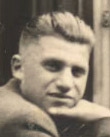
Holland, 1930s.
|
The Deventer Association (Enschede) | ENSCHEDE | Prinsenstraat 12 |
27.2.1917
Arnhem Dutch |
Benjamin Adolf Sanders (later: Amos Sanders) was born on February 27, 1917, in Arnhem, Netherlands, the only child of Johan Ferdinand Sanders, from Sneek, and Klara Gans, from Aalten. His father died in November 1932 when Amos was 15 years old.
This profile is private.
Contact us to gain access to this profile. |
Schelasnitzki, Horst

Kibbutz Franeker, Winter 1938-1939
|
Kibbutz Misrachi, Franeker | Franeker, Harlingerweg 45 (Kibbutz Misrachi) |
1.6.1921
Darkehmen German |
Horst Schelasnitzki (later: Yitzhak Schelasnitzki) was born on June 1, 1921, in Darkehmen, East Prussia (later: Angerapp, Germany, now Ozyorsk, Russia), the son of Bernhard Schelasnitzki, originally from Wielitzken, Kr. Oletzko, East Prussia, (now Wieliczki, Poland), and Selma, née Kuschinski, from Landsberg, East Prussia (now Górowo Iławeckie, Poland). He had two siblings, Marga (1923), and Manfred (1927).
This profile is private.
Contact us to gain access to this profile. |
|
Scheuer, Kurt
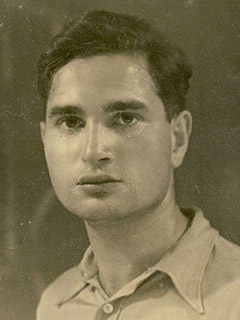
|
Werkdorp Wieringermeer | Werkdorp Wieringermeer |
19.8.1919
Heilbronn German |
Kurt Scheuer (later: Reuven Scheuer) was born in Heilbronn on August 19, 1919, the son of Aaron Albert Scheuer and Emma, née Neu. He had two siblings, Ruth (1912) and Paul Joseph (1915).
This profile is private.
Contact us to gain access to this profile. |
|
Schönebaum, Heinz

|
The Deventer Association (Deventer) | DEVENTER | Papenstraat 45 B. Oosterink, Brinkweg 28, Rheden |
23.4.1917
Heurden German |
Heinz Schönebaum (later: Chanoch Ilan) was born on April 23, 1917, in Dortmund-Hörde, the third child of Emil Schönebaum, from Dortmund-Hörde, and Bertha, née Mueller, from Baden bei Wien in Austria. He had three siblings: Liesel (1912), Alfred (1914), and Gerhard (1919) (Gerd, later Gad Ilan).
This profile is private.
Contact us to gain access to this profile. |
Selka, Hermann

|
Werkdorp Wieringermeer | Werkdorp Wieringermeer |
11.9.1919
Frankfurt am Main German |
Hermann Selka (later: Zvi Selka) was born in Frankfurt am Main on September 11, 1919, the son of Fritz Shlomo Selka, and Sophie, née Kochmann. He had three siblings: Harry (1923), and twins Dorothea (Dorle) (1927) and Alfred (1927) .
This profile is private.
Contact us to gain access to this profile. |
|
Siegel, Kurt
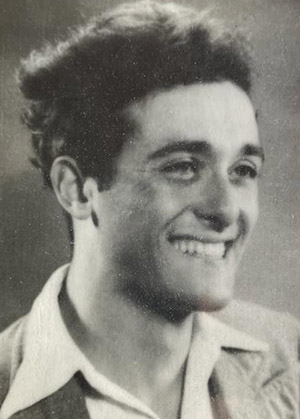
|
Werkdorp Wieringermeer | Werkdorp Wieringermeer |
8.7.1921 Altona German |
Kurt Siegel (later Shimshon Eschel) was born on July 8, 1921, in Hamburg (Altona), the son of Karl Kurt Siegel, from Landau In Der Pfalz, and Berta Lucie, née Fallek, from Hamburg. He had one brother, Gerd (1925).
This profile is private.
Contact us to gain access to this profile. |
|
Sigal, Markus (Segal)

|
Mizrachi Kibbutz Dat veEretz, Beverwijk Vereeniging "Dat Waarez" (Bachad) |
Beverwijk: Velsen-Noord |
29.4.1918* Groningen* Dutch |
Marcus Segal was born on April 29, 1918, in Amsterdam, the son of Abraham Segal, from Amsterdam, and Leentje van Sijs, also from Amsterdam. He had five siblings: Tzipora (1913), Isaac (1916), Sara (1920), Betje (1922), and Reina (1925).
This profile is private.
Contact us to gain access to this profile. |
|
Silberstein, Hermann

|
Werkdorp Wieringermeer | Werkdorp Wieringermeer |
27.1.1921
Berlin German |
Hermann Benjamin Silberstein was born on January, 27, 1921, in Berlin, the son of Karl Silberstein, originally from Posen, Prussia (now Poznan, Poland), and Gertrud, née Herzfeld, from Berlin. He had two sisters, one 20 years older, and the other 11 years older.
This profile is private.
Contact us to gain access to this profile. |
|
Simonis, Heinz

|
(Zeddam) | ZEDDAM | Gasthuismolensteeg 14, Amsterdam |
30.4.1919
Berlin German |
Heinz Simonis (later: Haim Simmons) was born on April 30, 1919, in Berlin, the son of Karl Leo and Margarete Martha Simonis.
This profile is private.
Contact us to gain access to this profile. |
Singer, Ascher

|
Mizrachi Kibbutz Dat veEretz, Beverwijk Vereeniging "Dat Waarez" (Bachad) |
Beverwijk: Velsen-Noord |
26.12.1920 Ustrzyki Polish |
Ascher Singer was born on December 26, 1920, in Ustrzyki Dolne, Poland, the son of Abraham Chaim Singer (previous name: Salik), from Ustrzyki Dolne, and Rachel Schreiber (or Landau?)*. He had two siblings: Dawid (1918), and Esther Erna (1924). His mother died before 1936, and his father presumably married Haindla Ruchla (Rachel) Landau (or Schreiber?)*, from Przemysl.
This profile is private.
Contact us to gain access to this profile. |
|
Singer, Michael

|
The Deventer Association (Assumburg) | Assumburg: Heemskerk | Assumburg Youth Hostel, Heemskerk |
4.2.1912
Baden (Austria) German (Austrian) |
Michael Singer was born in Baden near Vienna on February 4, 1912, the son of Arnold Singer, and Josephine Ernestine Singer (née Schap). Both parents were originally from Bratislava, Slovakia and came to Baden in 1911. Michael had four siblings: Lilli (1914), Edith (1919), Leopold (1921), and Franziska (1933).
This profile is private.
Contact us to gain access to this profile. |
Sondheimer, Ewald
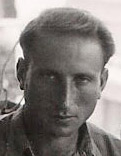
|
The Deventer Association (Amsterdam) | Amsterdam | Frederikstr. I8 a. |
16.8.1919
Neuhof German |
Ewald Sondheimer (later: Shlomo Sondheimer) was born on August 16, 1919, in Neuhof near Fulda, Germany, the son of Nathan Sondheimer, a merchant from Utrichshausen, and Lina Sommer, from Heinebach. He had two older sisters, Elli (1912) and Liesel (1914).
This profile is private.
Contact us to gain access to this profile. |
Sonnenberg, Fritz

|
Werkdorp Wieringermeer | Werkdorp Wieringermeer |
14.8.1921
Koblenz German |
Gerhard Siegfried "Fritz" Sonnenberg was born on August 14, 1921, in Koblenz, the son of Moses Sonnenberg and Irma, née Blum, both from Germany. He had one brother, Paul (1925).
This profile is private.
Contact us to gain access to this profile. |
|
Spatz, Max (Maks)

|
Mizrachi Kibbutz Dat veEretz, Beverwijk Vereeniging "Dat Waarez" (Bachad) |
Beverwijk: Velsen-Noord |
1.4.1920
Worms Polish |
Max Spatz (later: Menachem Spac) was born in Worms on April 1, 1920, the son of Moses (Moritz) Spatz, a merchant originally from Neu-Sandez (Neu-Sandec), Galicia (now Nowy Sącz, Poland), and Beila (Berta, Bertha), née Friedmann, from Będzin (Poland). Max had a twin sister, Rosel (Rosalie) (1920). His mother died in February 1923 when Max was not yet three years old.
This profile is private.
Contact us to gain access to this profile. |
|
Spitzer, Gerda

|
The Deventer Association (Assumburg) | Assumburg: Heemskerk |
26.8.1918
Baden German (Austrian) |
Gerda Spitzer (later: Gerda Cohn) was born on August 26, 1918, in Vienna, the daughter of Dr. Alfred Spitzer and Stefanie Spitzer (née Hauser), originally from Nikolsburg, Czechoslovakia. She had one sister, Erika (1917).
This profile is private.
Contact us to gain access to this profile. |
|
Spuch, Oskar

|
The Deventer Association (Assumburg) | Assumburg: Heemskerk | Assumburg Youth Hostel, Heemskerk |
2.1.1918
Wieden Polish |
Oskar Spuch (later: Yehoshua Shpuch) was born on January 2, 1918, in Vienna, the son of Chiel Mendel Spuch / Treister, from Grodek, and Pepi (Peril Jule) Steinsberg / Gottlieb, from Shinova (Sieniawa), Poland. He had two siblings: Alfred, born in 1911 in Maastricht, Holland, and Rine (Renee), born in 1914 in Vienna. His father died during World War I and Oskar never knew his father.
This profile is private.
Contact us to gain access to this profile. |
Steiner, Ladislaw (Laszlo)

|
The Deventer Association (Deventer) | DEVENTER | Papenstraat 45, Deventer |
5.11.1911
Huedin Hungarian |
Lazlo Ladislaw Steiner was born on November 5, 1911, in Huedin, Austria-Hungary (now Romania). He appears twice on the Dora lists: once as Ladislaw Steiner, Hungarian, born 5.11.11 in Hüdin, then again simply as Lazlo Steiner, Hungarian. In both cases, his address was listed as Papenstraat 45, Deventer. Nothing more is known about him. |
Steinhof, Ludwig

|
The Deventer Association (Gouda) | GOUDA | Catharina-Hoeve,R.v. Catsweg 61, Gouda |
13.11.1917
Mattesburg* German |
Ludwig Steinhof (later: Levi Steinhoff) was born on November 13, 1917 in Mattersdorf, Hungary (now Mattesburg, Austria), the son of Adolf Abraham Aharon Steinhof, a merchant from Mattersdorf, and Sofie (Zisel), née Löbl, from Gloggnitz. He had seven siblings: Paul (Moshe Yehuda) (1904), Phillip (1905), Jolan (Yoland) (1907), Renée (Shoshana) (1909), Hilda (Tzipporah) (1912), Josef Meir (1915-1934), and Adalbert (Shimon) (1921).
This profile is private.
Contact us to gain access to this profile. |
Stern, Günter

|
Werkdorp Wieringermeer | Werkdorp Wieringermeer |
28.9.1921 Breslau German |
Günter Stern (later: Daniel Stern) was born on September 28, 1921, in Breslau, the son of Emil Stern, a merchant from Halle, and Ella Bertha née Just, from Crossen, Prussia (now Krosno Odrzanskie, Poland). He had one brother, Hans Rolf (1920). His father died in February 1928 when Günter was seven years old. His mother later wed Franz Orgler in a second marriage.
This profile is private.
Contact us to gain access to this profile. |
|
Sternberg, Rafael

|
Werkdorp Wieringermeer | Werkdorp Wieringermeer |
4.5.1920
Berlin German |
Rafael Sternberg (later: Rafi Kochavi) was born in Berlin on May 4, 1920, the son of Louis Eugen Sternberg and Rosa Sternberg (née Davidsohn). He had two siblings, the twins Joachim and Miriam (1922).
This profile is private.
Contact us to gain access to this profile. |
|
Sternfeld, Fritz

|
Werkdorp Wieringermeer | Werkdorp Wieringermeer |
15.8.1914
Halle German |
Fritz Wilhelm Sternfeld was born on August 15, 1914, in Halle an der Saale, the son of Max Sternfeld, from Halle, and Helene Leonie (Lea), née Sernau. His mother died in August 1915 when Fritz was only one year old. His father later married Helene Kraft. He had a brother, Hans Adolf (1908), and a half-brother, Walter (1919).
This profile is private.
Contact us to gain access to this profile. |
|
Stoppelmann, Max

|
Mizrachi Kibbutz Dat veEretz, Beverwijk Vereeniging "Dat Waarez" (Bachad) |
Beverwijk: Velsen-Noord |
19.5.1919
Hamburg German |
Max Stoppelmann (later: Meir Stoppelmann) was born on May 19, 1919, in Hamburg, the son of Gerson Stoppelmann and Auguste, née Loebenstein, both from Hamburg. Max had four siblings: Greta (1907), Hedwig (1910), Alfred (1911), and Ilse (1918). Max's mother died in 1935 when he was 16 years old.
This profile is private.
Contact us to gain access to this profile. |
|
Stopper, Arthur

|
Werkdorp Wieringermeer | Werkdorp Wieringermeer |
25.12.1920
Bochum Stateless |
Arthur Stopper was born on December 25, 1920, in Bochum, the son of Leib Leo Stopper, from Solotvyn, and Lotte Rothbaum, from Krekhovychi. His parents originally came from the Ivano-Frankivsk region in Galicia (now Ukraine). He had one younger brother, Sigmund (1922).
This profile is private.
Contact us to gain access to this profile. |
|
Strassburger, Berthold
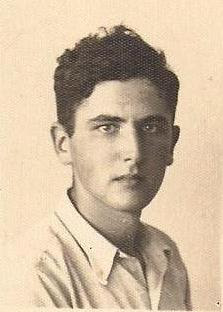
|
Werkdorp Wieringermeer | Werkdorp Wieringermeer |
13.10.1918
Ulm German |
Berthold Strassburger (later: Baruch Savir) was born in Ulm on October 13, 1918, the eldest son of Rabbi Dr. Ferdinand (Nathan) Strasburger and Alice, née Nördlinger, both formerly from Bad Buchau. He had one brother, Helmut (Hanan) (1923).
This profile is private.
Contact us to gain access to this profile. |
|
Strauss, Hans
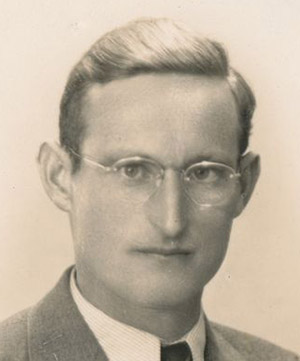
|
Mizrachi Kibbutz Dat veEretz, Beverwijk Vereeniging "Dat Waarez" (Bachad) |
Beverwijk: Velsen-Noord |
8.11.1914
Westerburg* German |
Hans Strauss (later: Chaim Strauss) was born on November 8, 1914, in Westerburg, the son of Salomon Strauss, a cattle trader originally from Willmenrod near Westerburg, and Hanna Strauss (née Michael), from Münchholzhausen. Hans had five siblings: Hanna (1915), Julius (1916), Walter (1921), Kurt (Shmuel) (1923), and Brunhilde (Hilda) (1928).
This profile is private.
Contact us to gain access to this profile. |
|
Strauss, Josef

|
The Deventer Association (Krajenburg bij Hengelo) | KRAJENBURG bij HENGELO | Papenstraat 45, Deventer |
5.4.1916
Bamberg German |
Josef Strauss (later: Yoseph Yaen) was born on April 5, 1916, in Bamberg, the son of Julius Strauß and Rosa, née Katz. He had one brother, Hans (1909).
This profile is private.
Contact us to gain access to this profile. |
Taubes, Mirjam

|
Werkdorp Wieringermeer | Werkdorp Wieringermeer |
13.11.1919
Baden German |
Mirjam Taubes was born on November 30, 1919, in Baden, Austria, a spa town near Vienna, the daughter of Dr. David Taubes, from Babin, Romania, and Breindel Reich. She had one younger sister, Noemi (1922).
This profile is private.
Contact us to gain access to this profile. |
|
Tausz, Jennö

|
The Deventer Association (Assumburg) | Assumburg: Heemskerk | Assumburg Youth Hostel, Heemskerk |
30.7.1918
Pápa Hungarian |
Jennö (Jene) Tausz was born on July 30, 1918, in Pápa, Hungary, a small town 75 miles (120 kms) from Budapest, with a Jewish population of 3,000 in 1920. He came from Budapest on 16 June 1938 to the Deventer Association building at Brink 70 in Deventer. He left for Deurningen a week later. He may have stayed with the Arnold ten Kate family at Deurningen no. 17. He finally came to the Assumburg Youth Hostel in Heemskerk prior to boarding the Dora. No further information is available. Sources: |
Teichmann, Benno

|
Werkdorp Wieringermeer | Werkdorp Wieringermeer |
19.10.1921
Breslau German |
Benno Teichmann was born on October 19, 1921, in Breslau (now Wrocław, Poland), the son of Carl Teichman, from Schreibendorf, and Chaya Anne née Zolotoyabko, from Svir in the Vilna region, Russia (now Belarus). He had three siblings: Käthe (1919), Esther (1920), and Genia "Pozzi" (later: Shulamit) (1927). He had two older half-siblings from his father's first wife, Alfred and Wilma.
This profile is private.
Contact us to gain access to this profile. |
|
Timendorfer, Heinrich

|
The Deventer Association (Amsterdam) | Amsterdam | Uithoornstr. 44 |
7.4.1917
Pless German |
Heinrich Timendorfer (later: Shmuel Timnah) was born on April 7, 1917, in Pless, Schlesien (now Pszczyna, Poland), the son of Arthur Timendorfer, a merchant originally from Kattowitz, Upper Silesia, (now Katowice, Poland), and Johanna (Hanna), née Guttmann, from Tarnowice. He had one brother, Günter Timendorfer (later: Gershon Timnah) (1919).
This profile is private.
Contact us to gain access to this profile. |
van Amerongen, Emil
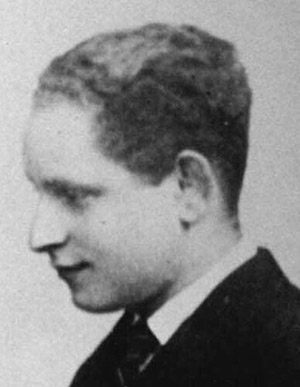
|
The Deventer Association (Buurssen, em. Haaksbergen) | Buurssen (em. Haaksbergen) |
13.6.1918
Haarlem Dutch |
Emanuel ("Emil") van Amerongen (later: Menachem Amram) was born on June 13, 1918, in Haarlem, the son of Abraham van Amerongen, originally from Haarlem, and Saartje (Sara), née Peper, from Amsterdam. He had two siblings, Marie (1913), and Juda (1915).
This profile is private.
Contact us to gain access to this profile. |
|
Verdoner, Alida

|
The Deventer Association (Amsterdam) | Amsterdam |
22.4.1918
Amsterdam Dutch |
Alida Verdoner (later: Eliza Luft) was born on April 22, 1918, in Amsterdam, the daughter of Moses Verdoner, originally from London, and Naatje Zurel, born in Amsterdam. She had nine siblings: Benedictus (1900), Joachim (1902), Jozef Jacob (1904), Marianne (1906), Kaatje (1907), Isaac (1910), Samuel (1911), Nathan (1914) and Abraham (1916). Her mother died in 1932 when Alida was 14 years old.
This profile is private.
Contact us to gain access to this profile. |
|
Wajntrob, Dwojra (Waintrob, Dwoire, Deborah)

|
Mizrachi Kibbutz Dat veEretz, Beverwijk Vereeniging "Dat Waarez" (Bachad) |
Beverwijk: Velsen-Noord |
6.10.1917
Warsaw Polish |
Dwojra Wajntrob was born on October 6, 1917, in Warsaw. In June 1934, she had a work and residence file created by the German Labor Office in Fulda, suggesting that her family had settled in Fulda. She left Germany and came to the Netherlands, where she joined the Kibbutz Dat veEretz hachshara affiliated with Bachad. No other information is available about her or her family. Sources: |
|
Warschawzik, Ernst

|
The Deventer Association (Hengelo) | HENGELO | Deldenerstr. 57 |
4.5.1919
Copenhagen Danzig |
Ernst Warschawzik (later: David "Dudi" Eron), was born in Copenhagen on May 4, 1919, the son of Owssei Chaim Warschawzik, originally from Kovno, Russia (now Kaunas, Lithuania), and Roza, née Schapira, from Danzig. He had two sisters: Mira (1902), and Ruth (1911).
This profile is private.
Contact us to gain access to this profile. |
Weinberg, Karla

|
Werkdorp Wieringermeer | Werkdorp Wieringermeer |
29.6.1909
Hamburg German |
Karla Weinberg (later: Karla Goldschmidt) was born on June 29, 1909, in Hamburg, the daughter of Adolf Weinberg, from Hamburg, and Eva Chava née Lazarus from Altona. Her father, a goldsmith by trade, fought in World War I as an infantry rifleman and was wounded in November 1915. In September 1918, he died after being run over by a locomotive while crossing the railway tracks. At the time Karla was 9 years old.
This profile is private.
Contact us to gain access to this profile. |
|
Weinberg, Klaus
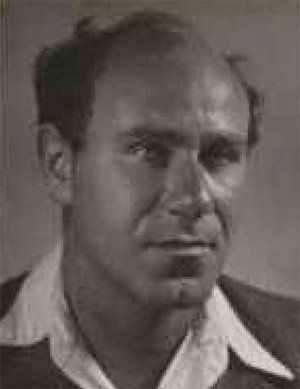
1946
|
Werkdorp Wieringermeer | Werkdorp Wieringermeer |
27.5.1916
Wupperthal German |
Klaus Weinberg (later: Dov Weinberg) was born on May 27, 1916, in Wuppertal (Barmen-Elberfeld).
This profile is private.
Contact us to gain access to this profile. |
|
Weinberg, Ruth

|
Werkdorp Wieringermeer | Werkdorp Wieringermeer |
2.3.1922
Dortmund German |
Ruth Erika Weinberg was born on March 2, 1922, in Dortmund.
This profile is private.
Contact us to gain access to this profile. |
|
Weisskopf, Herwarth (Herward)
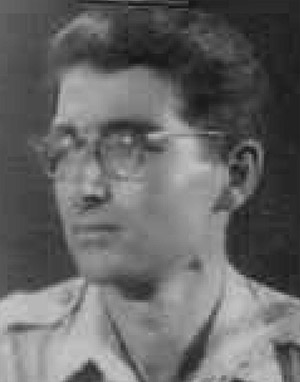
1946
|
Werkdorp Wieringermeer | Werkdorp Wieringermeer |
7.3.1917
Ratibor German |
Herward Weisskopf (later Zwi Weisskopf) was born on March 7, 1917, in Ratibor (now Racibórz, Poland), the son of Isidor (Yitzhak, Izi) and Tzila née Schuettenberg. He had two siblings, Michael (1914), and Fritz (later: Shalom Hermon) (1920).
This profile is private.
Contact us to gain access to this profile. |
|
Windmuller, Isaak
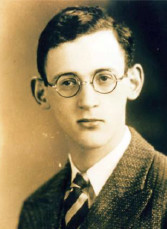
|
The Deventer Association |
29.10.1915
Emden Stateless |
Isaak Windmüller (later: Yitzhak Windmuller) was born on October 29, 1915, in Emden, Germany, the son of Moritz Windmüller and Jette née Seligmann. He had four siblings: Salomon (1910), Max (1920), Ruth (1923), and Emil (1924).
This profile is private.
Contact us to gain access to this profile. |
||
Wittner, Franz

|
Werkdorp Wieringermeer | Werkdorp Wieringermeer |
7.9.1916
Berlin German |
Franz Otto Wittner (later: Frank Wittner) was born on September 7, 1916, in Berlin. He had (at least) one brother, Heinz (ca 1914).
This profile is private.
Contact us to gain access to this profile. |
|
Wollenberg, Rita

|
The Deventer Association (Brummen) | Brummen | p.a. Beker |
23.7.1920
Elberfeld German |
Rita Wollenberg (later: Rita Yaen) was born on July 23, 1920, in Elberfeld, the daughter of Arthur Wollenberg and Chana Hanna Capell. She had one brother, Felix (1922).
This profile is private.
Contact us to gain access to this profile. |
Wolff, Fritz

|
The Deventer Association (Deurningen) | DEURNINGEN | H. Leufeld, Deutningen H.6o |
1.10.1914
Bingerbrück German |
Fritz Wolff (later: Yehuda Wolff) was born on October 1, 1914, in Bingerbrück, the son of Moritz Wolf and Elisabeth Else Seligman. He had two sisters: Margot (1913) and Ruth (1918).
This profile is private.
Contact us to gain access to this profile. |
Wolff, Willy, Günter

|
(Delden) | Delden: Wiene G.79 | G.Wijnbergen,G.79, Wiene, Ambt-Delden |
5.2.1918 Strigau German |
Willi Günter Wolff (later: Gideon Wolff) was born on February 5, 1918, in Strigau (now Strzegom, Poland), the son of Michael and Emmy Wolff.
This profile is private.
Contact us to gain access to this profile. |
Wolkowicz, Szyje, (Wollkowicz, Szyje)

|
Mizrachi Kibbutz Dat veEretz, Beverwijk Vereeniging "Dat Waarez" (Bachad) |
Amsterdam | Jekerstr. 5 |
4.3.1919
Zelow [ Polish ] Stateless |
Szyja (later Yehoshua) Wolkowicz was born on March 4, 1919, in Zelow (now Zelów, Poland), the son of Haim Shlomo Wolkowicz, from Lask, and Rywka Lissner, from Zelow. He had (at least) four siblings: Chaja Sura (1915), Israel (1916), Esther (1920), and Perl (1922).
This profile is private.
Contact us to gain access to this profile. |
Worms, Hetty (Heintje)

|
The Deventer Association (Den Haag) | DEN HAAG |
15.12.1916
Amsterdam Dutch |
Heintje Worms (later: Hetty Levi) was born on December 15, 1916, in Amsterdam, the daughter of Abraham Worms, from Amsterdam, and Sophia Kesner, also from Amsterdam. She had six siblings: Sara Amanda (1911), Jacob (1912), Betje (1914), Leendert (1915), Salomon (1918), and Jozeph (1920).
This profile is private.
Contact us to gain access to this profile. |
|
Wreschinski, Walter

|
The Deventer Association (Warnsveld) | WARNSVELD | Rouvenhorst Gasthuismolensteeg 14, Amsterdam |
26.10.1920
Berlin* German |
Walter Wreschinski was born on October 26, 1920, in Kranz, Posen, Prussia (now Kręcko, in Poznan, Poland), the son of Ernst Jacob Wrzeszinski, from Wreschen, Posen, (now Września, Poland), and Käthe, née Lewy, from Danzig (now Gdańsk, Poland). Walter had one sister, Ruth Jutta Cäcilie (1924).
This profile is private.
Contact us to gain access to this profile. |
Zobel, Alfred

|
Werkdorp Wieringermeer | Werkdorp Wieringermeer |
4.2.1911
Berlin German |
Alfred Zobel (later: Asher Tzobel) was born in Berlin on February 4, 1911, the son of Nathan Zobel, from Berlin, and Bianca, née Zobel, also from Berlin. Alfred had three sisters: Lucy (1898), Edith (1899), and Leonie (1905).
This profile is private.
Contact us to gain access to this profile. |
List 2: List of Passengers who boarded the Dora in Antwerp, 19 July 1939
Source: The Foreign Police in Belgium ARA; Foreign Police files, A177.761 (via Janiv Stamberger)
The list contains 171 names: 108 men and 63 women.
The names are listed in the same order as that from the original passenger list. The last eight names, starting with Mordohe Deresiewicz, are not in alphabetical order, suggesting these passengers were last-minute additions to the list.
The Antwerp list only contains names and dates of birth. All additional information (place of birth and nationality) is derived from other sources and is indicated by square brackets ("[]").
| Name |
D.O.B from list (dd.mm.yy)
[Place of birth] [Nationality] |
Bio |
Arndt, Erna

|
14.11.1906
[Liegnitz] |
Erna Arndt (née Koenigsberger) was born on November 14, 1906, in Liegnitz, Silesia, (now Legnica, Poland), the daughter of Paul Koenigsberger, a medical doctor originally from Lublinitz, Prussia (now Lubliniec), and Lina Lydia née Janower, from Breslau (now Wrocław, Poland). She had one brother, Franz (1901).
This profile is private.
Contact us to gain access to this profile. |
Arndt, Georg

|
30.5.1896
[Regenwalde] |
Georg Arndt was born in May 1896 in Regenwalde, Pomerania, Prussia, (now Resko, Poland), the son of Dr. med. Georg Arndt, from Regenwalde, and Rosa née Lichtenstein. Georg had three siblings: Leopold Felix (1890), Henriette (1892), and Helene (1893). Georg's mother died on the year of his birth, in 1896, presumably from childbirth-related complications. His father wed in a second marriage Luise Rudolphsohn. He died in 1932.
This profile is private.
Contact us to gain access to this profile. |
Aron, Hella

|
8.12.1920
[ Dortmund ] |
Hella Aron Przemyslaw (later: Hella Halpern) was born on December 8, 1920, in Dortmund, the daughter of Chaim Przemyslav, a merchant originally from Szydłowiec, Russia (now Poland), and Rachel Lea, née Aharon, from Ulanow, Austrian Galicia (now Ulanów, Poland). She had (at least) two sisters: Sabine (1928), and Jenny (1930).
This profile is private.
Contact us to gain access to this profile. |
Atlasz, Ilse

|
14.7.1904
[ Berlin ] |
Ilse Atlasz was born on July 14, 1904, in Berlin. Presumed parents*: Arnold Atlasz, from Nagybecskerek, Hungary (now Zrenjanin, Serbia) (1872), and Roza née Pollak, from Vienna (1873). Presumed siblings*: Robert Robih (1898) and Rita (1906 or 1907). At the time of the German Minority Census, on May 17 1939, she lived in Berlin, at Wilmersdorf (Trautenaustr. 16,II). She left Germany and came to Antwerp some time between the middle of May and July, before boarding the Dora. Nothing more is known about her. It is possible, however, to tease out more information based on circumstancial evidence. Living with her at the Trautenau strasse address Rita Atlasz (1906 or 1907), an opera singer, about whom more information is available. Assuming that Ilse and Rita were sisters (and not cousins), one can derive some additional biographical details about Ilse Atlasz. Rita's parents were Arnold Atlasz, from Nagybecskerek, Hungary, and Roza Pollak, from Vienna, and she had a brother, Robert Robih (1898). Note that no documents or online references containing links between Ilse Atlasz and these presumed siblings and parents have been found, so this biographical information is unconfirmed. Ilse'spresumed mother, Roza Atlasz (née Pollak) died on March 5, 1941. Ilse's presumed sister Rita emigrated to the United States where she married Fred Siegfried Struck. Her presumes brother, Robert Robih Atlasz, was active in the Maccabi sports organization. He led the german team at the Second Maccabiah in 1935. He then immigrated to Palestine in 1936. He continued his work with the sports association in various leadership roles: Hon. Sports Director of the Maccabi World Union (1958), Representative for the Israeli Olympic Committee (1958), Technical Director of the Israeli Olympic teams (1960), Sports Director of the Maccabiah (1961), Chairman of the Eighth Maccabiah Games Organising Committee (1969), Sports Director of Maccabi World Union (1971), etc. Sources: |
Austern, lsrael

|
18.4.1908 |
Israel Meir Austern was born on April 18, 1908, in Podgorze, Kraków, the son of Abraham Austern and Batia née Stein. He had seven siblings: Chiel (1895), Leah (1897), Isaac (1900), Dawid (1903-1911), Stefania (1906), Anna (1909), and Rosa. His father died in 1913, when Israel was 5. His mother died in 1934.
This profile is private.
Contact us to gain access to this profile. |
Bauer, Hilde

|
18.1.1919
[Gießen] |
Hilde Bauer (later: Hilde Krauthammer) was born on January 18, 1919, in Gießen, the daughter of Moses Moritz Bauer, from Leihgestern, and Ida née Joseph, from Allendorf. She had two siblings: Margot (1913), and Helmut (1916).
This profile is private.
Contact us to gain access to this profile. |
Beer, Berthold

|
8.9.1907
[ Leipzig ] [ Stateless ] |
Berthold Beer was born on September 8, 1907, in Leipzig, the son of Abraham Jacob Beer and Mary (Miriam) née Bierer. He had (at least) three siblings: Martin (1910), Paula Adele Dora (1916) and Charlotte (1923).
This profile is private.
Contact us to gain access to this profile. |
Berger, Felix

|
29.3.1917
[ Vienna ] |
Felix Berger was born on March 29, 1917, in Vienna, the son of Arnold Moses Berger-Löfkovics (Arnold Gems F Berger), originally from Lemberg (Lviv), and Gertruda Feiwelsohn (Gertrude Gems Berger), from Vienna. He had a younger sister, Gisella (1919).
This profile is private.
Contact us to gain access to this profile. |
Bier, Anni

|
31.10.1914
[ Duisburg ] |
Anna Bier (later: Anna Karliner) was born in Duisburg on October 31, 1914, the daughter of Paul Paisech Bier, originally from Łańcut, and Rachel Regina née Kleinmann, from Sokolow.
This profile is private.
Contact us to gain access to this profile. |
Boehm, Gert

|
3.10.1920
[ Allenstein ] |
Gert Boehm was born on October 3, 1920, in Allenstein, East Prussia (now Olsztyn, Poland). No further information is available. Sources: |
Brand, Grete

|
8.4.1911
[ Berlin ] [ German ] |
Grete Brand (née Linkowski, later: Tovah Brand), was born on April 8, 1911, in Berlin, the daughter of Salomon Shlomo Linkowski and Helen Hannah Rivka, née Rossner. She presumably had three siblings: Rosa Shoshana (1907), Julius Yehuda (1908), and Ruth.
This profile is private.
Contact us to gain access to this profile. |
Brand, Manfred

|
30.5.1909
[ Berlin ] |
Manfred Brand (later: Mordechai Brand) was born on May 30, 1909, in Berlin, the son of Ezekiel (Yecheskiel) Brand.
This profile is private.
Contact us to gain access to this profile. |
Bronstein, Gregor

|
12.2.1921 | |
Buchaster, Berta
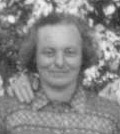
|
27.10.1913
[ Leipzig ] [Polish] |
Berta Buchaster (later: Berta Bromberger) was born on October 27, 1913, in Leipzig, the daughter of Chaim Leib Buchaster and Feige Rachel (Ruchl, Ruchel) née Hasenlauf. Her parents were originally from Bochnia in Galicia (Austria-Hungary). The couple had thirteen children, two of which died as infants and a third, Leon David Buchaster, at the age of nine in 1924. Berta's siblings were: Hermann Osias (1904), Toni (1906), Jacob (1907), Marie (1911), Nathan (1912), Elias (Eliyahu) (1916), Isaak (1920), Ester Elsa (1921) and Simi Selma (1923).
This profile is private.
Contact us to gain access to this profile. |
Buchaster, Marja

|
9.4.1911
[ Leipzig ] [Polish] |
Marja (Marie) Buchaster (later Miriam Stienmesser) was born on April 9, 1911, in Leipzig, the daughter of Chaim Leib Buchaster and Feige Rachel Ruchl née Hasenlauf. Her parents were originally from Bochnia in Galicia (Austria-Hungary). The couple had thirteen children, two of which died as infants and a third, Leon David Buchaster, at the age of nine in 1924. Marie's siblings were: Hermann Osias (1904), Toni (1906), Jacob (1907), Nathan (1912), Berta (1913), Elias (Eliyahu) (1916), Isaak (1920), Ester Elsa (1921) and Simi Selma (1923).
This profile is private.
Contact us to gain access to this profile. |
Buchaster, Nathan

|
13.9.1912
[ Leipzig ] [Polish] |
Nathan Buchaster was born on September 13, 1912, in Leipzig, the son of Chaim Leib Buchaster and Feige Rachel Ruchl née Hasenlauf. His parents were originally from Bochnia in Galicia (Austria-Hungary). The couple had thirteen children, two of which died as infants and a third, Leon David Buchaster, at the age of nine in 1924. Nathan's siblings were: Hermann Osias (1904), Toni (1906), Jacob (1907), Marie (Marja) (1911), Berta (1913), Elias (Eliyahu) (1916), Isaak (1920), Ester Elsa (1921) and Simi Selma (1923).
This profile is private.
Contact us to gain access to this profile. |
Burak, Paul

|
30.7.1900
[Leipzig] [German] |
Paul Burak (later: Pinchas Burak) was born on July 30, 1900, in Leipzig, the son of Moshe Borak, from Kolomyya (Ukraine) and Klara Bratel, from Eisleben (Germany). He had three siblings: Arthur Avraham (1902), Wilhelm "Willy" (Ze'ev) (1905), and Marie (1907).
This profile is private.
Contact us to gain access to this profile. |
Celnik, Abram

|
14.5.1894
[ Zgierz ] |
Abram Celnik was born on May 14, 1894, in Zgierz near Łódź, Congress Poland (now Poland), the son of Mordechai Celnik.
This profile is private.
Contact us to gain access to this profile. |
Celnik, Ziporja

|
18.3.1892
[ Zgierz ] |
Ziporja Celnik (née Jakobowicz) was born on March 18, 1892, in Zgierz, Congress Poland (now Poland).
This profile is private.
Contact us to gain access to this profile. |
Cisinsky, Heinz

|
30.3.1915
[Leipzig] [Stateless] |
Heinz Cisinsky (later: Henry Cisinski) was born on March 30, 1915 in Leipzig, the son of Adolf Alter Cisinsky, a furrier from Mescheritz, Prussia (now Międzyrzecz, Poland), and Lina Marta Alma, from Udersleben, Thuringia. He had two siblings: Ruth (1918), and Rolf (1919).
This profile is private.
Contact us to gain access to this profile. |
Cohen, Artur

|
16.11.1901
[Zossen] |
Artur Cohen was born on November 16, 1901, in Zossen, the son of Victor Cohen, from Neustadtgödens, and Sarah Rosenstein, from Guttstadt. He had one brother, Helmut (1903). (He may have had another sibling, about whom nothing is known.)
This profile is private.
Contact us to gain access to this profile. |
Danziger, Bruno

|
1.12.1906
[ Gleiwitz ] |
Bruno Danziger was born on December 1, 1906, in Gleiwitz, Upper Silesia, Germany (now Gliwice, Poland).
This profile is private.
Contact us to gain access to this profile. |
Dorn, Netanel

|
30.8.1916
[ Warsaw ] |
Netanel (Nathaniel) Dorn was born on August 30, 1916, in Warsaw, the son of Jakob Dorn, a merchant originally from Warsaw, and Dina, née Grünhaus, also from Warsaw. He had two siblings: Moshe (Morris) (1912), and Paula (Pnina) (1914).
This profile is private.
Contact us to gain access to this profile. |
Eichwald, Theodor

|
14.6.1902
[Breslau] |
Theodor Eichwald was born on June 14, 1902, in Breslau (now Wrocław, Poland), the son of Salomon Eichwald, from Castrop, and Fanny née Armer, from Breslau (now Wrocław, Poland). He had two brothers, Ernst (1895) and Fritz (1897).
This profile is private.
Contact us to gain access to this profile. |
Eisner, Salli

|
4.6.1916
[Duisburg] |
Salomon (Salli) Eisner was born on June 4, 1916, in Duisburg, the son of Mozes Gedalja Eisner and Mircia née Mandellaub, both from Kolomea, Galicia, Austria-Hungary (now Kolomyia, Ukraine). He had two brothers, Aron Adolf (1913 - ?), and David (1919 - 1939).
This profile is private.
Contact us to gain access to this profile. |
Feldmann, Chana

|
2.5.1905 |
Hanna (Chana) Feldmann (later: Anna Tuchler) was born on May 2, 1905, in Dresden, the daughter of Srol (Israel) Feldmann, from Disna in the Vitebsk region, Russian Empire (later Poland, now Belarus), and Sarah née Melner, also from Disna. She had four siblings: Joseph (1907), Selma (1910), Simon "Schimmel" (1913), and Fritz (1917).
This profile is private.
Contact us to gain access to this profile. |
Fink, Isidor (Isy)

|
3.12.1919
[Cologne] [German] |
Isidor "Izzy" Fink (later: Yitzhak Fink, Izzy) was born on December 3, 1919, in Cologne, the son of Aharon Fink, from Stryj, Galicia, Austria (then Poland, now Stryi, Poland), and Sarah Neumann, from Frysztak, Galicia, Austria (now Poland). He had two sisters, Bracha (1922), and Menucha Mirele (1936).
This profile is private.
Contact us to gain access to this profile. |
Finn, Hilde
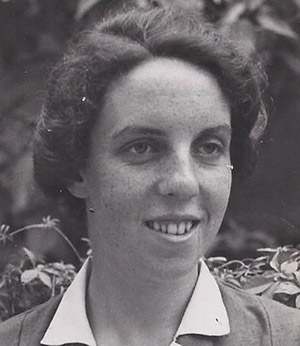
|
3.10.1917 [Berlin] [Stateless; previously: German] |
Hilde Judith Finn (later: Hilde Nemet) was born on October 13, 1917, in Berlin, the daughter of Herman Friedrich Finn, from Berlin, and Leah Finn.
This profile is private.
Contact us to gain access to this profile. |
Frank, Robert

|
15.3.1902
[Vienna] |
Robert Frank was born on March 15, 1902, in Vienna, the son of Julius (Jules, Gyula, Yehuda) Frank, originally from from Majtény in the Szatmár county of Hungary (now Romania), and Rosa Krakauer, from Ottakring, Vienna. He had one sister, Erna (1908).
This profile is private.
Contact us to gain access to this profile. |
Fuchs, Frieda

|
3.12.1907
[ Breslau ] |
Frieda Fuchs (née Rosenfeld) was born on December 3, 1907, in Breslau, (now Wrocław, Poland), the daughter of Anton Anshel Rosenfeld, from Budapest, and Klara née Militscher, from Plesschen, Prussia (now Pleszew, Poland). She had a sister, Margot (1906), and at least two brothers: Hans Joachim (1913) and Rudolf (1916).
This profile is private.
Contact us to gain access to this profile. |
Fuchs, Paul

|
29.3.1908
[ Breslau ] |
Paul Fuchs was born on March 29, 1908, in Breslau, (now Wrocław, Poland), the son of David Fuchs, from Breslau, and Emma Helene Karoline Fischer, also from Breslau. He had four siblings: Herbert (1905), Siegfried (1906), Sophie (1909), and Charlotte (1912). He also had a half-brother, Friz Max Karl (1896), born from an unknown father while his mother was unmarried ("maiden child"). His father, David Fuchs, married Emma Fischer in 1904 and adopted her son Fritz. His father David died in July 1911, when Paul was three years old.
This profile is private.
Contact us to gain access to this profile. |
Fuerst, Gisela

|
30.12.1904 Berlin |
Gisela Fuerst née Marcu was born on December 30, 1904, in Berlin, the daughter of Jancu (Yaakov) Marcu, from Dorohoi, Romania, and Hedwig, née Jacobsohn, from Rehden über Diepholz. She had (at least) one sister, Herta (1907).
This profile is private.
Contact us to gain access to this profile. |
Fuerst, Osias

|
13.10.1898
[ Gorlice ] |
Osias Fuerst (Szyje; later Yehoshua) was born on October 13,1898, in Gorlice, Austria-Hungary (now Poland), the son of Nechemia Fuerst, and (presumably) Ester née Wels. He presumably had the following four siblings: Mechel (1894), Laja (1897), Mojżesz (1901), and Róża (Shoshana) (1903).
This profile is private.
Contact us to gain access to this profile. |
Gallewski, Josef

|
21.5.1917
[ Posen ] [ Polish ] |
Josef Gallewski was born on May 21, 1917, in Posen, Prussia (now Poznań, Poland), the son of Max (Moses) Gallewski, and Ernestine née Schäfer. He had four siblings: Hermann (1912), Saul (1913), Minna (1915) and Recha (1920).
This profile is private.
Contact us to gain access to this profile. |
Gaenser, Ella

|
19.2.1921
[ Hamburg ] |
Ella Gaenser (later: Ella Yaffa Traube) was born on February 19, 1921 in Hamburg, the daughter of Chaim Karl Gaenser, originally from Galicia (now Poland), and Rivka née Ratenbach - Rappaport, also from Galicia (now Ukraine). She had a younger brother, Max (Mendel), born in 1925.
This profile is private.
Contact us to gain access to this profile. |
Gerson, Julius

|
10.1.1903
[ Fulda ] |
There is some uncertainty about Julius Gerson's early life. Details about his parents and siblings is not confirmed. Julius Gerson was born on January 10, 1903, in Fulda, (presumably) the son of Israel Gerson, from Mittelsinn, Bayern, and Hannchen née Stern, from Fulda. Julius had ten* siblings: Bertha (1891), Philipp (1893), Wilhelm (1894), Emilie (1895), Gertrude (1896), Max (1898), Paul (1900), Gustav (1901), Karl (1905) and Ruth (1906).
This profile is private.
Contact us to gain access to this profile. |
Goldberg, Ruth

|
7.7.1918 |
Ruth Johanna Goldberg was born on July 7, 1918. She lived in Erfurt, Thuringia. Nothing more is known about her. |
Goldenhar, Abraham
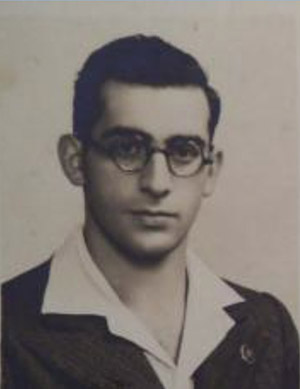
|
12.9.1916 [ Warsaw ] |
Abraham Goldenhar (later: Abraham Shoam) was born on September 12, 1916, in Warsaw, the son of Mendel (Menahem) Goldenhar and Faiige Mindel (Tzipora) Lipschitz. He had three siblings: Sarah (1906 or 1907), Rachel (Ruchla) (1918 or 1919) and David (1928).
This profile is private.
Contact us to gain access to this profile. |
Goldenhar, Hanni
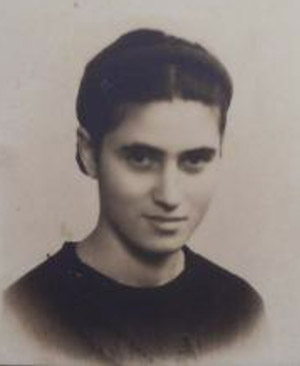
|
11.8.1919
[Rotterdam] |
Henny Goldenhar née Einhorn (later: Henny Shoam) was born on August 11, 1919, in Rotterdam, the daughter of Ben-Zion and Rosa Einhorn. Her parents were originally from Hungary. She had three brothers: Zvi Hirsch Meir Einhorn, Hanoch Einhorn (later: Arnon), and Zalman Einhorn.
This profile is private.
Contact us to gain access to this profile. |
Goldstein, Arthur

|
5.1.1920
[ Duisburg ] |
Artur Goldstein was born on January 5, 1920 in Duisburg, the son of Max Moses Goldstein, a merchant originally from Krefeld (Prussia), and Fanny Feige Goldstein (née Schurberg). He had two sisters, Bernhardine (1917), and Edith (1922).
This profile is private.
Contact us to gain access to this profile. |
Goldstein, Joseph

|
26.12.1915
[ Pyhanken ] |
Joseph Goldstein was born on December 26, 1915 in Pyhanken (now Běhánky, Czechoslovakia), the son of Pinhas (Pinkas) Goldstein and Chana Ruchla Goldstein (née Gablinger). He had four siblings: Chaja Dwore (1913), Rebeka Lea (1920), Sara Rzyndla (1922), and Jakob Mosejez (1925).
This profile is private.
Contact us to gain access to this profile. |
Goldstein, Kadisch

|
27.8.1910
Sankt Petersburg |
Kadisch Goldstein was born on August 27, 1910, in Sankt Petersburg (Saint Petersburg, Leningrad), Russia.
This profile is private.
Contact us to gain access to this profile. |
Gotthilf, Herbert

|
22.8.1910
[Bärwalde] [German] |
Herbert Gotthilf was born on August 22, 1910, in Bärwalde, the son of Siegmund Gotthilf and Elsbeth (Else) Rosen. He had three siblings: Günther (1914), Ruth (1919) and Elinor Margarete Gretel (1921).
This profile is private.
Contact us to gain access to this profile. |
Grun, Mendel

|
16.6.1915 | |
Gutmann, Eva

|
16.8.1920
[Berlin] |
Eva Gutmann was born on August 16, 1920, in Berlin, the daughter of Siegfried Gutmann, merchant, and Käthe née Rosenstern. The family lived on Speyererstraße in Schöneberg, Berlin. Eva's mother died in July 1936, when Eva was 15 years old.
This profile is private.
Contact us to gain access to this profile. |
Gutmann, Naumi

|
10.5.1920
[ Köln ] |
Noemi Guttmann was born on May 10, 1920, in Köln.
This profile is private.
Contact us to gain access to this profile. |
Haase, Gisela

|
29.4.1903
[ Vienna ] |
Gisela Haase (née Fränkel) was born on April 29, 1903, in Vienna, the daughter of Alwin Fränkel and Röschen Flatow. Her siblings were Herbert (1901), Walter (1905), Lina (1906), and possibly Hermine (1899).
This profile is private.
Contact us to gain access to this profile. |
Haase, Kurt

|
23.1.1905
Santomischel |
Kurt Haase was born on January 23, 1905, in Santomischel, Posen, (now Zaniemysl, Poland), the son of Bernhard Haase and Dorothea Boroschek. He had four siblings: Alfred (1903), Siegfried (Sigi) (1906), Herbert (1909), and Sofie (1914).
This profile is private.
Contact us to gain access to this profile. |
Halpern, Leo

|
31.12.1920
[Berlin] |
Leo Halpern (later: Arieh Halpern) was born on December 31, 1920, in Berlin, the son of Selig Halpern, a merchant, and Cilly (Tzvia), née Weissberg. Both parents were originally from Stanislawow (Stanislau), Austria-Hungary (now Ivano-Frankivsk, Ukraine). He (presumably) had (at least) two sisters: Sprincie (Sprinzie) (1907), and Malwine (1908).
This profile is private.
Contact us to gain access to this profile. |
Hanauer, Lothar

|
30.3.1907
[ Wiesenfeld ] |
Lothar Hanauer (later: Yehuda Naor) was born on March 30, 1907, in Wiesenfeld, Thuringia, Germany, the son of Moses Hanauer, from Weisenfeld, and Pauline née Steinheimer, from Niederwerrn. Lothar had five siblings: Irma (1903), Benno (1904), Erna (1910), Max (1912), and Ida (1917).
This profile is private.
Contact us to gain access to this profile. |
Hecht, Herbert

|
5.9.1912
[ Beuthen ] |
Herbert Hecht (Chaim Hadar) was born on September 5, 1912, in Beuthen, Germany (now Bytom, Poland), the son of Jacob Hecht, a merchant, and Emma Leschziner. He had five siblings: Kaethe (1910), Ilse (1914), Hildegard (1916), Irma (1919) and Ruth (or Rudi?) (1922).
This profile is private.
Contact us to gain access to this profile. |
Hecht, Ruth

|
29.6.1912 [ Langendorf ] |
Ruth Hecht, née Frey, (later: Ruth Hadar) was born on June 29, 1912, in Langendorf, Tost-Gleiwitz, Schlesien, (or Gleiwitz, Germany (now Gliwice, Poland)?), the daughter of Wilhelm Frey and Clara Kallmann. She had two siblings, Hertha (1907-1937), and Hans Joachim Frey (1909 - 1951). Her father died in 1930 when Ruth was 18 years old.
This profile is private.
Contact us to gain access to this profile. |
Heimann, Sally

|
25.12.1907
[ Schwanfeld ] |
Saul Sally Heimann was born on December 25, 1907, in Schwanfeld, Bavaria, the son of David Heimann and Regina Bachmann. He had seven siblings: Marta (1898), Selma (1899), Clara (1900), Max (1901), Bella (1903), Gretchen (1906) and Frieda (1914). His father died in 1931.
This profile is private.
Contact us to gain access to this profile. |
Heller, Dora

|
23.6.1920
[ Chemnitz ] |
Dora Heller was born on June 23, 1920, in Chemnitz, Germany. At the time of the May 1939 German Minoriy Census, she lived in Chemnitz. She left Chemnitz and came to Antwerp sometime between mid-May and mid-July 1939, from where she boarded the Dora. |
Herzberg, Samuel

|
26.2.1912
[Poland] |
Samuel Herzberg was born on February 26, 1912, in Poland, the son of Yaakov Gershon and Frida Hertzberg.
This profile is private.
Contact us to gain access to this profile. |
Heumann, Erna

|
21.4.1913
[ Eschweiler ] |
Erna Heumann was born on April 21, 1913, in Eschweiler, Germany, the daughter of Philipp Heumann, a butcher from Eschweiler, and Bertha, née Daniel. She had two siblings: one half brother, Leopold (Leo) (1903), and one brother: Alexander (Alex) (1907). Her father died in January 1921 when Erna was 7 years old. Her mother died seven years later in 1928* when Erna was 15. (* other sources have 1938)
This profile is private.
Contact us to gain access to this profile. |
Honik, Szarlotte

|
9.5.1912? 9.5.1917* |
The passenger listed as Szarlotte Honik may actually be Szarlotta Honi. She was born on May 9, 1912 (and not 1917 as on the passenger list). Sources: |
Hoffmann, Erich

|
4.4.1916
[Wolbeck] [German] |
Erich Hoffmann was born on April 4, 1916, in Wolbeck, Munster, the son of Solomon Hoffmann and Martha Arensberg. He had three brothers: Arnold (1913), Ludwig (1918), and Fritz Rudi Fred (1923).
This profile is private.
Contact us to gain access to this profile. |
Hoffmann, Theodor

|
28.3.1907 [ Berlin ] |
Theodor Hoffmann was born on March 28, 1907, in Berlin, the son of Alexander Hoffmann from Elisabethgrund (?), Russia, and Gitel née Lierberman from Poltava, Russia (now Ukraine). He had one brother, Waldemar (1912). Nothing is known about Theodor Hoffmann's family, but a few assumptions can be made. For one, the family was not orthodox - or possibly even religious - based on the names of their children. They were most likely well-to-do as they were able to afford a "capitalist visa" for Palestine. (A rare exception among Dora passengers, his parents emigrated to Palestine almost four years before him in 1935. At the time, his father was 60 years old.) Theodor Hoffmann married Tova Mayer and the couple had one son. Theodor Hoffmann died in October 1975. His parents emigrated to Palestine on September 30, 1935. Sources: The passenger list incorrectly has his year of birth as 1902. |
Horowitz, Jakob

|
19.1.1902
[Vienna] [Austrian] |
Jakob Horowitz was born on January 19, 1902, in Vienna, the son of Fischel (Fiszel, Philippe) Horowitz and Rebeka (Riwe, Regine) Nebenzahl. He had a brother Sigmund (1896) and a sister Malvine (Malwine) (1900). His father died in 1915, when Jakob was 13 years old. His brother Sigmund died a year later in 1916, at the age of 20. [Due to the dates of the death, it is possible that either one, or both, died fighting in the war.]
This profile is private.
Contact us to gain access to this profile. |
Inowlodzka, Ruchla

|
1914 | |
Jacobowicz, Hirsch

|
22.12.1912 | |
Jordan, Alfred
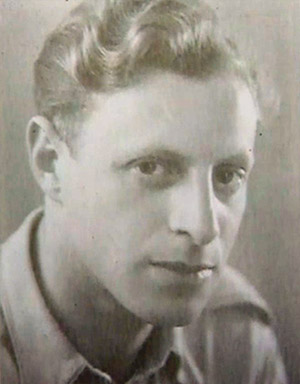
1943
|
25.10.1920
[Berlin] |
Alfred Jordan was born on October 25, 1920, in Berlin, the eldest son of Max Jordan, a journalist, and Johanna (Hanna) Haase. He had two younger brothers, each born five years apart: Horst (1925) and Heinz (1930).
This profile is private.
Contact us to gain access to this profile. |
Kattkitzki, Erich

|
19.1.1906
[ Frankfurt ] |
Erich Kattkitzki (later: Elieser Kad) was born on January 19, 1906, in Frankfurt, the son of Isidor Kattkitzki, an agent, and Anna Ela Sachs.
This profile is private.
Contact us to gain access to this profile. |
Katz, Elisabeth

|
16.10.1906
[Vásárosnamény] |
Elisabeth Katz was born on October 19, 1906, in Vásárosnamény (today: Hungary) She was married to Louis Leonardo Katz, another passenger of the Dora. Sources: |
Katz, Louis

|
22.7.1904
[Bojan, Romania] |
Louis Leonardo Katz was born on July 22, 1904, in Bojan, Bukowina, Romania (Austria, Romania from 1918 to 1940). He spent the first ten years of his life in Bojan (Boyan), a Hasidic center. Between 1914 and 1918, his family lived in Gernowitz and Bucharest, then again in Gernowitz from 1918 to 1922. Louis Katz then came to Vienna in 1922.
This profile is private.
Contact us to gain access to this profile. |
Katz, Toni
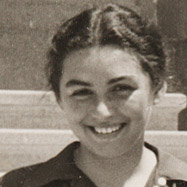
|
30.9.1919
[Sokal, Poland] [Stateless, formerly Polish] |
Toni Katz was born on September 30, 1919, in Sokal (Poland, now Ukraine), the daughter of Leo Katz and Frida Tabak.
This profile is private.
Contact us to gain access to this profile. |
Kaufmann, Frieda
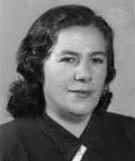
1946
|
4.1.1906
[ Kałusz ] |
Frieda Kaufmann, née Heller, (later: Frieda De La Penha), was born on January 4, 1906 in Kałusz, Galicia, Austria (now Kalush, Ukraine).
This profile is private.
Contact us to gain access to this profile. |
Kleinschmidt, Herbert

|
30.12.1921
[ Soest ] |
Herbert Kleinschmidt was born on December 30, 1921 in Soest, the son of Isidor Kleinschmidt, from Soest, and Olga Felix. Herbert's father was on the board of the local Soest RjF (Reich Federation of Jewish Front-Line Soldiers). He died in February 1929. At the time, Herbert was 8 years old. Sources: |
Koopman, Hans

|
4.1.1915
[ Amsterdam ] |
Hans Koopman (later: Hans Golani) was born on January 4, 1915, in Amsterdam, the son of Simon Koopman and Meta Eichenberg. He had one brother, David Richard (1916).
This profile is private.
Contact us to gain access to this profile. |
Koopman, Feiga

|
17.6.1916 [ Prague ] |
Fanny Koopman, née Feiga Gutwirth, (later: Fanny Golani) was born on June 17, 1916, in Prague, Czechoslovakia, the daughter of Yehuda Leib Gutwirth, originally from Jascenica, Poland, and Chaya Rachel Katz, originally from Dobromil, Poland. She had seven siblings: Tauba (1904), Sara (1906), Chaim Israel "Srule" (1908), Lea (1910), Miriam (1912), Raphael "Fulu" (1919), and Estera Gitla (1924).
This profile is private.
Contact us to gain access to this profile. |
Kominski, Rita

|
26.4.1915 | |
Kratz, Fritz

|
20.1.1909
[ Nideggen ] |
Fritz Kratz (later: Yaacov Gardi) was born on January 20, 1909, in Nideggen, the son of Norbert Kratz, from Nideggen, and Isabella Ullmann, from Düren. He had one sister, Käthe (1907). His father was a cattle dealer in Nideggen, a small town near Düren and Aachen, where the family had resided for several generations. Fritz Kratz got a high school diploma from the Wirteltor Gymnasium in Düren. At the time of the November Pogrom, he lived in Nideggen. He was arrested and taken to the Sachsenhausen concentration camp in Orianenburg, from where he was released on December 24, 1938. He also resided in Aachen - presumably after his release from the camp. He emigrated to Belgium, presumably crossing the "green border" by Aachen. He married Judit Lederman in 1940 and the couple lived in Kibbutz Ashdot Ya'akov. In 1950 they left the kibbutz and eventually settled in Kfar Haim. Fritz Kratz later changed his name to Yaacov Gardi. The couple had three children. Yaacov Gardi (Fritz Kratz) died in January 1987. His father, Norbert Kratz, died in the Israelite Hospital in Cologne-Ehrenfeld in the in May 1940. His mother, Isabella Kratz, was deported to Izbica in 1941 where she was murdered. His sister, Käthe Schwarz, emigrated to (Canada? Montevideo?). Sources: |
Krauthammer, Walter

|
28.1.1912
[Velbert] [Stateless] |
Walter Krauthammer (later: Ze'ev Krauthammer) was born on January 28, 1912, in Velbert, near Düsseldorf, the son of Abraham Adolf Krauthammer, originally from Antonowka, Galicia (now Poland), and Cipa Malka (Cilli, Zilli) née Dier, (from Pszywoscic?, Galicia). He had two brothers, Max (1906? 1910?), and Heinz (1925). (A third brother, Leo, born in 1915, died in infancy).
This profile is private.
Contact us to gain access to this profile. |
Kugelmass, Max

|
30.9.1910
[Leipzig] |
Max Kugelmass was born on September 30, 1910, in Leipzig, the son of Yitzhak Hilsenrath Kugelmass, and Hulda (Hudia Chaje) Kugelmass, née Rosner, originally from Puttilla Toraki, Bukowina, Austro-Hungarian Empire, (Putila, Romania, now Ukraine). He had three siblings: Joseph (1900), Toni (Rachel) (1903), and David (1905).
This profile is private.
Contact us to gain access to this profile. |
Kuschnerow, Rosel

|
16.11.1920*
6.11.1920
[ Nuremberg ] |
Rosel Kuschnerow was born on November 6, 1920, in Nuremberg, the daughter of Morduch (Mordechai, Moritz) Kuschnerow, a merchant from Cherson, Russia (now Kherson, Ukraine), and Meta (Miriam) Rosenberg, from Münster, Germany. She had two sisters, Erna (1912) and Sofie (Sophie) (1913). Rosel's family lived in Nuremberg (at least in the 1930s at Klaragasse 5). Her father had a business in Fürth, on Schwabacher Strasse. He belonged to the Orthodox community Adas Israel in Nuremberg. Rosel belonged to the Habonim youth group, and her two sisters, Erna and Sofie, belonged to Hechalutz. Nothing is known about her path to the Dora. Rosel married Alexander Staendig on in October 1941 in Raanana. At the time, she lived in the Ha-Sharon Group in Raanana. Her husband was the brother of Charlotte Staendig (later Yael Neuhaus), another Dora passenger. He belonged to the Ha-Gar'in Group in Raanana. The couple had two children, a son and a daughter. Rachel Staendig (née Rosel Kuschnerow) died in June 2003 in Nahariya. Rosel's parents, Morduch and Meta Kuschnerow, were deported from Nuremberg to the Jungfernhof concentration camp in Latvia on November 29, 1941. Her parents either perished in the winter of 1941-1942 or were murdered in the mass shootings in the Biķernieki forest on March 26, 1942. Sources: * According to her tombstone, Rosel was born on November 6. The passenger list has November 16. |
Lampen, Hermann

|
19.5.1919
[Dresden] |
Hermann Lampen (later: Zvi Shalhavi) was born in Dresden on May 19, 1919, the son of David Aba (Abraham) Lampen, originally from Romania, and Betti (Batia), née Schneck (Minority Census has: "Lekach"), a nurse, originally from Budapest, Hungary. He had two sisters, Zill Cecili (1917) and Esther (1920).
This profile is private.
Contact us to gain access to this profile. |
Landy, Alfred

|
15.8.1920
[ Berlin ] ["Expatriated Pole"] |
Alfred Landy was born on August 15, 1920, in Berlin, the son of Joachim Haim Nachman Landy, from Brody, and Chaje Gittel Gusti (Guste) Landy (née Goldenthal), also from Brody. (There are several places named Brody. It is assumed that they came from the town in the Lviv Oblast; previously in Austro-Hungarian Galicia; Poland in the interwar period; now Ukraine.) He had (at least) one sister, Ruth (1922).
This profile is private.
Contact us to gain access to this profile. |
Langsam, Elsa

|
11.8.1912
[ Cologne ] |
Elsa Langsam was born on August 11, 1912, in Cologne. At the time of the May 1939 German Minority Census, she lived in Hamburg-Blankenese, Steubenweg 36, in a training camp affiliated with Hechalutz Hadati (religious Zionist) in a Jewish youth hostel. (The building on Steubenweg 36 was used by Chaluzim to prepare for emigration to Palestine. The villa later served as a daytime holiday camp for Jewish children. The Nazis later turned it into a 'Judenhaus' where Jewish men and women were forced to live before being deported.) She left Hamburg and came to Antwerp sometime between mid-May and mid-July 1939. From there she later boarded the Dora. Sources: |
Lazar, David

|
25.10.1915
[ Banila ] |
David Leon Lazar was born on October 25, 1915, in Banila, Romania, the son of Abraham and Mantie (Minah?) Lazar. His father, a merchant, was originally from Kolomea (Kolomyia) (Galicia, then Poland, now Ukraine) and his mother, a homemaker, was from Banila. He had one sister, Fanny (1912). The family moved to Vienna in 1916.
This profile is private.
Contact us to gain access to this profile. |
Lehmann, Walter

|
18.11.1896 | |
Levy, Marie

|
31.5.1920
[ Berlin ] [ Turkish ] |
Marie Levy (later: Marie Abraham) was born on May 31, 1920, in Berlin, the daughter of Samuel Levy and Rosa Adeimann (Adcimann? Adelmann?), both from Constantinople (Istanbul).
This profile is private.
Contact us to gain access to this profile. |
Lewin, Marie

|
21.6.1913
[Bad Warmbrunn] |
Marie Lewin née Marie Wolff (later: Miriam Lewin), was born on June 21, 1913, in Bad Warmbrunn, the daughter of Max Wolff, a bank manager, and Katharina Kaethe Wolff (née Moses). Marie had one brother, Klaus (1919).
This profile is private.
Contact us to gain access to this profile. |
Lewin, Richard

|
28.1.1904
[Pogorzela] |
Richard Lewin (later: Reuven Lewin) was born on January 28, 1904, in Pogorzela, a very small town in the province of Posen (now Poland), the son of Adolf Aron Lewin and Cecylia (Cäcilie, Zilla, Cilia, Cilly) Sandberg. He had two siblings, Erich (1902), and Irma Lewin (1908).
This profile is private.
Contact us to gain access to this profile. |
Littauer, Else

|
23.7.1908
[Ober-Peilau] |
Else Littauer, née Else Kalewe, was born on July 23, 1908 in Ober-Peilau, the daughter of Ernst Kalewe from Rothschloß and Berta née Grosser, from Ober-Peilau. She was not born in a Jewish family, the only known instance among Dora passengers.
This profile is private.
Contact us to gain access to this profile. |
Littauer, Jakob

|
15.7.1904
[Breslau] |
Jakob Littauer was born on July 15, 1904, in Breslau (now Wrocław, Poland).
This profile is private.
Contact us to gain access to this profile. |
Loewenstein, Herbert
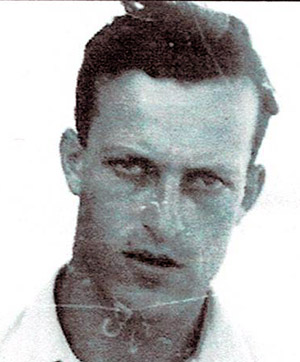
|
21.4.1921
[Cologne] |
Herbert Loewenstein (later: Zvi Avnon) was born on April 21 1921 in Cologne, the son of Hugo Loewenstein and Elsa Lion. He had one sister, Irene.
This profile is private.
Contact us to gain access to this profile. |
Loewenstein, Kurt

|
8.5.1902
[ Chemnitz ] |
Kurt Loewenstein was born on May 8, 1902, in Chemnitz, the son of Max Moses Loewenstein and Lise Elisa Michaelis. He had two siblings, Erna (1899) and Lotte (1908).
This profile is private.
Contact us to gain access to this profile. |
Mahler, Sigismund

|
18.6.1915 |
Sigismund Mahler (Sigi, later Shimon Mahler) was born on June 18, 1915, in Duisburg*, Germany, the son of Zeev and Hana Mahler. [* other sources: Den Haag, Netherlands].
This profile is private.
Contact us to gain access to this profile. |
Malz, Emil

|
2.10.1915
[Przeworsk] [Polish] |
Emil Malz was born on October 2, 1915, in Przeworsk in Austrian Galicia (now Poland).
This profile is private.
Contact us to gain access to this profile. |
Mamlok, Rosa

|
23.4.1905
[ Zerkow ] |
Rosa Mamlok was born on April 23, 1905 in Zerkow, Prussia (now Poland). At the time of the German Minority Census in May 1939, she lived in Breslau, on Schweidnitzer Stadtgraben 28. (The building belonged to the Breslau Jewish Religious Community and 45 Jewish residents lived at this address at the time, including two other Dora passengers, Gisela Haase and Kurt Haase.) Sources: |
Margules, Erna

|
18.3.1918 [ Leipzig ] |
Erna Margules was born on March 18, 1918, in Leipzig. At the time of the German Minority Census on May 17, 1939, she lived in a Hachshara affiliated with Hechalutz in Regensburg (Weissenburgstrasse 31). Other Dora passengers in the Hachshara at that time included Erich Schlorch, Karol Sokolski, and Isaac Sapirstein. Sources: The passenger list incorrectly has 1915 as the year of birth. |
Marx, Klara

|
13.10.1919 [ Nuremberg ] |
Klara Marx (later: Klara Chava Rebhun) was born on October 13, 1919, in Nuremberg, the daughter of Baruch Marx, a merchant from Strümpfelbrunn (Baden), and Betty Aaron, from Koenigsberg. She had two sisters: Augusta "Gustel" (1915 - 1936) and Rosette (Rosel) (1917). Her mother died in 1930 (or 1935?) when Klara was 11 years old. Her father later married Gertrud née Heimansohn. The village of Strümpfelbrunn had a Conservative-Orthodox Jewish community numbering 73 Jews (27 families) in 1860, eventually reduced to five Jewish families by November 1938. The Marx family moved to Nuremberg where Klara was born. Klara Marx may have gone to Frankfurt in February 1937, presumably for Hachshara. She was back in Berlin in December 1938, following the November Pogrom. At the time of the German Minority Census on May 17, 1939, Klara Marx lived in Tiergarten, Berlin (Solinger Str. 11) with her father and and her stepmother. Klara Marx left Germany on June 14, 1939, and boarded the Dora in Antwerp on July 17. She married Mojzesz Rebhun (Moshe Halevy Rebhun), a (religion?) teacher, and the couple had two (three?) children. In December 1945, the couple applied for citizenship; Klara's application was denied by the British Authorities because she was an illegal emigrant. Klara Chava Rebhun (Klara Marx) died in April 1984 in Haifa. Her father, Baruch Marx, and her stepmother, Gertrud Marx, were deported on May 17, 1943, in Transport 38 from Berlin to Auschwitz-Birkenau where they were murdered. Her sister, Augusta Marx, a qualified nurse and a member of the German Socialist Worker's party, joined the International Group of the Durruti Column, the Anarchist militia, as a combatant during the Spanish Civil War. She was killed in October 1936 in Perdiguera, Spain, at the age of 19. Her sister, Rosette (Rosel) Sachs emigrated to the United States via Russia, Shanghai, Yokohama, finally arriving in San Franciso in July 1940. Sources: The Antwerp passenger list incorrectly has October 19 as her date of birth. |
Mendel, Willi
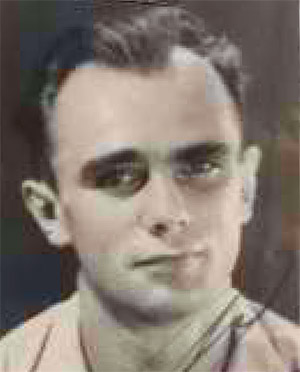
1946
|
13.6.1920
[Wronke] [German] |
Willi Mendel (later: Zeev Mendel) was born on June 13, 1920, in Wronke (Prussia until 1919; today: Wronki, Poland), the son of Simon Mendel, a merchant originally from Stralkowo, and Johanna (Chana) Cohen. Willi had one brother, Mordechai Günter (1915), and two older half-brothers: Herbert (1907) and Kurt (1909).
This profile is private.
Contact us to gain access to this profile. |
Milich, Meusche

1939
|
3.4.1914
[ Rawa ] |
Meusche Milich (Max Milich) was born on April 3, 1914, in Rawa Mazowiecka, Galicia (later: Poland), the son of Abraham Milich, and Presi (?) Peru (?) (Perl) née Lehrmann, from Rawa*. He had five siblings: Julius Schauell (1917), Rosa (1924), Ida (1926), Herman (1929) and Leo (1932).
This profile is private.
Contact us to gain access to this profile. |
Mirowski, Nathan

|
3.4.1916 |
Nathan Mirowski (later: Nathan Miron) was born on April 3, 1916, the son of Zeidel (or Yehuda?) Mirovsky and Zissel Sophie, née Bluestein. His place of birth, or the place of origin of his parents is not known. There is also no information on any potential siblings.
This profile is private.
Contact us to gain access to this profile. |
Mirowski, Zypra

|
30.5.1916
[Włocławek] |
Zypra Mirowski (née Nashelski, or Nasielski; later: Tsameret Miron) was born on May 30, 1916, in Włocławek (Poland), the second daughter of Haim Nashelski and Rona (Renah? Rene?) née Wolf. She had one sister, Hadassah, and two younger brothers, Arieh and Dov.
This profile is private.
Contact us to gain access to this profile. |
Mitelberg, Eliezer

|
19.1.1916 | |
Neufeld, Richard

|
16.5.1912
[Vienna] |
Richard Neufeld was born on May 16, 1912, in Vienna, the son of Benzion Neufeld, originally from Tluste (now Tovste, Ukraine) and Sara Weinstock, originally from Wertelka. He had five siblings: Rossel (Roza) (ca. 1898), Lisi (ca. 1902), Max (1906), Martha (1908) and Benyamin ().
This profile is private.
Contact us to gain access to this profile. |
Neurath, Artur

|
17.4.1907 [Nuremberg] |
Artur Neurath was born on April 17, 1907, in Nuremberg, the son of Michael Neurath from Mödling near Vienna, and Jeanette (née Geiringer), from Nuremberg. He had one sister, Gerda (1909).
This profile is private.
Contact us to gain access to this profile. |
Nussbaum, Thekla

|
26.12.1903 [Mansbach] |
Thekla Nussbaum was born on December 26, 1903 in Mansbach, Germany, the daughter of Schafte Nussbaum, from the nearby village of Hohenroda, and Hanna Johanna (Hannchen) Nussbaum (née Heiser), from Breitenbach am Herzberg. She had seven siblings: Jakob (1893), Isidor (1895), Joseph (1897-1918), Gerda (1898), Franziska (1901), Bella (1907), and Karl (later Mordechai Egosi) (1910).
This profile is private.
Contact us to gain access to this profile. |
Offen, Juljusz

|
4.4.1922
[Hamburg] [Polish] |
Julius Offen (later: Yehuda Offen) was born on April 4, 1922, in Hamburg (Altona), the son of Naftali Offen, from Zarszyn-Bochnia in Galicia (now Poland), and Taube, née Appelberg, from Bolszowce (now Bilshivtsi, Ukraine). He had one sister, Hanna (1924).
This profile is private.
Contact us to gain access to this profile. |
Ohlhausen, Fritz

|
2.9.1919
[Königsberg] |
Fritz Ohlhausen was born on September 2, 1919, in Königsberg (now Kaliningrad, Russia), the son of Adolph Abraham Ohlhausen, a merchant originally from Waibstadt, and Bertha née Levy, from Pillau (now Baltiysk, Russia). He had one sister, Fanny Liesel (Zippora) (1921).
This profile is private.
Contact us to gain access to this profile. |
Peiper, Hans

|
8.7.1913
[Stettin] |
Hans Peiper was born on July 8, 1913, in Stettin, Pommern (now Szczecin, Poland), the son of Mordche (Markus Mordechai Mordekai) Peiper, a merchant from Krakow, and Rosa Liebgol, also born in Krakow. He had one brother, Ludwig (1909), and two sisters, Hani (1912) and Thea (1917).
This profile is private.
Contact us to gain access to this profile. |
Perlmutter, Gizela

|
8.1.1897
[Krakow] |
Gisela Perlmutter (née Lack) was born on January 8, 1897, in Krakow, Austria (now Poland), the daughter of Samuel Lack, a merchant from Krakow, and Anna Lack (née Winkler). She had two brothers, Adolf (1895), and Maurycy Henryk (1900). Her mother died in 1917.
This profile is private.
Contact us to gain access to this profile. |
Proter, Hermann (Benno)
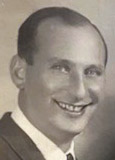
1946
|
3.1.1914
[Koln] |
Hermann (Benno) Proter was born on January 3, 1914, in Cologne, the son of Lejzor (Lippa, Eliezer, Leopold) Proter, from Galicia, and Rosa (née Hochhaus), from Mogielnica / Warszawa. Hermann had three siblings: Jakob (1911), Joseph (1918), and Selma (1921).
This profile is private.
Contact us to gain access to this profile. |
Proter, Selma
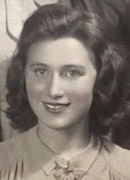
1946, courtesy Shlomit Proter
|
6.4.1921
[Koln] |
Selma Proter (later: Shulamit Cohen) was born on June 4, 1921, in Cologne, the daughter of Lejzor Lippa (Leyzer, Leopold) Proter and Rosa, née Hochhaus, from Mogielnica. Selma had three brothers: Jakob (1911), Hermann (1914), and Joseph (1918).
This profile is private.
Contact us to gain access to this profile. |
Rachwalsky, Gerhard

|
25.2.1912
[ Grossdorf-Braunau ] |
Gerhard Rachwalsky was born on February 25, 1912 in Grossdorf-Braunau in Bohemia, Austro-Hungaria (now Broumov, Czech Republic), the son of Felix Rachwalsky and Dora, née Faerber, from Breslau. Gerhard Rachwalsky is mentioned in Alfred Jordan's video testimony:
According to Alfred Jordan, Gerhard Rachwalsky continued to lead the group in Antwerp. Nothing else is known about him. Sources: |
Rauner, Hugo

|
10.2.1915
[Hargesheim] |
Hugo Rauner was born on February 10, 1915, in Hargesheim, the son of Arthur Rauner, from Rheinböllen, and Augusta née Posner, from Kippenheim. He had three siblings: Walter (Michael) (1912), Erika (1921). and Wolfgang (Wolf, later Ze'ev) (1927).
This profile is private.
Contact us to gain access to this profile. |
Rechtschaffen, Jakob

|
13.4.1922
[Stanislawow] |
Jakob Rechtschaffen (later: Yaakov Rechtschaffen) was born on April 13, 1922, in Stanislawow (or Stanisławów Voivodeship), Poland (now Ivano-Frankivsk, Ukraine). He was the son of Hermann Hirsch Tzvi Rechtschaffen, a merchant originally from Sliwki, Galicia, a village in the Ivano-Frankivsk Oblast, and Rachela, née Spiegel, originally from Landestreu, another village in the Ivano-Frankivsk Oblast. He had a younger sister, Dora (Dvora), born in 1926 in Homberg, in the Duisburg district.
This profile is private.
Contact us to gain access to this profile. |
Reifer, Toni

|
12.6.1916
[Leipzig] |
Toni Reifer (later: Toni Bear) was born on June 12, 1916, in Leipzig, the daughter of Shulam (Schalom) Reifer, from Storozynetz (Bukovina, now Ukraine), and Bertha Goldenzweig, from Lwow. She had two brothers, Josef (1911), and David (1913).
This profile is private.
Contact us to gain access to this profile. |
Reig, Simon

|
11.1.1909
[Leipzig] |
Simon Reig was born on January 11, 1909, in Leipzig, Germany, the son of Mortko (Markus) Reig-Kammer, a merchant originally from Chocin in the Carpathian Mountains (Galicia, Poland, now Ukraine), and Dresel (Reizel) née Neumann, from Tarnow (Galicia, now Poland). He had two siblings, Rachel (Rosa) (1910) amd Kalman (1916).
This profile is private.
Contact us to gain access to this profile. |
Roer, Kurt

|
31.1.1907
[Berg] |
Kurt Isaac Roer was born on January 31, 1907, in Berg near Landshut, Bavaria, the son of Moritz Roer and Selma née Marx. He had one sister, Ilse (1905).
This profile is private.
Contact us to gain access to this profile. |
Rosenthal, Ernst

|
10.12.1901 | |
Rothschild, Charlotte

|
17.3.1915
[Dermbach] |
Charlotte Lieselotte Rothschild (née Richheimer) was born on March 17, 1915, in Dermbach, Thuringia, the daughter of Salomon (Shlomo) Rischheimer, and Clara Gutmann, his second wife. Charlotte had two half-sisters: Lisbeth "Elisabeth" (1906) and Gertrude (1910 - 1933), and three sisters: Dina (1916 - 1934), Sitta (1921), and Ilse (1928).
This profile is private.
Contact us to gain access to this profile. |
Rothschild, Emil

|
3.9.1909 [Grünsfeld] ["Not Established"] |
Emil Rothschild was born on September 3, 1909, in Grünsfeld, a village in Baden, Germany, the son of Siegfried (Simon) Rothschild, a merchant from Grünsfeld, and Rosa Bierig, from Edelfingen, Baden-Württemberg. He had seven siblings: Irma (1903), Bruno (1904), Max (1905), Rita (1906), Elly (1911), Justin (1915) and Klementine (1917).
This profile is private.
Contact us to gain access to this profile. |
Rymald, Adolf

|
8.6.1921 | |
Sachsenhaus, Philipp

|
14.2.1912
[Munich] [Polish] |
Philipp Sachsenhaus (later: Pinchas Sachsenhaus) was born on February 14, 1912, in Munich, the son of Markus Sachsenhaus and Rebekka Banda. He had one sister, Mathilde (1917).
This profile is private.
Contact us to gain access to this profile. |
Sachsenhaus, Irmgard

|
17.5.1911
[Brake] |
Irmgard Sachsenhaus, née Berghausen, (later: Miriam Sachsenhaus) was born on May 17, 1911, in Brake/Lippe near Bremen, the daughter of Robert Berghausen, a cattle dealer, and Bertha Grueneberg. She had two siblings: Julius (1908) and Ruth (1913).
This profile is private.
Contact us to gain access to this profile. |
Sapierstein, Isaak

|
5.2.1916
[Chemnitz] [stateless] |
Isaak Sapirstein (later: Yitzhak Sapirstein) was born on February 5, 1916, in Chemnitz, the son of Josef Elstein, originally from Kherson (Ukraine), and Freida Sapirstein, originally from Sokolka (Poland). He had three siblings, Mirel (1913), Genda Debora (1914), and Sara Rebecka (1917). His father died in 1925 when Isaac was 9 years old.
This profile is private.
Contact us to gain access to this profile. |
Segal, Lipa

|
29.1.1905 | |
Segal, Srul

|
10.2.1911 | |
Simon, Adalbert

|
26.7.1892
[Berlin] |
Adalbert Simon was born on July 26, 1892, in Berlin. Adalbert Simon was one of the two oldest passengers on the Dora, and turned 47 during the crossing to Eretz Israel.
This profile is private.
Contact us to gain access to this profile. |
Simon, Bettina

|
12.11.1901
[Frankfurt] |
Bettina Simon, née Hirsch, was born on November 12, 1901, in Frankfurt. Bettina married Adalbert Simon in June 1923 in Frankfurt. One of the two witnesses was Ludwig Hirsch, 22 years old, presumably a brother of hers.
This profile is private.
Contact us to gain access to this profile. |
Schaefer, Kurt

|
23.4.1915
[Vienna] |
Kurt Schäfer was born on April 23, 1915, in Vienna, the son of Berthold Schäfer, from Pohrlitz, Moravia, Austria-Hungary (now Pohořelice, Czech Republic), and Rosina née Steinhauser, from Hörmanns, a village in Austria.
This profile is private.
Contact us to gain access to this profile. |
Schaefer, Ester

|
26.4.1916 | |
Schieber, Schiffre

|
25.1.1910 | |
Schlorch, Erich
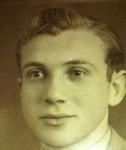
|
12.11.1915
[Obbach] [German] |
Erich Schlorch (later: Eric Shore) was born on November 12, 1915, in Obbach, Bavaria, the son of Emil Schlorch, from Obbach, and Sophie, née Silbermann, from Walsdorf (Bavaria). He had one sister, Irma (1913).
This profile is private.
Contact us to gain access to this profile. |
Schwarz, Bernhard

|
5.11.1918
[Mátészalka] |
Bernhard Schwarz was born in Mátészalka, Hungary, November 5, 1918, the son of Josef Schwarz and Serena, née Klein. He had (at least) one brother, Moritz (1912).
This profile is private.
Contact us to gain access to this profile. |
Schwarz, Ester

|
2.12.1918 | |
Schwarz, Kaete

|
9.10.1912 | |
Schwarz, Theodor

|
14.11.1916
[Chemnitz] |
Theodor Schwarz was born on November 14, 1916, in Chemnitz. Theodor Schwarz lived in Mainz in the 1930s. He emigrated in March 1937. |
Sokolski, Karol

|
14.2.1919
[Berlin] [Czech] |
Karol Sokolski (later: Yaakov Sokolski) was born on February 14, 1919, in Berlin, the son of Leiv and Miriam. He had at least one sibling.
This profile is private.
Contact us to gain access to this profile. |
Spiegel, Samuel
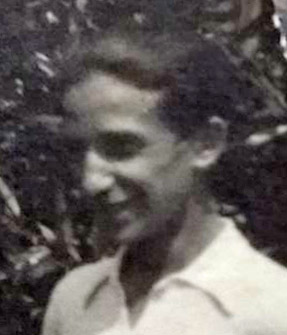
|
12.10.1913 [Irshava] |
Samuel Spiegel (later Shmuel "Moyle" Spiegel) was born on October 12, 1913, in Irshava, the son of Joseph (Yosef) Spiegel and Ronya, née Berger. The fourth child in a family of 11 [or 12?] children, he had 5 sisters and 5 [or 6?] brothers: Marek (Moshe) (1909), Isaac (1910), Ester (1911), Avraham (Bumi) (1915), Feigy (1917), Lea (1918), Beri Dov (1920), Malka (1921), Alex (1924), Helena (Henchi) (1926), and Ephraim Fishel (1928).
This profile is private.
Contact us to gain access to this profile. |
Spitz, Walter

|
27.11.1908
[Vienna] |
Walter Spitz was born on November 27, 1908, in Vienna, the son of Hugo Spitz, from Frýdek-Místek (Czechoslovakia), and Sidonie, née Bäck, from Dukovany (Czechoslovakia). He had two brothers, Alfred (1905) and Paul (1906).
This profile is private.
Contact us to gain access to this profile. |
Staendig, Charlotte
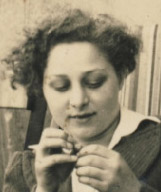
1938
|
26.1.1921*
[Herten] |
Charlotte (Lotte, "Lotchen") Staendig (Ständig) (later: Yael Neuhaus) was born on January 25, 1921, in Herten near Gelsenkirchen, the daughter of Moritz (Moses) Ständig and Rebecca Alpern. She had six siblings: Alexander (1917), Karl (1919), Max (1922), Leah (1931), Betty (1933), and Sabine (1934).
This profile is private.
Contact us to gain access to this profile. |
Staub, Leizor

|
7.6.1913
[Przeworsk] |
Leiser Staub (later: Eliezer Staub) was born on June 7, 1913, in Przeworsk, (Austrian Galicia, Poland after 1918), the son of Israel Staub, a merchant, and Chaje Frohlich (Berglas). He had one older brother, Ozyasz Samuel (Yehoshua) Staub (1905), and two sisters: Feige Staub (1903) and Curtel (later Curtel Russek) (1909). (A Sainwel Staub (1907) may have been yet another sibling).
This profile is private.
Contact us to gain access to this profile. |
Staub, Hanna

|
29.2.1916
Whitechapel, London |
Hanna Staub (née Feigenblum), was born on February 29, 1916 in Whitechapel, London, the daughter of Abraham Feigenblum, a cantor from Warsaw, and Esther Brzozowska*. Hanna had five siblings: Itzhak, born in Warsaw in 1908; Pincus Haim, born in 1909 in Warsaw; Rifka born in 1911 in Warsaw; Helena (Hinda), born in 1912 in Antwerp; and Lily, born in 1919 in London.
This profile is private.
Contact us to gain access to this profile. |
Stein, Peppi

|
22.1.1921 | |
Steinhauer, Max

|
13.1.1910 |
This *may be: Max Mordechai Steinhauer, born in 1910 in Berlin, the son of David Steinhauer and Hela Mindel Steinhauer (née Pufeles). One brother, Heinz J (Yakov Zvi) Steinhauer who emigrated to Johanesburg (1912 - 1981), and one sister, Esther Steinhauer, later Esther Sendal (1922 - 1986). If this is indeed the same person, Max Mordechai Steinhauer died in August 1986 in Tel Aviv and doesn't appear to have started a family. This entry cannot be confirmed as the date of birth is too vague ("1910"). Leaving here as a placeholder until more information becomes available. Sources: |
Stern, Albert
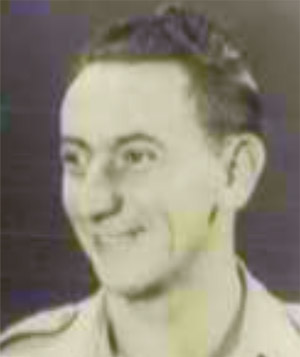
1948
|
30.7.1916
[Geisa] |
Albert Aron Stern was born on July 30, 1916, in Geisa, Thuringia, the son of Adolf Avraham Stern, from Geisa, and Sitta Sidonie, née Schwahn, from Treysa, Hesse. He had two siblings: Martin Werner (1915), and Marga (1919).
This profile is private.
Contact us to gain access to this profile. |
Stillmann, Guenther
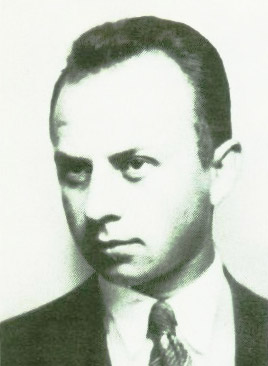
|
2.5.1912
[Berlin] |
Günter Stillmann was born on May 2, 1912, in Berlin, the son of Arnold Stillmann, a commercial employee (other sources have "merchant") from Gleiwitz (now Poland), and Betty, née Kohls. He had one brother, Kurt (1916). His mother died in October 1918 when he was 6 years old. A year later, in May 1919, his father married again, to Else Goldmann. They would divorce five years later in May 1924.
This profile is private.
Contact us to gain access to this profile. |
Stoppelmann, Siegfried

|
5.10.1913
[Aurich] |
Siegfried Stoppelmann was born on October 5, 1913, in Aurich, Lower Saxony, Germany, the son of Gerson Stoppelmann, from Aurich, and Minna Wolff, from Schapen. He had a brother, Norbert Nathan Stoppelmann who died in 1935.
This profile is private.
Contact us to gain access to this profile. |
Storch, Hillel

|
16.1.1899
[Rozdol] |
Hillel Storch was born on January 16, 1899 in Rozdol in Austrian Galicia (after 1918, Poland, now Ukraine). His family came to Vienna in 1909.
This profile is private.
Contact us to gain access to this profile. |
Strauss, Kurt

|
5.2.1909
[Berlin] |
Kurt Alexander Strauss was born on February 5, 1909, in Berlin, the son of Anschel Löb Leopold Strauss, from Frücht, and Ida Falkenstein, from Konitz (now Chojnice, Poland). He had two brothers: Fritz (1904) and Werner (Zvi Shimshon) (1914).
This profile is private.
Contact us to gain access to this profile. |
Struck, Adelheid
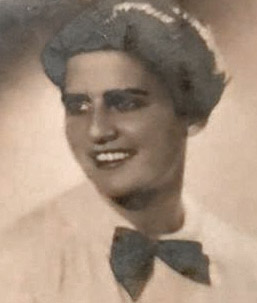
|
18.5.1911
[Köln] |
Adelheid Struck (later: Adelheid Wangenheim) was born on May 18, 1911, in Köln, the daughter of Hermannn Struck and Selma Schlesinger. She had two siblings, Ruth and Rudolf (Rudi).
This profile is private.
Contact us to gain access to this profile. |
Treu, Guenther

|
7.11.1911
[Magdeburg] [Polish] |
Guenther Treu (later: Yosef Treu) was born on November 7, 1911, in Magdeburg, the son of Erwin Treu, from Berlin, and Martha Langer, from Magdeburg. He had one sister, Eva Henriette (1926).
This profile is private.
Contact us to gain access to this profile. |
Ucko, Hermann

1937
|
26.11.1910
[Leipzig] |
Hermann Heinrich Ucko was born on November 26, 1910, in Leipzig, the son of Ernst Ucko, from Breslau (now Wrocław, Poland), and Toiba (Therese, Tova) née Gerschenowitz, from Stolbtsy (Stowbtsy, Belarus).
This profile is private.
Contact us to gain access to this profile. |
Ucko, Annemarie

|
29.6.1916
[Leipzig] |
Annemarie Ucko (née Schussheim) was born on June 29, 1916, in Leipzig, the daughter of Siegfried Schussheim, a merchant originally from Jaroslaw (Galicia, now Poland), and Frieda Schussheim (née Goldstein). She had two brothers, Heinrich (1910) and Gunter (later: Gerald Shaw) (1913).
This profile is private.
Contact us to gain access to this profile. |
Unger, Karl*

|
6.4.1915
[Budapest] [Romanian, stateless] |
Karl Ungar was born on April 6, 1915, in Budapest, the son of Dwojra Perl Ungar, née Kaubert. It is likely that his biological father, (?) Ungar died early and that his mother remarried a Feibisz Kerner. Karl had a (half?) brother, Siegfried Kerner (or Körner) (1920). His mother, Dora Körner f. Ungar-Kaubert, died in 1924.
This profile is private.
Contact us to gain access to this profile. |
Wadler, Adolf

|
25.8.1899
[Budapest] [Austria] |
Adolf Wadler was born on August 25, 1899, in Budapest, the son of (unknown) and Lina Wadler, from Tarnow.
This profile is private.
Contact us to gain access to this profile. |
Wadler, Netti

|
4.7.1907
[Gura Humora] |
Netty Wadler was born on July 4, 1907, in Gura Humora (Gura Humorului - Romania). (Most probably née Netty Schneider.) She was married to Adolf Wadler, another Dora passenger. The couple lived in Vienna, and she was a personal cook. They left Vienna and came to Antwerp sometime between mid-May 1938 and mid-July 1939, where they boarded the Dora to Palestine. No further information is available. Sources: |
Wassertheil, Ester
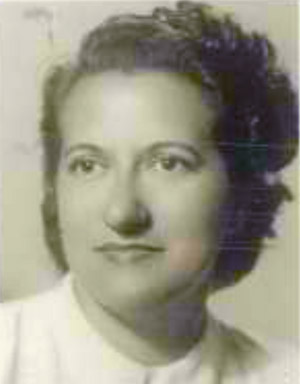
1948
|
6.3.1917
[Chrzanow] |
Esther Wassertheil (later: Ester Stern) was born on March 6, 1917, in Chrzanow, Poland (Galicia), the daughter of Naftali Hertz Wasserteil and Sara Mindel, née Wietschner. She had six siblings: Josef (1898), Rosa (1901), Tzila (1903), Hanka (1906), Charlotte (1908), and Jehuda (Idel) (1913).
This profile is private.
Contact us to gain access to this profile. |
Weil, Susi

|
18.11.1914
[Eschwege] [German] |
Susi Weil was born on November 18, 1914, in Eschwege, the daughter of Oskar Weil and Eva Rosa Levy. She had one brother, Helmut Zvi Paul Weil (1917). Her father died in 1932 in Dessau.
This profile is private.
Contact us to gain access to this profile. |
Weiss, Ludwig

|
2.4.1915 |
This may be one Arieh (Ludwig) Weiss, whose date of birth is reversed and incorrectly listed as February 4 instead of April 2 in various online family trees: Arieh (Ludwig) Weiss was born on April 2, 1915, in Romania. [According to the 1948 US Alien manifest, in "Civmelis"; in "Giulmelcis" according to online trees. Neither seem to exist.]
This profile is private.
Contact us to gain access to this profile. |
Werner, Heinz

|
9.6.1912
[Siegmar-Schönau] |
Heinz Werner was born on June 9, 1912, in Siegmar-Schönau, Chemnitz, Germany. At the time of the German Minority Census of May 1939, he lived in Berlin (Mitte) (Chausseestr. 57,II), he was 27 years old and was single. He left Berlin and came to Antwerp sometime between mid-May and mid-July 1939, from where he boarded the Dora. No further information is available. Sources: |
Winterfeld, Artur

|
3.10.1916
[Stolp] |
Alfred Arthur Winterfeld was born in Stolp, Pomerania, (now Słupsk, Poland) on October 3, 1916.
This profile is private.
Contact us to gain access to this profile. |
Wolff, Arnold
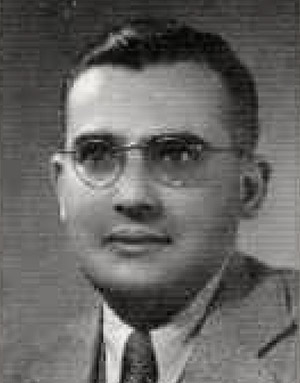
1947
|
4.3.1914
[Stettin] |
Arnold Wolff was born on March 4, 1914, in Stettin (now Szczecin, Poland), the only child of Hermann Wolff, from Rheinbrohl, and Henriette, née Gompertz, from Wesel.
This profile is private.
Contact us to gain access to this profile. |
Wolff, Ernst

|
19.6.1905
[Briesen] [German] |
Ernst Wolff (later: Yehuda Wolff) was born on June 19, 1905, in Briesen, Brandenburg, the son of Wilhelm (Zeev) Wolff, a medical doctor, and Hermione Neisser, from Katscher, Upper Silesia (now Kietrz, Poland). He had five siblings: Hanne (1896), Martin (1898), Karl (1900), Gustave (1904), and Arnold Simon (1906). His father died in 1920 when Ernst was 15 years old. Ernst married Irma Lion in September 1933 in Nordeck.
This profile is private.
Contact us to gain access to this profile. |
Wolff, Ilse

|
12.1.1911
[Oppeln] [German] |
Ilse Wolff née Heymann was born on January 12, 1911, in Oppeln, Upper Silesia (now Opole, Poland), the daughter of Albert Heymann, a merchant from Radau, Upper Silesia (now Radawie, Poland), and Helene, née Heymann, from Lugnian, Upper Silesia (now Łubniany, Poland).
This profile is private.
Contact us to gain access to this profile. |
Wolff, Irma

|
7.2.1906
[Nordeck über Giessen] [German] |
Irma Wolff née Lion was born on February 7, 1906, in Nordeck über Giessen, the daughter of Adolph (Abraham) Lion, a merchant from Nordeck, and Frieda Fanny Grünewald, from Bischofsheim. She had four siblings: Ludwig (1909), Betty (1911), Jacob Julius (1915), and Walter Nathan (1920). Irma married Ernst Wolf in September 1933 in Nordeck.
This profile is private.
Contact us to gain access to this profile. |
Zajac, Adolf

|
19.12.1920 | |
Zinn, Abraham

|
22.3.1904 | |
Deresiewicz, Anna

|
11.10.1909
[Kraków] |
Anna Deresiewicz (née Austern) was born on October 10, 1909, in Podgorze, Kraków, the daughter of Abraham Austern and Batia née Stein. She had seven siblings: Chiel Yechiel (1895), Leah (1897), Isaac (1900), Dawid (1903-1911), Stefania (1906), Israel Meir (1908), and Rosa. Her father died in 1913, when Anna was 4. Her mother died in 1934.
This profile is private.
Contact us to gain access to this profile. |
Deresiewicz, Mordohe

|
15.6.1905
[Ustrzyki Dolne] [Polish] |
Markus (Mordohe, Mordechai) Deresiewicz was born in Ustrzyki Dolne, Austro-Hungarian Galicia, (now Poland), on June 15, 1905, the son of Leib (Leibisch) Deresiewicz, a timber dealer from Limanowa, and Hendel Helena Schönberg, from Chrzanów. He had (at least) three brothers: Simche (1901), Jakob (1907), Ascher (1909), and one sister, Toni (1911).
This profile is private.
Contact us to gain access to this profile. |
Schlosser, Josef

|
21.3.1919
[Graz, Austria] |
Josef Schlosser was born on March 21, 1919, in Graz, Austria, the son of [Reimund (Rachmiel)?] Schlosser and [Miria Suppan ?]. He had [at least] four siblings: Gizella (ca 1907), Leopold (1912), Berta (1915), and Regina (1916).
This profile is private.
Contact us to gain access to this profile. |
Wallach, Siegfried

1948
|
25.5.1921
[Vienna] |
Siegfried Wallach was born on May 25, 1921, in Vienna, the son of Beno Wallach, a civil servant originally from Chernivtsi, Bukovina (now Ukraine), and Mali Engler, a housewife originally from Sadhora (now Ukraine). He had one brother, Wilhelm (1918).
This profile is private.
Contact us to gain access to this profile. |
Bezner, Markus

|
21.3.1910*
[Czortkow] |
Marcus Bezner (later: Mordechai Bezner) was born on April 1 (or March 21?), 1910, in Czortkow (Galicia, Poland, now Chortkiv, Ukraine), the son of Baruch Bezner and Henya (Henie) Glinert (or Boruch Mariasz and Henie Bezner)**. He had four siblings: Leib (Leon) (1895), Perl (1896), Chaja (1899), and Salomon Moshe Lumek (1904). His father died around 1917***, killed in a pogrom.
This profile is private.
Contact us to gain access to this profile. |
Landau, Regine

|
30.11.1897 [Zbaraz] |
Regine (Regina, Genia) Landau was born on November 30, 1897, in Zbaraz (Galicia, now Ukraine), the daughter of Chaskel (Yehezkel) Landau, and Basie Breine (Batya) Landau (née Roniger), both from Galicia. She had six siblings: Salo (1888), Ludwik (1889), Max Munio (1892), Ignatz (1893), Sabine (Sophie)(1896), Aurelia (Rela) (1902). Her brother Salo died in 1922. Nothing is known about her life or how she made her way to Antwerp and to the Dora. She may have lived in Vienna like her brothers Max and Ignatz, before leaving for Belgium. If so, she presumably would have left before the Anschluss as there are no emigration forms with her name from the IKG. Regine Landau's name appears out of alphabetical order at the bottom of the Antwerp list, suggesting that she was a last-minute addition to the passenger list. She doesn't seem to have started a family. Regina (Genia) Landau died in Israel. Her brother Ludvik (Ludwig) Landau, a physician who was born and lived in Zbarazh. Ludwig, his wife and two daughters spent 1941-1942 in the Zbaraż ghetto, before escaping, with the help of Aryan papers. He was one of only 60 Zbarazh Jews who survived the war of the 3000 who had lived in the town before the war. Her brother, Max Munio (Moshe) Landau, emigrated from Austria to Palestine in 1933. He was a member of the nucleus "Batlem" and a founder of Kibbutz Ein Gev. Her brother, Ignatz Landau, filled out an emigration application in Vienna in May 1938 with the Jewish Community of Vienna (Israelitische Kultusgemeinde). He had lived in Vienna since 1914 and was a pharmacist. He emigrated to the United States. Sources: *The passenger list has November 31. |
Hacker, Adolf
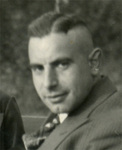
|
23.10.1902 [Erfurt] |
Adolf Hacker (later: Avraham Hacker) was born on October 23, 1902, in Erfurt, Thuringia, the son of Hermann (Hirsch, Hersh) Hacker and Anna, née Ardel. He had three siblings: Betty (1896), Erich, and a half-brother, Siegfried. His mother died in 1912 when he was 9 years old. His father later wed Selma Bibo in a second marriage.
This profile is private.
Contact us to gain access to this profile. |
Hacker, Marie

|
16.6.1907
[Eisleben] |
Mary Hacker (née Mary Burak) was born on June 16, 1907, in Eisleben, Saxony-Anhalt, Germany, the daughter of Moses Burak, from Kolomyya (Ukraine), and Klara Bratel, from Eisleben. She had three brothers: Paul Pinkhas (1900), Arthur Avraham (1902), and Wilhelm "Willy" (Ze'ev) (1905). The family had a shoe shop in Eisleben and was quite wealthy.
This profile is private.
Contact us to gain access to this profile. |
Additional Passengers
Contemporary reports state that the Dora transported 480 people. 178 are accounted for on the Amsterdam lists (182, minus the four crossed-out names), and 171 on the Antwerp list, leaving 171 additional passengers not included on lists that have been found so far. (Note that some of the people
These were either refugees, teenage orphans, possibly some wealthy individuals or families, leaders of various Jewish organizations, and people with connections. It is assumed that most, if not all, of these passengers boarded in Amsterdam, as the Antwerp list appears to be comprehensive.
The lists below include the names of people who are known to have boarded the Dora, and whose names don't appear in either the Amsterdam or Antwerp lists.
To date, 31 of these unaffiliated passengers have been identified, with an estimated 140 more still unknown. 25 of those boarded from Amsterdam, one in Antwerp. For the remaining five, the port of departure is not known.
A few passengers mentioned the presence of about ten teenage orphans on the Dora. To date, only one has been identified, Johanna Jacob.
List 3: Additional passengers who boarded in Amsterdam (not on the Hechalutz Lists)
| Name | D.O.B | Bio |
Altberger, Samuel

|
17.07.1912
Frankfurt am Main [ Czech ] |
Samuel ("Sanny") Altberger was born on July 17, 1912, in Frankfurt am Main, the son of Lazar (Ludwig) Altberger and Regina Elias, the sixth of nine children. The family originally came to Germany from the Czech-Hungarian border area at the beginning of the 20th century. His father was a shoe dealer who had three shops on the market square. Sanny's mother died in 1927 Cologne, followed by his father two years later in 1929 in Brunn, Thuringia.
This profile is private.
Contact us to gain access to this profile. |
Berlinger, Simon

|
11.06.1914
Berlichingen [ German ] |
Simon Berlinger was born on June 11, 1914, in Berlichingen, Germany, the son of Ahron Berlinger and Babette (Betty) Sulzbacher. The eighth of ten children, he had six brothers and three sisters: Selma (Schefa, Sheva) (1903), Elieser (1904), Asher (1906), Naftali (1907), Wolf (Zeev) (1909), Michael (1910), Jaakov (1915), Hanna (1918), and (?).
This profile is private.
Contact us to gain access to this profile. |
Brandt, Lutz
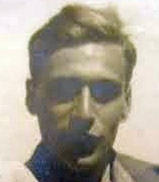
1940s
|
14.3.1921
Germany |
Lutz Brandt (later: Shaul Bar Neta) was born on March 14, 1921, in Berlin, the son of David and Margareta Brandt.
This profile is private.
Contact us to gain access to this profile. |
Cosmann, Fritz
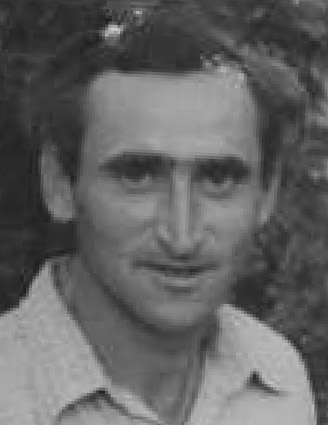
1945
|
10.3.1910
Recklinghausen [ German ] |
Fritz Cosmann (later: Shimon Cosmann) was born in Recklinghausen (Westphalia) on March 10, 1910, the son of Otto and Anna Cosmann, née Weil. He had two (or three?) sisters: Ella (1904)*, Luise (1906), and Lilly (1908).
This profile is private.
Contact us to gain access to this profile. |
Dehmel, Ernst

|
Ernst Dehmel is mentioned in Günter Stillman's book "Berlin - Palästina und zurück" (p.78) as a passenger on the Dora, and one of only three Communists on the Dora besides him. |
|
Elsoffer, Siegfried Adolf

Stalag XI, ca. 1941-1943
|
28.6.1918
Berlin |
Siegfried "Friedel" Adolf Elsoffer, (later: George Samuel Elsoffer) was born on June 28, 1918, in Berlin, the son of Alex Elsoffer, originally from Giesen.
This profile is private.
Contact us to gain access to this profile. |
Elsoffer, Regina ("Gina") (née Milgram)

|
1.7.1920
Katowice [ "Stateless" ] |
Regina Elsoffer (née Milgram) (later: Gina Merkel), was born on July 1, 1920, in Kattowitz, Prussia (later: Katowice, Poland), the daughter of Simon Milgram, from Siedlce, and Dworja (Dora) Braniki, from Warsaw. She had five siblings: Laja (Lotte) (1911, Warsaw), Joel (?), Gedalja (Gedalya) (1918, Warsaw), Jakob (Yaakov) (1923, Gleiwitz), and Ilda (Hilde, Hilda, Ida) (1927, Gleiwitz).
This profile is private.
Contact us to gain access to this profile. |
Färber, Bernard

|
20.5.1901
Oswiecim |
Bernard Färber was born on May 20, 1901, in Oświęcim (Auschwitz), Austria-Hungary (after 1918: Poland.)
This profile is private.
Contact us to gain access to this profile. |
Färber, Cirl Fradel

|
15.10.1909
Podgorze |
Fradel-Cirl Färber née Hoffnung was born on October 15 1909, in Josefstadt, Galicia (now Podgórze, Poland), a district of Kraków.
This profile is private.
Contact us to gain access to this profile. |
Friedmann, Fritz

|
23.7.1913
Rossosz, Poland |
Fritz Friedmann (later: Schulim Friedmann) was born on July 23, 1913, in Rossosz, Biała County, Poland, the son of Pinchas and Esther Friedman.
This profile is private.
Contact us to gain access to this profile. |
Frohmann, Heinz
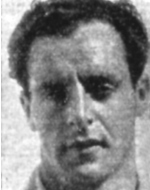
|
22.7.1919
Bochum [ stateless ] |
Although unconfirmed, it is believed that Haim Frohmann was on the Dora based on circumstantial evidence. According to his Yizkor page, "Before the outbreak of World War II, he fled from Germany to the Netherlands and arrived in Israel on an immigration ship in 1939."
This profile is private.
Contact us to gain access to this profile. |
Henle, Walter
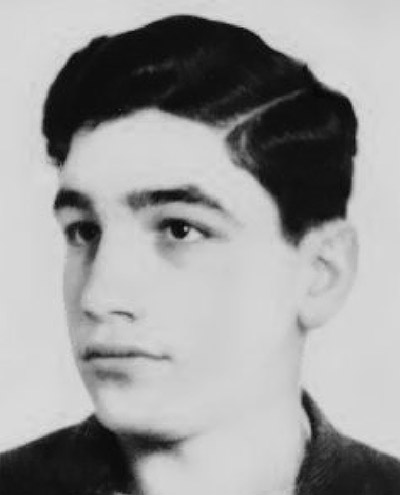
|
24.5.1921
Munich |
Walter Henle was born on May 24, 1921, in Munich, the youngest son of Albert Henle, a grain wholesaler originally from Heilbronn, and Anna Lederer, born in Reutlingen. Walter had one brother, Fritz Richard (1916).
This profile is private.
Contact us to gain access to this profile. |
Kardos, Ernest
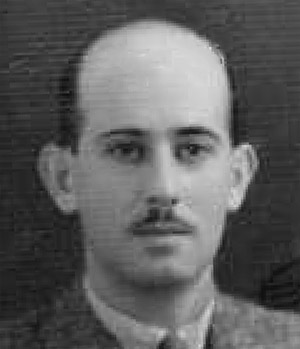
1947
|
28.07.1916
Vienna |
Ernst Kardos (later: Dan Yaron) was born on July 28, 1916, in Vienna, the son of Emerich (Imre) Kardos and Leontine Wolf. He had four siblings: Margit (1911 or 1912), Edith (1913), Hans (later: Gershon Yaron) (1921) and Mara Angelica (1926). Ernst's father fought in the infantry in the Austrian army during World War I and died in 1934 when Ernst was 18 years old. Ernst's mother died a year later in 1935.
This profile is private.
Contact us to gain access to this profile. |
Kardos, Hans

|
29.11.1921 |
Hans Kardos (later: Gershon Yaron) was born in Vienna on November 29, 1921, the son of Emerich Kardos and Leontine Wolf. He had four siblings: Margit (1912), Edith (1913), Ernest (later Dan Yaron)(1916), and Mara (Angelica Kip) (1926).
This profile is private.
Contact us to gain access to this profile. |
Kaufmann, Leo
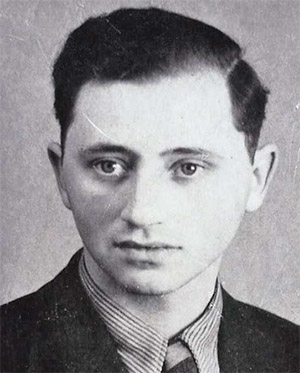
|
12.9.1912 |
Leo Arje Kaufmann was born on September 12, 1912, in Hamborn, the son of Max (Meschulim) Kaufmann and Ida (Jitte), née Haber. Leo had seven siblings: one brother, Samuel (1910), and six sisters: Sara (1911), twins Peril and Mirjam (both died as infants), Charlotte (1915), Esther (Erna)(1916), and Selma (1917).
This profile is private.
Contact us to gain access to this profile. |
Moll, Ernst

|
[11.3.1909] |
Ernst Moll (later: Raphael Moll) was born in Schwanenberg, Germany in 1909, the son of Hermann Moll, from Schwanenberg, and Rosalie née Schmidt. He had (at least) one sister, Julie Gerda (1906).
This profile is private.
Contact us to gain access to this profile. |
Schwarz, Hertha Helena

|
8.8.1910
Bonn |
Hertha Helene Schwarz was born on August 8, 1910, in Bonn, the daughter of Emil Schwarz, from Wallhausen, and Jetta (Henriette) Weber, from Bonn. She had five siblings: Erich Emil (1905), Hildegard (1906), Irmgard (1907), Arthur (ca 1911), and Werner Egon (1918). Her mother died in 1931.
This profile is private.
Contact us to gain access to this profile. |
Seinfeld, Philip

|
4.4.1920
Vienna |
Philip Seinfeld (Pinchas Seinfeld) was born on April 4, 1920, in Vienna, the son of Leon Leib Seinfeld, a merchant and hat maker originally from Stanislau, and Josephine, née Deak, a milliner from Vienna. Philip had three brothers: Hermann (1910), Egon (1912) and Isidore (1922), and three sisters: Regine (1917), Hanna (1918) and Rosi (1929).
This profile is private.
Contact us to gain access to this profile. |
Waller, Heinz
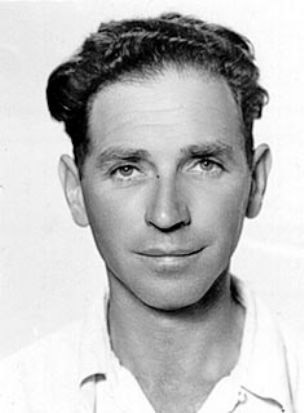
|
21.05.1920
Schwiebus, Germany |
Heinz Waller (later: Haim Waller) was born on May 21, 1920, in Schwiebus, a small town East of Berlin, (now Świebodzin, Poland), the son of Sally Waller, from Cologne, and Rosa née Blumenthal, from Samotschin (now Szamocin, Poland). He had one brother, Herbert (1912).
This profile is private.
Contact us to gain access to this profile. |
Weinberg, Lutz

|
26.05.1920
[ Berlin ] |
Ludwig (Lutz) Weinberg (later: Dan Karmi) was born on May 26, 1920, in Berlin, the son of Fritz Weinberg, from Breslau, and Hedwig Brandt, from Berlin. He had one sister, Liselotte. His father died in 1937 when Lutz was not yet 17.
This profile is private.
Contact us to gain access to this profile. |
Julius, Hans

|
Hans Julius (or Juius Hans?) is mentioned by Heinz (Haim) Waller as a friend from the Hoek Van Holland refugee camp who also came to Israel on the Dora. |
|
Sterberg, Riemann

|
Sterberg Riemann (or Riemann Sterberg? Sternberg?) is mentioned by Heinz (Haim) Waller as a friend from the Hoek Van Holland refugee camp who also came to Israel on the Dora. |
|
Kerner, Arthur

|
Arthur Kerner is mentioned by Heinz (Haim) Waller as a friend from the Hoek Van Holland refugee camp who also came to Israel on the Dora. |
|
Ronis, Max

|
Max Ronis is mentioned by Heinz (Haim) Waller as a friend from the Hoek Van Holland refugee camp who also came to Israel on the Dora. |
|
Zamiri, Moshe

|
Sources: |
List 4: Additional passengers who boarded in Antwerp - not on the Antwerp list
The Antwerp list, which seems to have been compiled by the Belgian authorities, was assumed to be comprehensive. At least one passenger, Ilse Neurath, is assumed to have boarded the Dora from Antwerp with her husband Artur Neurath. While his name is on the Antwerp list, her name is not.
| Name | D.O.B | Bio |
Neurath, Ilse

|
[25.06.1907]
[Hamborn] |
Ilse Neurath (née Kaufmann) was born on June 25, 1907, in Bruckhausen, Dinslaken, near Hamborn* (now Duisburg), the daughter of Isidor Kaufmann, a merchant originally from Bad Münstereifel, and Selma (née Löwy), from Beuthen. She had two siblings, Edith Ester (1905), and Gunter.
This profile is private.
Contact us to gain access to this profile. |
List 5: Additional passengers who boarded either in Amsterdam or Antwerp (and don't appear on any list)
The following passengers are known to have been on the Dora, but there is no information regarding their place of departure.
| Name | D.O.B Place of Birth |
Bio |
Erster, Oskar
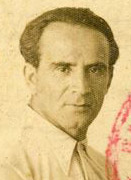
|
22.11.1903
Nowosielec, Galicia (Poland) |
Oskar Erster (later: Yaakov Erster) was born in Nowosielec, Galicia, on November 22, 1903, the son of Abel Erster (from Bolechow, Galicia) and Miriam Ginzberg. He was the youngest of thirteen children.
This profile is private.
Contact us to gain access to this profile. |
Jacob, Johanna

|
05.07.1924
Berlin |
Johanna Jacob (later: Hannah Katz) was born on July 5, 1924, in Berlin, the daughter of Ludwig Jacob - presumably Louis Jacob, from Kempen, Posen (now Kepno, Poland).
This profile is private.
Contact us to gain access to this profile. |
Melamed, Zeev (Willy)
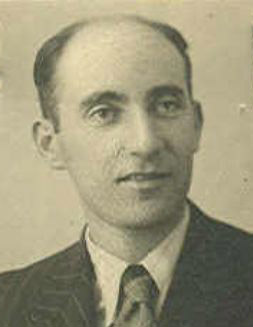
|
26.06.1907
Łańcut, Poland |
Wolf Willi Melamed (later: Zeev Melamed) was born on June 26, 1907, in Lancut, (Landshut, Austria-Hungary, later: Łańcut, Poland), the son of Mordechai Markus Melamed, a merchant from Dynów, Austrian Galicia (now Poland), and Chaya Lea Oster, from Lancut. He had two siblings: Israel (1892), and Ester (later Ester Adele Freier) (1901).
This profile is private.
Contact us to gain access to this profile. |
Perlmuter, Amalia

|
20.9.1911
"Poland" |
Amalia (Malka) Perlmuter (née Bogomilny/Bohomilny) was born on September 20, 1911, in Krakow (or in the Krakow area), (then Austria-Hungary, now Poland), the daughter of Dawid Bohomilny (בוֹגוֹמִילְני), from Spiczyn, (Lublin Guberniya, Russia, now Poland), and Reizel Bernstein, from Oswiecim (Auschwitz). Her mother died at an early age, and her father married Sara Blumenfeld from Tarnow in 1919. Amalia had one sister, Rozalia (1913-1933), and (presumably) a half-brother, Bernard Blumenfeld. Amalia's family moved to Vienna when she was a child. Her father was a head cantor at the Döbling Synagogue. Amalia married Nahum Perlmuter on July 10, 1938, on Leopoldsgasse, presumably in the Polnische Schul ("Polish Synagogue") at No. 26, which primarily served Galician/Polish Jews. The couple left Vienna at the end of November 1938. It is unclear whether they came to the Netherlands or to Belgium. Amalia was in the early months of pregnancy when she sailed on the Dora. The couple lived in Tel Aviv in 1944 and had two children. Amalia (Malka) Perlmuter (née Bohomilny) is buried in Holon. Her father, David Bohomilny (Bohomolny), chief cantor, died in February 1937 in Vienna. Her stepmother, Sara Bohomilny, née Blumenfeld, was deported on May 27, 1942, from Vienna to Maly Trostinec, where she was murdered on June 1, 1942. Sources: Her father's surname appeared as both "Bohomilny" and "Bogomilny" in the Jewish press in Vienna. |
Perlmuter, Nahum

|
23.4.1911
"Poland" |
Nahum (Nuchim) Perlmuter was born on April 23, 1911, probably in Leszniow, (Galicia, now Ukraine), the son of Gabriel Perlmuter, from Budzanöw, and Rachel (Rose), from Grzymalow. He had (at least) one brother, Samuel (1925). The family moved to Vienna in 1915 while he was still an infant. There, his father was employed by the Jewish Community as a Kashrut inspector. His mother was an embroiderer ("Weißnäherin"). Nahum married Amalia Bohomilny on July 10, 1938, on Leopoldsgasse, most likely in the Polnische Schul ("Polish Synagogue") at No. 26, which primarily served Galician/Polish Jews. On November 21, 1938, Nahum filled out an application for emigration with the IKG. At the time, the couple lived at Wipplingerstrasse 35, in the first district of Vienna. He was a bag maker, but, like most people submitting applications, was unemployed and had no money to contribute towaards his emigration. He was stateless, and, as for a desired destination, he simply wrote: "egal", "doesn't matter". (The November submission date is surprising; most of the Jewish residents filled out applications in the spring of 1938. The rare exceptions seem to have been from people who had previously been out of the country - often incarcerated in Germany. The couple however was in Vienna in July at the time of their marriage.) The couple received 70 RM towards their travel expense that day. They most likely left Vienna immediately afterwards. It is not known whether they came to the Netherlands or Belgium. The couple lived in Tel Aviv in 1944 and had two children. His father, Yohanan Gabriel Perlmuter, died in Haifa. Sources: |
List 6: Names of people from the Amsterdam list who didn't board the Dora
Four names on the handwritten list called "Dat Waarez - Left on the Dora" are crossed out. These names are also missing the red "V" checkmark ("vertrokken" = left) found next to all other names. They all belonged to the Mizrachi Kibbutz Dat veEretz in Beverwijk. It seems that these people didn't leave on the Dora as planned.
It is possible that, at least for three of them, they came as a group that got lost on the way and arrived after the Dora had sailed. It is also possible that one of them (Moses Kohn) was convinced to come back to shore.
| Name | Pioneer Organization | D.O.B | Bio |
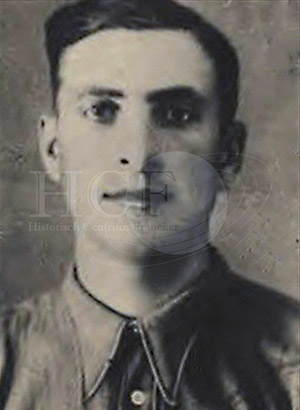
Date unknown.
|
Mizrachi Kibbutz Dat veEretz, Beverwijk Vereeniging "Dat Waarez" (Bachad) Beverwijk: Velsen-Noord |
[6.12.1913] [Pressburg] |
Benjamin Bernhard Katz was born on December 6, 1913, in Pressburg*, Austria-Hungary (now Bratislava, Slovakia), the son of Baruch Katz, a dairy merchant, and Cecilia (Cäzilie, Sidonie, Tzipora) née Hacker, a housewife and seamstress/embroiderer ("Weißnäherin"), both of them Deutschkreutz natives. He had five siblings: Lea (Deutschkreutz, 1907), Gershon (Gesha) (Deutschkreutz, 1908), Emanuel (Pressburg, 1911), Ignatz (Yitzhak) (Pressburg, 1916), and Kathe (Katharina, Katerina, Ester) (Deutschkreutz, 1924).
This profile is private.
Contact us to gain access to this profile. |
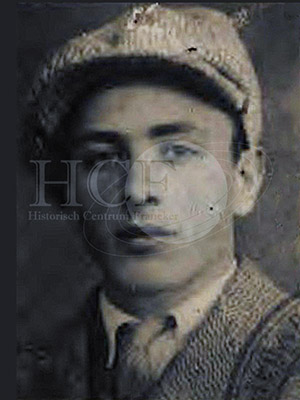
Date unknown.
|
Mizrachi Kibbutz Dat veEretz, Beverwijk Vereeniging "Dat Waarez" (Bachad) Beverwijk: Velsen-Noord |
[19.1.1916] [Pressburg] |
Ignatz (later: Yitzhak) Katz was born on January 19, 1916, in Pressburg*, Austria-Hungary (now Bratislava, Slovakia), the son of Baruch Katz, a dairy merchant, and Cecilia (Cäzilie, Sidonie, Tzipora) née Hacker, both of them from Deutschkreutz. He had five siblings: Lea (Deutschkreutz, 1907), Gershon (Gesha) (Deutschkreutz, 1908), Emanuel (Pressburg, 1911), Benjamin (Pressburg, 1913), and Kathe (Katharina, Katerina, Ester) (Deutschkreutz, 1924).
This profile is private.
Contact us to gain access to this profile. |

|
Mizrachi Kibbutz Dat veEretz, Beverwijk |
[4.4.1920]
[Leipzig] |
Moses (Maurice) Kohn was born on April 4, 1920, in Leipzig, the oldest child of Markus (Max) Kohn, from Kałusz, Galicia, Austria, (later Kalush, Poland, now Ukraine), and Lena Ascheim, from Berlin. He had four siblings: Shimshon (Simion) (1920-1927), Zilli (Celia) (1923), Toni (1925), and Raphael (Ralph) (1927).
This profile is private.
Contact us to gain access to this profile. |

|
Mizrachi Kibbutz Dat veEretz, Beverwijk Vereeniging "Dat Waarez" (Bachad) Amsterdam Beverwijk: Velsen-Noord |
16.7.17
Łódź Polish |
Hannah Rubinstein was born on July 16, 1917, in Łódź, the daughter of Hersz Lajb (Hirsch Leib, Hermann Hersz Leib) Rubinstein, from Lodz, and Charlotte Tichauer, from Beuthen, Silesia (now Bytom, Poland). She (maybe) had (at least) one sister, Lili (1918). She later resided in Lübeck before moving to Breslau in January 1936.
This profile is private.
Contact us to gain access to this profile. |
List 7: People who planned to board the Dora
According to some of the organizers, the Dora was supposed to pick up another 100 passengers from Le Havre in France. Aside from a couple of brief mentions, there are no details about the composition or the size of such group, their location, or their eventual fate.
It is of course impossible to know how many people wanted to board the Dora but were not able to secure a place. We know however of two stories
| Name | Pioneer Organization | D.O.B | Bio | ||

|
Sophie Charlotte (Lotte) Wald (later: Nira Schnurmann) was born on February 17, 1916, in Bochum, the daughter of Richard Wald and Isabella (Ilse, Elsa) Willstaedt. She attended the Jägerslust Hachshara affiliated with Hechalutz in Flensburg. Following the November Pogrom (Kristallnacht), she came to the Netherlands in February 1939 with her husband Heinrich Spittel. There would pursue individual Aliyah training with Hechalutz. On the train on her way to the Netherlands, she met people who would sail on the Dora: Eva Hirsh (Chava Wolff), Kurt Nattenheimer (Aricha Netta), and Rosel Birnbrey (Rachel Sharon) She very much wanted to go on the Dora but she was not selected. She may instead have been slated to go with the next trip of the Dora that never happened due to the onset of the war. Unable to leave the Netherlands, she would eventually be deported to Auschwitz in September 1943, from there to Birkenau, Bergen-Belsen, and finally in January 1945 to the Salzwedel forced labor camp. She survived two years in the camps and finally made Aliyah aboard the illegal ship "Tel Hai" in March 1946. The ship was intercepted by the British and was towed to Haifa. After two weeks in the Atlit camp, she joined the members of Kibbutz Galed. Sources: |
||||
Windmuller, Max
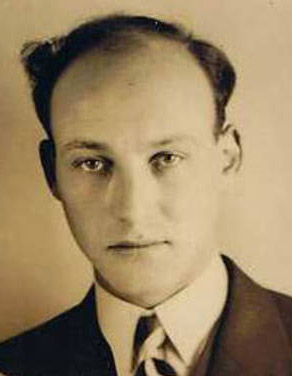
|
The Deventer Association |
7.02.1920
Emden |
Max Windmüller was born on February 7, 1920, in Emden, Germany, the son of Moritz Windmüller, a butcher and cattle dealer, and Jette Windmüller (née Seligmann), He had four siblings: Salomon (1910), Isaac (1915), Ruth (1923) and Emil (1924). He was named Max after his father's brother who had died in World War I. After the German authorities had withdrawn their father's business license, the family fled to the Netherlands in 1933. While in Groningen, Max and his brother Isaak Windmuller joined a group that organized the emigration of young people to Palestine, and Isaak became the leader of this group, while Max completed his agricultural training on a farm near Assen in preparation for emigration to Palestine. Their father died in May 1937 in Groningen. Max had planned to sail to Eretz Israel on the Dora with his brother Isaac. Already on board, he was persuaded by Ru Cohen, the organizer of the training for Palestine pioneers, to return ashore: he was to continue to help build the Hachshara, which brought young Jews from Germany and Austria to Palestine on Dutch farms. Max let himself be talked into staying in the Netherlands to help guide the Palestine pioneers. Max was interned in the Westerbork transit camp in early 1942, from where he escaped [Other sources have August 1943; He would have escaped two days later in a laundry van]. Later that year he joined the Westerweel resistance group of Joop Westerweel, which helped save almost 400 Jews. Max Windmüller was actively involved in the escape route from Holland across the Pyrenees to Spain that the Westerweel group organized for Palestine pioneers. It is believed that he helped smuggle and save about 100 young Jews, including his own brother Emil. He was betrayed and arrested by the Gestapo in Paris in July 1944. Deported to Buchenwald in August that year, he was shot by a guard during the death march to Dachau on April 21, 1945, one day before the column of prisoners were to be liberated by the US army, and two weeks before the end of the war. Sources: |
50th Anniversary
In 1989, former passengers of the Dora gathered to celebrate the 50th anniversary of their Aliyah.
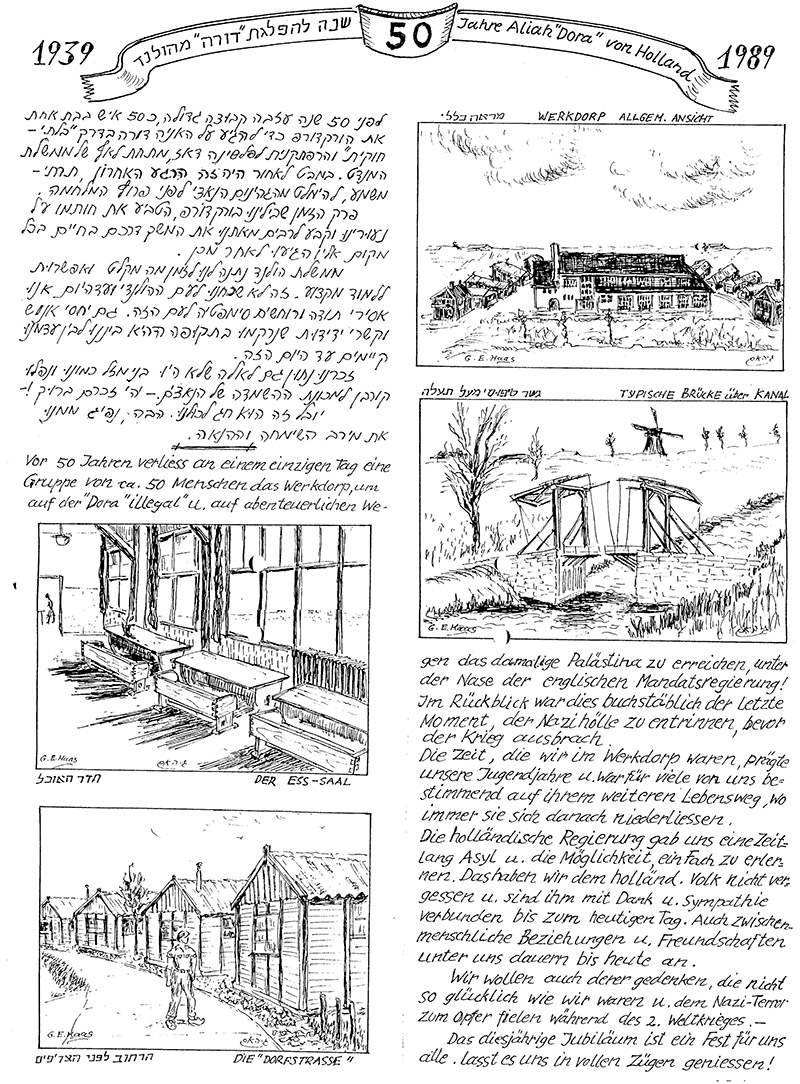
50th Anniversary of the Dora
From the collection of Amnon Rimon
50 years ago, on a single day, a group of about 50 people left the Werkdorp in order to reach what was then Palestine "illegally" and on adventurous routes on the Dora, under the nose of the English Mandate government! In retrospect, this was literally the last moment to escape Nazi hell before war broke out.
The time we were in the Werkdorp shaped our youth and was decisive for many of us on the rest of our lives, wherever they settled afterwards. The Dutch government gave us asylum for a while & the opportunity to just learn. We have not forgotten the Dutch people, and we still owe them thanks and sympathy to this day. Personal relationships and friendships among us also last to this day.
We also want to commemorate those who were not as fortunate as we were and fell victim to Nazi terror during World War II.
This year's anniversary is a celebration for all of us. Let's enjoy it to the fullest!
- Special thanks to the following researchers:
- Chaya Brasz, Former Director of the Center for Research on Dutch Jewry, Ben-Zion Dinur Institute for Research in Jewish History, for graciously allowing me to post a translation of her article on the Dora, which marked the beginning of this project.
- Contact: chayabrasz@gmail.com
- Rina Offenbach, Director BeNetivei Ha'apala, Illegal immigrant database and information center, Atlit Detention Camp, Israel, for sharing the original Amsterdam passengers lists, and for her help over the years.
- Janiv Stamberger, for sharing the Antwerp passengers list. (Source: The Foreign Police in Belgium ARA; Foreign Police files, A177.761).
- Bernd Philipsen, for the trove of contemporary press articles about the Dora, and for his never-ending help and support.
- Franz-Josef Wittstamm for providing biographical information about 40 passengers through his site: spurenimvest.de, and for his translation help. (2022)
- Knut Bergbauer, for providing information on Martin Grünpeter, Manfred Israel, Peter Kornicker (Dan Karni) and Benno Teichmann.
- Jaap W. Focke, for sharing the story of Cirl Fradel Hoffnung and Bernard Färber.
- Miriam Keesing, for sharing the story of Walter Henle, a previously undocumented passenger of the Dora, and for sharing the registers of the Lloyd Hotel which included the departure card of another undocumentated passenger, Philip Seinfeld. I am especially grateful for her transcription and translation of Eduard Leefsma's correspondance.
- Ariane Zwiers and Anton Kras from Joods Cultureel Kwartier for graciously sharing oral interviews of former passengers by Lilian Peters.
- Lilian Peters for her invaluable interviews of Dora passengers.
- Yvonne Löken, a teacher from the Hans-Carossa-Gymnasium in Landshut, Germany, for providing information on Kurt Roer as part of a student project.
- Heike Biskup from Stadtarchiv Bottrop, for sharing the story of Walter Krauthammer.
- Michael Ströder, for providing information about Max Spatz and connecting with me R.S., a volunteer from "Giving a Face to the Fallen". (December 2023. Contact: michael.stroeder [at] web.de)
- "Giving a Face to the Fallen" (latetpanim.org.il), for sharing a wealth of information on Max Spatz and Oskar (Yehoshua) Spuch; alerting me about a previoulsy unknown passenger, Heinz (Haim) Frohmann; sharing valuable information about another POW, Siegfried Elsoffer, and for constant help and support. (via R.S. December 2023-May 2024).
- Rod Miller from mappingthelives.org for answering my many queries.
- Saskia Sluiter for kindly sharing her book on Kibbutz Beverwijk, and sharing precious information about several passengers: Gerda Spitzer Cohn, Justus Hartog Cohen, Sara Dinner, and Hijman Bekker (2024).
- Jarno Maertens, Kazerne Dossin Archivist, for providing details on the fate of the Alfred Storch, Hillel Storch's son. (July 2024)
- Wilbert Korevaar, for additional information about several members of the Werkdorp. (2025)
- Barbara Sauer, historian from the University of Vienna, for information about Philip Grünberger. (2025)
- Rob Jones, from Jewish History Association of Wales/Cymdeithas Hannes Iddewig Cymru, for the photo of Heinrich Kapelner. (Dec 2025)
- Very special thanks to the following people who shared the stories of their relatives:
- Myriam Daru, for information on her relative Walter Brück (David Barkai) (2018).
- Annette Jonas Galula, for kindly sharing the transcript of her uncle Gershon (Gerhard) Jonas' memories of his passage to Palestine on the Dora (2018), and providing detailed information about his parents (2024).
- Marcelle Zion, for sharing the story of her uncle Fritz Cosmann (2020).
- Steven Kahn, for information on his first cousin once removed Siegbert Kahn (Simcha Cohen) (2019).
- Shlomit Proter, for information on Hermann (Benno) Proter (2020).
- Henny Houweling-Zwart, for information on Hertha Helena Schwarz and Schulim Friedmann (2018).
- Mimi Premo, for kindly sharing the stories of Siegfried ("Friedel") Elsoffer and Regina ("Gina") Merkel (née Milgram) (2020).
- Jon Griver, for sharing the story of his father, Norris Griver. (2021)
- Samuel Katz, for sharing the story of his mother Hannah Katz (Johanna Jacob), who most likely boarded the Dora as an orphan refugee at the age of fifteen (April 2021).
- Naomi Clayden for providing additional information about her aunt Eva Lesser. (2022)
- Noam Ben-Avram, for sharing the story of his father Bruno Abramczyk (April 2022).
- Amnon Rimon, for sharing the story of his father Shlomo (Ewald) Sondheimer and for highlighting the lifelong friendship between his father and several members of the Werkdorp Wieringermeer who came on the Dora. In addition, Rimon shared several valuable documents: the invitation to the 50th anniversary of the Dora, and the 1983 list of former chalutzim from Werkdorp Wieringermeer which includes information on several passengers of the Dora. (2022).
- Chaja Kaufmann, for sharing the story of her father, Leo Kaufmann. (2023).
- Sarah Fliehs, for sharing the richly detailed memoirs from her grandfather's brother, Haim (Heinz) Waller. (2023).
- Michael Naveh, the son of Adelheid Struck (Wangenheim), who confirmed her presence on the Dora.
- Saskia Appel, grandniece of Malka Admon, who shared information about three passengers of the Dora: Wilhelmina van Dam (Chambon) (Malka Admon), Jakob Roodveldt (Yacov Admon), and Mietje Roodveldt. (December 2023)
- Batsheva Ben-Amos, daughter of Shmuel Spiegel, who shared the story of her father and of her relatives. (January 2024)
- Ora Benami, daughter of Nirah Schnurmann (Lotte Wald), who shared her mother's extraordinary memoir, provided information on Zvi Avnon (Herbert Loewenstein), retrieved documents about the Dora and its passengers from Kibbutz Gal'ed archives, and helped me connect with descendants of passengers from Kibbutz Gal'ed. (January 2024)
- Tali Avnat, granddaughter of Robert Mainzer (Omri Mainzer) who provided additional information about his family and his life. (2024)
- Eltsafan Tovia, grandson of Issy Yitzhak Hirsch, who shared additional information about his grandfather. (2024)
- Avigdor Hirsch, son of Issy Yitzhak Hirsch, who shared additional details about his father. (2024)
- Amy Milich, niece of Moshe Milich, who provided information about her uncle and his family. (2024)
- Nancy August, for sharing information about Heinrich Kapelner and his family. (2025)
- Annath Vardi, daughter of Isaac Rooz (Yitzhak Vardi), who shared a wealth of details about her father and his family. (2025)
- Additional thanks:
- Erik Post, for translating Chaya Brasz's Dora article
- Liron Katz, for translating Hillel Yarkoni's article
- Cor Bart, for identifying the location of the youth group dancing the hora in the Assumburg Castle in Heemskerk
- Online Resources (Dora):
- www.palyam.org: Yoel Golomb's recollections
- maapilim.org.il: Yekutiel Fekete's reminiscences on the 50th anniversary of the Dora
- The Dora - The story of the illegal immigrant ship.(Hebrew) Sfinot maapilim me'alef ad tav. Tel Aviv, 2005.
- www.ioh.co.il: De reis met de Dora, een wrakke schuit met slavenruimen (Dutch). Abridged version of Chaya Brasz' "Dodenschip Dora" article.
- maapilim.org.il : Story of the Dora (Hebrew)
- maapilim.org.il: Story of the Dora by Raphael Kochavi (Hebrew)
- maapilim.org.il: Partial list of Dora passengers (Hebrew)
- www.palyam.org: Ha'Mossad Le'Aliyah Bet
- www.wertheimer.info: Wertheimer Ha'apala Project
- paulsilverstone.com: Aliyah Bet Project
- www.turkusteamers.com: Purchase of the Dora
- info.palmach.org.il: Fate of Tzvi Spector and Amiram Shochat
- Online Resources (Hachsharot and Jewish Organizations):
- hachschara.juedische-geschichte-online.net: Grüsen Hachshara (Kibbutz Hagschama)
- de.wikipedia.org (List of German Hachsharot)
- digipres.cjh.org (List of members of Jewish training centers in Germany)
- freienstein-pommern.de (Training centers on August 1, 1938, from Almanac of Schocken Verlag 5699 - 1938/39)
- www.werkdorpwieringermeer.nl: Jewish Werkdorp Nieuwe Sluis
- oorlogsdodendinkelland.nl: Palestine-pioneers in the municipality of Weerselo
- oorlogsdodendinkelland.nl: Palestine pioneers in the municipality of Weerselo (PDF)
- de.wikipedia.org (Halbe Hachshara
- "Be Strong and Brave! A small youth movement in a sea of history. The Hashomer Hatzair Antwerp (1920-1948)". . Master thesis History Department University of Ghent 2012-2013. ( PDF )
- Offline References:
- Dodenschip Dora; Een oude kolenboot redde honderden Joden ondanks Nederlandse tegenwerking. , Vrij Nederland, May 1, 1993.
- Ha'apala - Clandestine Immigration, 1931-1948. , Ministry of Defence Publishing House and IDF Museum. English edition: 1987.
- The Gate Breakers. , Herzl Press/Sharon Books/Thomas Yoseloff, 1963.
- Het Joodse werkdorp in de Wieringermeer 1934-1941. , De Walburg Pers, 1983.
- Machseh Lajesoumim; A Jewish Orphanage in the City of Leiden 1890-1943 (pages 221-222). library.oapen.org, www.aup.nl , Amsterdam University Press, 2021.
- The Ambiguity of Virtue: Gertrude van Tijn and the fate of the Dutch Jews. , Harvard University Press, 2014.
- "From Lioness: Golda Meir and the Nation of Israel". , Schocken, 2017.
- "Berlin - Palästina und zurück. Erinnerungen". , Dietz Verlag Berlin, 1989.
- "Generation Exodus: The Fate of Young Jewish Refugees from Nazi Germany". , Brandeis University Press, 2001.
(c) All rights reserved.
I do my best to contact descendants and relatives of people mentioned on this page, but don't always succeed. If you come across any content on this page that you want removed or made private, please contact me, and I will remove the content immediately.
Please contact me if you have any more information to contribute to this page. I am particularly interested in hearing from descendants of passengers, organizers or crew members of the Dora.
Please contact me if you want to use content from this page. I am always happy to share my work but ask you contact me first and credit the source.
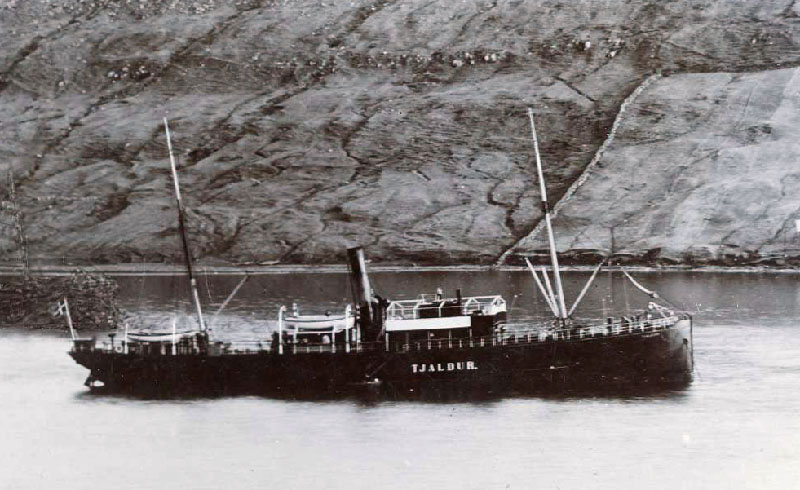
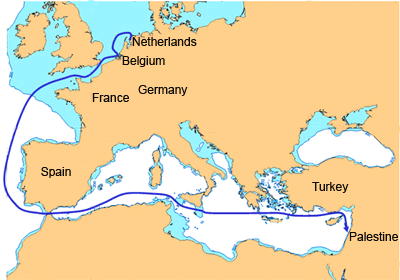
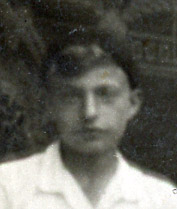
My mother had been offered a place on a ship after her parents had been expelled to Poland (this could have been as early as December 1938), but there had been multiple, seemingly endless, delays. She went into hiding with friends and neighbors for three to four months, waiting for a departure date. At last, she received the signal to leave and headed for Belgium. Being "stateless", she could not get a visa, and could only cross borders illegally. I used to picture her walking through the border at night with the help of a guide, but she most likely went not alone but with a group of chalutzim. Another Dora passenger, Charlotte Staendig (later Yael Neuhaus), described how she came to Belgium. From the Urfeld Hachshara, in a village located about 50 kms (30 miles) from the Belgian border, she was taken along with a group of about ten people in a tarpaulin-covered truck to Antwerp. She noted that "the road to the Belgian port was smooth, oiled with bribes." I assume that my mother's path followed a similar route. She then spent one month in Belgium waiting for the Dora to arrive.